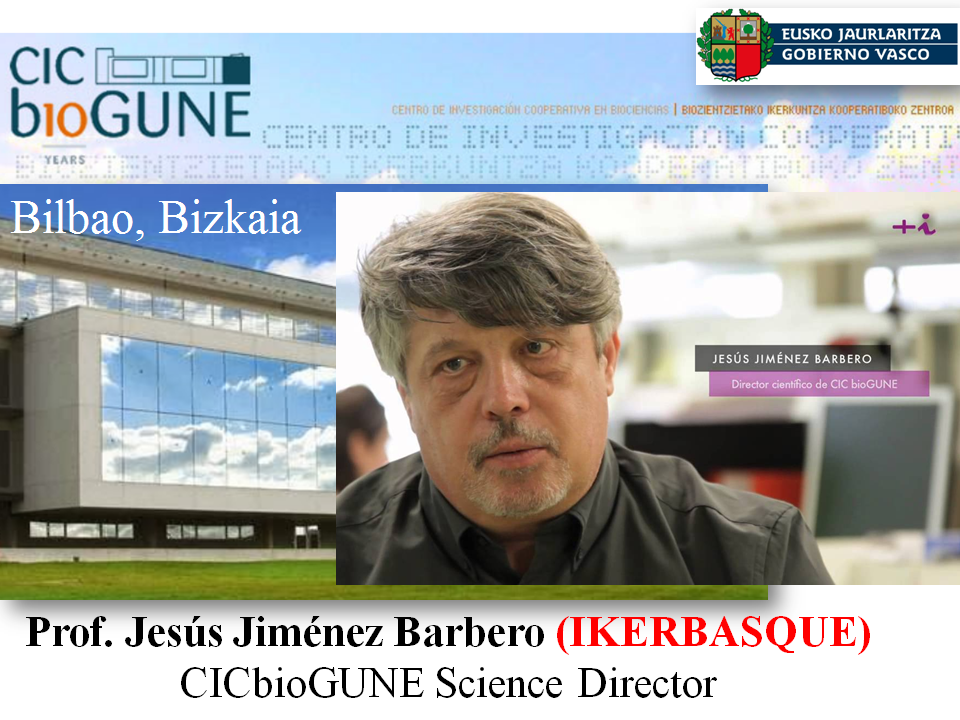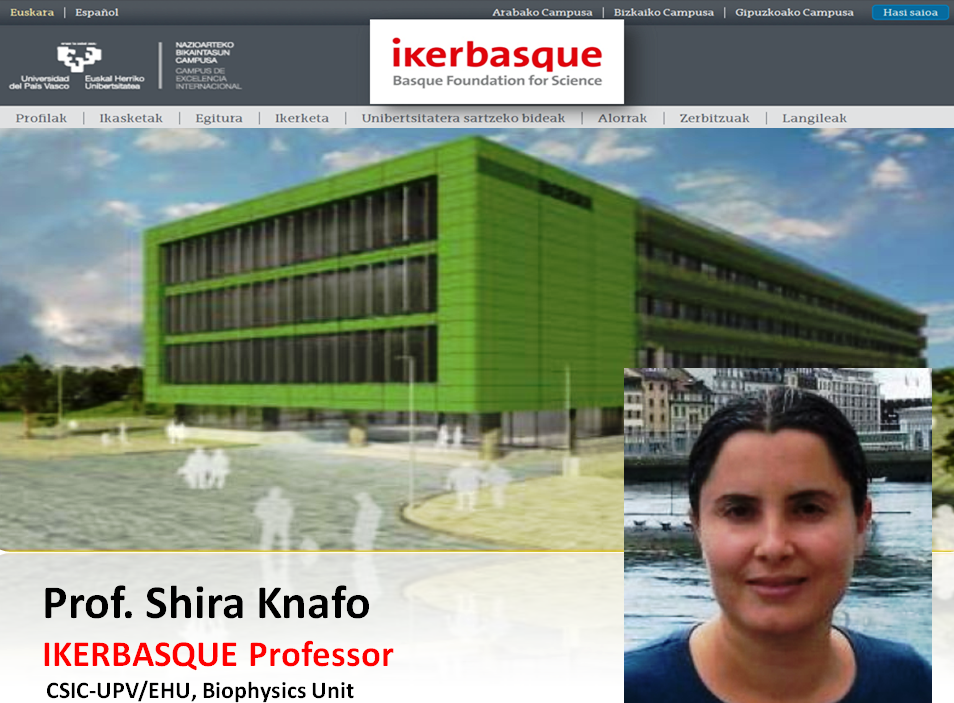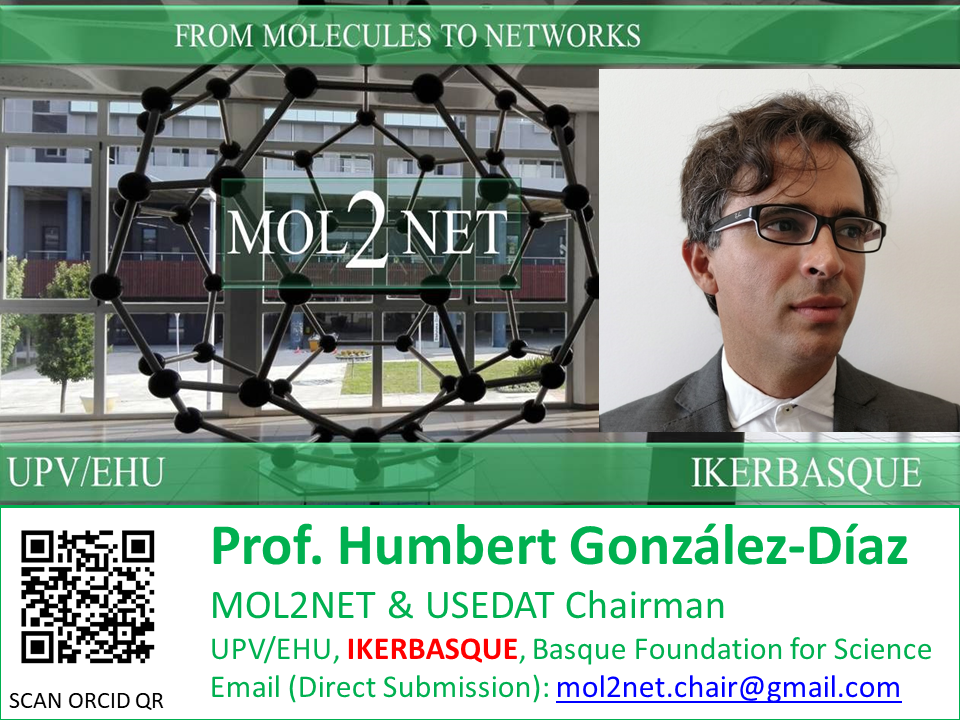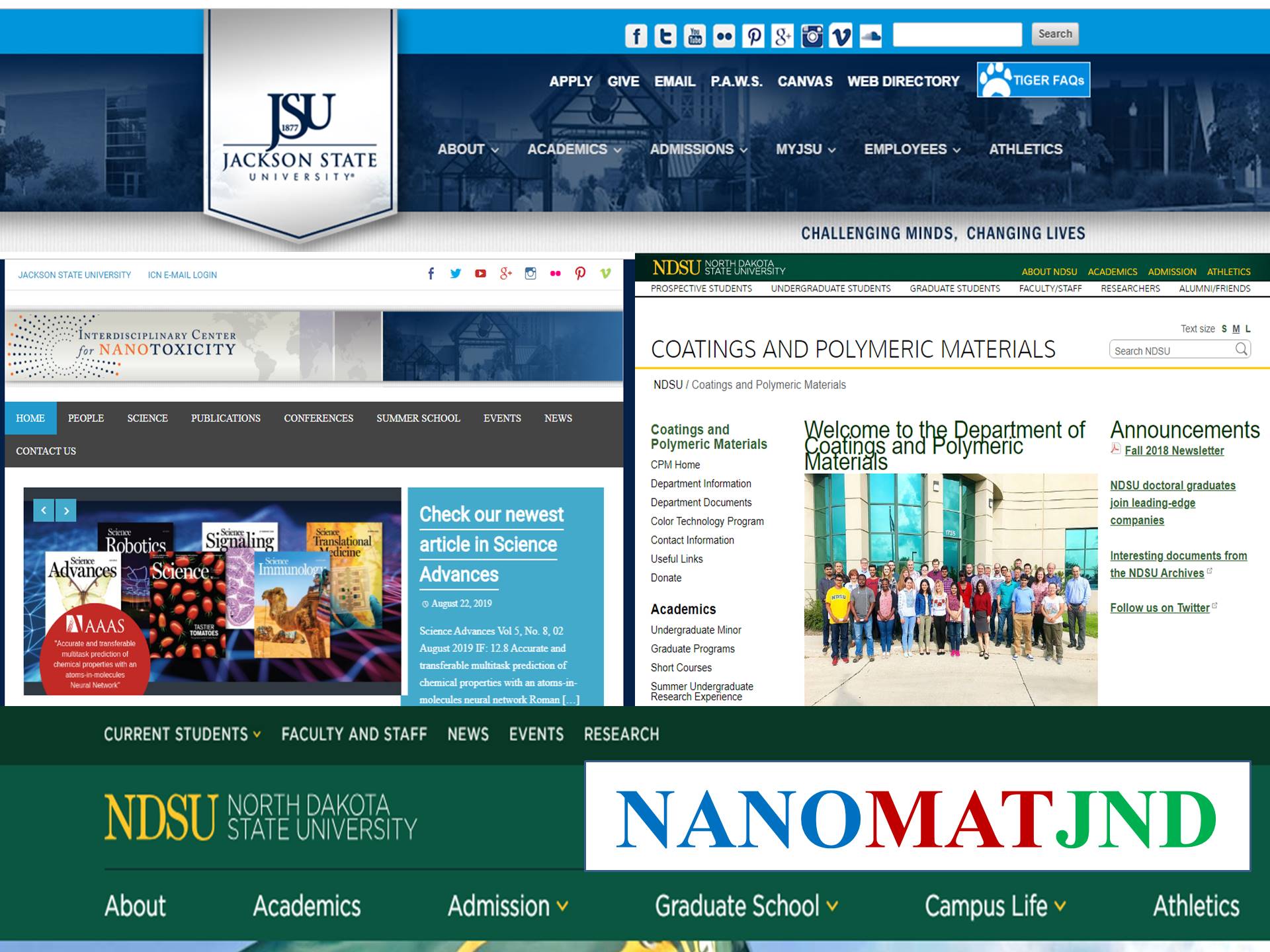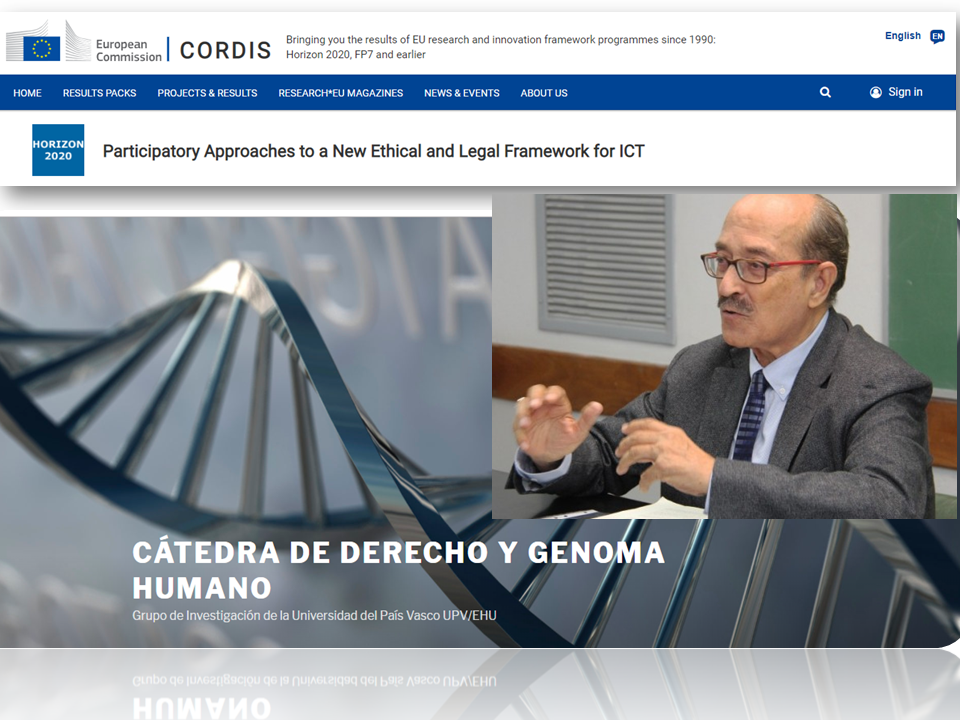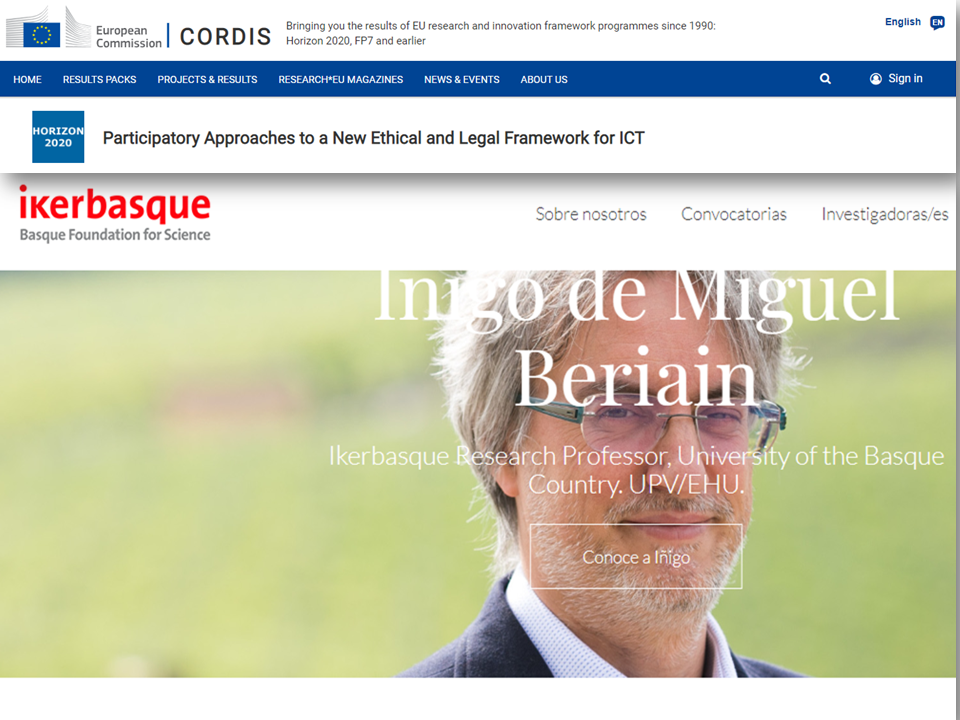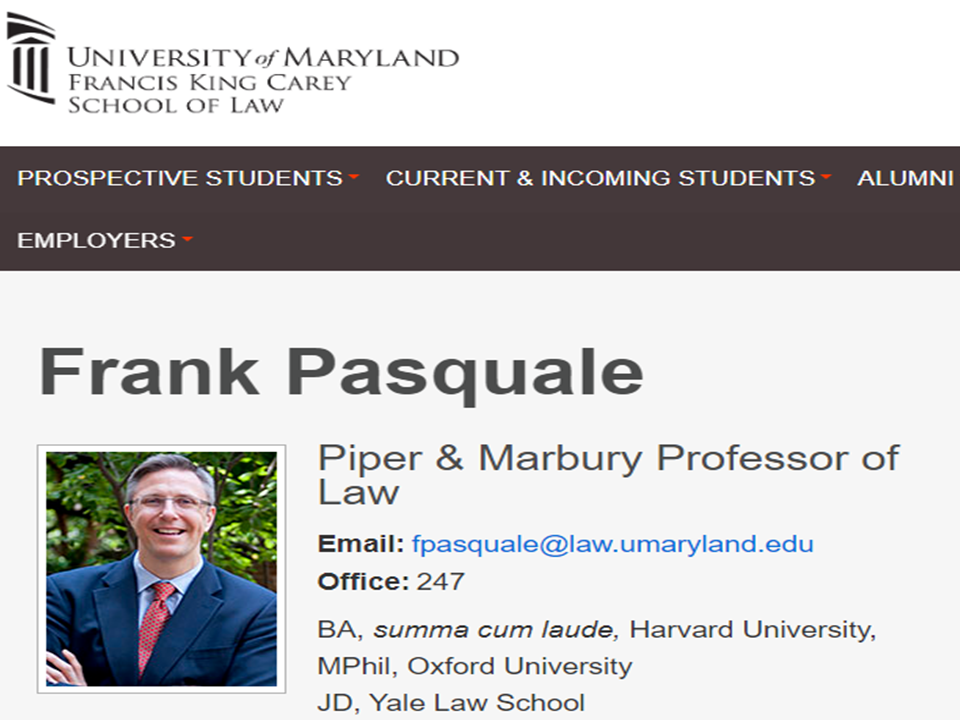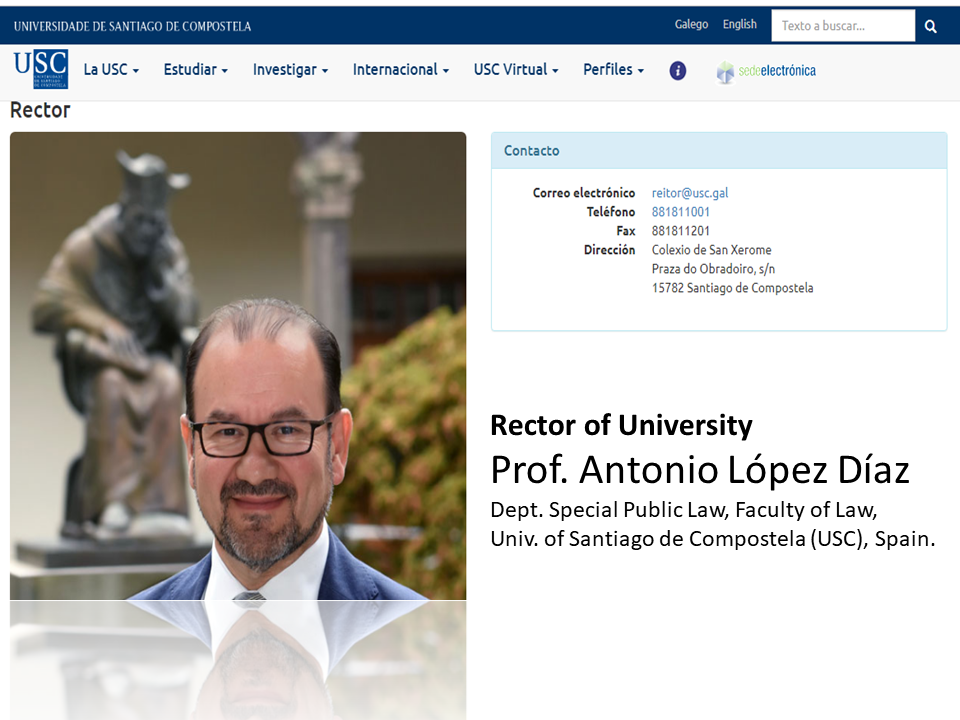
MOL2NET'19, Conference on Molecular, Biomed., Comput. & Network Science and Engineering, 5th ed.
MOL2NET: FROM MOLECULES TO NETWORKS
20 March–20 December 2019
Medicinal Chemistry, Pharmaceutical Sciences, Nanotechnology, Materials Science, Complex Networks, artificial intelligence, Bioinformatics, Cheminformatics, Biomedical Sciences
- Go to the MOL2NET'19 CONGRESSES
-
- 01. USEDAT-05: USA-Europe Data Analysis Training Bilbao, Spain-Cambridge, UK-Miami, USA, 2019
- 02. USINEWS-03: US-IN-EU Worldwide Science Workshop Series, UMN, Duluth, USA, 2019
- 03. NICEXSM-05: North-Ibero-American Congress on Exp. and Simul. Methods, Valencia, Bilbao, Spain-Miami, USA, 2019
- 04. ICWM-01: I International Conference and Workshop: Microbiota, UDC, Coruña, Spain, 2019
- 05. CHEMBIOINFO-05: Chem-Bioinformatics Congress München, Germany-Chapell Hill, USA, 2019
- 06. NANOMATJND-05: JSU-NDSU Nanotech. & Materials Science Workshop, Jackson & Fargo, USA, 2019
- 07. CHEMBIOMOL-05: Chem. Biol. & Med. Chem. Workshop, Bilbao-Lisboa, Portugal-Rostock, Germany, Galveston, Texas, USA, 2019
- 08. MODEC-04: Nat. Prod. & Agro-Indust. Proc. in Amazon, UEA, Puyo, Ecuador, 2019
- 09. TECHLAWSCI-03: PANELFIT & NKL H2020 Tech. Law. & Sci. Challenges, Bilbao, Spain, Halden, Norway, Baltimore, USA, 2021
- 10. UDLABIOTECH-01: I International Biotechnology Congress, UDLA, Quito, Ecuador, 2019
- 11. not used 01
- 12. not used 02
- 13. not used 03
- Event Details
Welcome from the Chair

[MOL2NET 2015] [MOL2NET 2016] [MOL2NET 2017] [MOL2NET2018] [MOL2NET FACEBOOK (>10K followers)]
[USEDAT Facebook][Welcome Videos] [官话] [हिन्दी] [Euskera] [Castellano] [Português] [Français]
USEDAT: USA-Europe Data Analysis Training Program (2019 ed.)
Experimental Data Recording, Computational Data Analysis, Hands-on Training Courses
PhD, MSc, Degree Thesis Tutorship; MSCA Secondments; Summer Internships
USA & Europe Schools, Conferences, Workshops, Enrollment Free of Charge in almost all courses
Welcome From Chairs
Headquarters and Supporters
MOL2NET runs both online and/or in person workshops in host universities worldwide and at the SciForum platform maintained by the editorial MDPI, Basel, Switzerland. The Scientific Headquarters (HQs) of this conference series are in the Faculty of Science and Technology, University of Basque Country (UPV/EHU), Biscay. However, the idea of this multidisciplinary conference emerged from the melting pot formed as the result of multiple collaborations of professors from many centers worldwide. Locally, the founders and strongest supporters of the conference are professors endowed by IKERBASQUE, Basque Foundation for Sciences, professors from the two departments Department of Organic Chemistry I and Department of Organic Chemistry II of the University of Basque Country (UPV/EHU), and professors from the Department of Computer Sciences of the University of Coruña (UDC).
Internationally, professors from Dept of Biological Chemistry & Molecular Pharmacology (BCMP), Harvard Medical School, USA; the Center for the Study of Biological Complexity of the Virginia Commonwealth University (VCU), USA; the Natural Resources Research Institute, of the University of Minnesota, USA; CNRS-Université Paris-Sud, Paris, France, and other institutions are also founders and/or supporters of this conference, please see full committees lists [Honor Committee] [Co-Chairs Committee] [Scientific Committee (Abroad)] [Scientific Committee (Local)] and [MOL2NET-IKERBASQUE Staff].
Conference Lemma
The acronym MOL2NET summarizes the running title of this conference: FROM MOLECULES TO NETWORKS. This lemma is inspired by the possibility of spreading the knowledge about multiple topics by promoting multidisciplinary collaborations in science with conferences including topics ranging from quantum world to large social networks. In this sense, the spirit of this conference is in consonance with the lemma EMAN TA ZABAL ZAZU (Give and extend knowledge). This anthem from the 19th century is written in Basque language (Euskera) and is used now a days as the official motto of the University of Basque Country (UPV/EHU).
USEDAT Summer School
Contents Veracity & Authors Liability
MOL2NET conference is an online platform for early publication of preliminary results. In this sense, most of MOL2NET workshops do not preform peer-review of materials to be published by external referees. Consequently, the modality of publication is ore similar to a pre-print server where authors can post early versions of their results to obtain feedback from the community. In addition, authors can upload also short communications with post-publication discussion of results already published in other media. In all cases, the authors are personally responsible, to perform a similarity checking , ensure veracity of contents, and carry out a proper citation of previous works.
In concordance, the members of MOL2NET committee are not responsible of aspects like veracity, similarity, copyright, etc. in this publishing modality. Consequently, the opinions expressed on the communications are not necessarily coincident to the opinions of the members of the committees. In this sense, we strongly recommend the authors to use online text-similarity checking services, such as Turnitin, etc., if possible. These tools may help authors to avoid any form of plagiarism or copyright violation. The authors may be requested to modify the communication (re-write their texts) previous or posterior to publication in the case that high similarity, veracity, or other problems are detected and reported to the committee. In these cases, the manuscript could be put on standby or withdrawn temporarily until the authors re-submit the proper version. The authors are also allowed to submit short reviews, comments, letters, or discussions of papers already published if they guarantee sufficient difference to previous public contents.
Sessions & Workshops
You can participate both online or in person (face-to-face) in some of the workshops we organize in different universities worldwide (see sessions in the conference menu). Publication of all communications of the workshops will be online via the platform SciForum. We welcome proposals for organization of workshops in different universities. Please, do not hesitate to contact conference chairperson and/or scientific committee presidents. See also a list of workshops running this year.
04. ICWM-01: I International Conference and Workshop: Microbiota, UDC, Coruña, Spain, 2019
MOL2NET Steps for Participation
(0) Register, Sign in/Login, to Sciforum platform [Sciforum login]
(1) Submit the title and abstract, select a section or workshop (do not upload paper here) [Submit New Abstract]
(2) Wait for Sciforum abstract acceptance email, follow the link, and/or login to upload paper, doc and pdf format
(3) Download template doc to prepare your communication, for general sessions: [MOL2NET 2019 Template.doc] , or use the
for other workshops: [BioChemPhys Template], [WRSAMC template] , [MODEC 2019 Template.doc], [AWP-04 Template]
(4) Wait for paper acceptance and publication emails (follow link to proofread your paper) (Asap after upload)
(5) Communicate with chairpersons if corrections are necessary, including past editions (All the year)
(6) Log in to post comments, questions, or answers in a section or one of the workshops
(7) Contact chairpersons if you need attendance certificate for conference and/or workshops (All the year).
Conference, School, and Workshops Schedule
General Schedule: MOL2NET International Conference Series on Multidisciplinary Sciences, MDPI Sciforum, Basel, Switzerland has online and/or in person workshops (>10) associated. The conference usually runs online at the online platform SciForum maintained by the editorial MDPI, Basel, Switzerland. The platform is open on a year-round basis almost all the days of the year in course. We have this modality for practical reasons; e.g., accommodation of many workshops in different dates along the year, flexible reception of communications, etc.
Submission and Publication of communications: As we mentioned before, in the practice, the online platform is open at the beginning of the year in course and continue open all the year for submissions of communications. However, the associated workshops may open in different dates along the year (see specific workshop pages). Submission of papers to all workshops is open until the last days of the year in course or the first days of the following. The publication of communications is continuous all the year upon acceptance.
Schedule for for MOL2NET Workshops Online participation: You can participate online in all MOL2NET workshops all the year uploading your communication directly by Sciforum platform. In addition, after publication of papers is closed we open the online platform for online participation. The authors will be able to post online comments and/or answers to comments in this workshop/section and also in the other general sections and/or >10 international workshops of the MOL2NET conference (many of them also run both online and in person). The participants are entitled to receive participation certificates for MOL2NET conference and all the workshops they participate upon request to the respective chairpersons. See committees of MOL2NET and each workshop.
Schedule for MOL2NET Workshops in Person Participation: Many of the workshops associated to MOL2NET are going to be held also in person (face-to-face) in different universities of USA, Spain, Italy, Mexico, Chile, etc. This in person workshops have specific schedules in parallel to their online versions. Please, go to the homepages of these workshops and/or contact their chairpersons for further details.
Schedule for USEDAT Summer School participation: The schedule of the different USEDAT courses varies in different universities along the year, even when many of them are in summer season, some of them run all the year. If you are interested to enroll in one of the courses do not hesitate to contact directly USEDAT coordinator at: usedat.chair@gmail.com
Note for participants: MOL2NET conference runs both online (general sections) and/or in person (associated workshops). No physical presence is needed for online participation saving traveling costs. We accept experimental works, theoretical works, or experimental-theoretic works in the areas mentioned. Proceedings will be Published Online, Open Access, and Totally Free of Charges (no cost). For details about in person (face-to-face) participation on associated workshops contact the respective members of the local committees. USEDAT School workshop also runs online however must of the hand-on training courses run in person.
Types of Communications
Before to submit your communication recommend to download and use the [Template File] to write your communication; we strongly recommend you to read carefully the following information about publication model, copyright, authors responsibilities, etcFirstly, be aware that the works published here belongs to two main modalities preliminary communications or comments on previous works.
Research Preprints. These are short communications of unpublished results but they are not post-print journal papers. In this sense, committee and/or external reviewers check only scope and apparent scientific soundness. They have the same editorial process than for an online Preprint service. Therefore, all works receive doi number and are indexed in databases (GoogleScholar, Publons, etc.).The works may receive also comments from registered participants (public post-publication review). The authors are encouraged to submit their works to a peer-reviewed scientific journals of MDPI or other editorials during or after finalization of the conference, as per SciForum copyright rules.
Research Highlights. These short communications are comments on already published papers. They are short notes to comment about the more interesting points, highlights, etc. of works previously published by the authors or other groups. In this case, committee and/or external reviewers check also only scope and apparent scientific soundness. The works may receive also comments from registered participants (public post-publication review).
Authors Liability
In all cases, it is responsibility of authors, to perform a similarity checking , ensure veracity of contents, and carry out a proper citation of previous works. The committee is not responsible of the previous aspects in this publishing modality. Consequently, the opinions expressed on the communications are not necessarily coincident to the opinions of the members of the committees. In this sense, we strongly recommend the authors to use online text-similarity checking services, such as Turnitin, etc., if possible. These tools may help authors to avoid any form of plagiarism or copyright violation. The authors may be requested to modify the communication (re-write their texts) in the case that high similarity is detected and reported to the committee. In these cases, the manuscript could be put on standby or withdrawn temporarily until the authors re-submit the proper version. The authors are also allowed to submit short reviews, comments, letters, or discussions of papers already published if they guarantee sufficient difference to previous public contents.
Call for Collaborators, Editors, Chairpersons, and Sponsors
We welcome indirect nominations and/or personal applications for a position in some of the following modalities, or other modalities of collaboration: (1) Committee membership (nomination or personal application for membership in honor, steering, or scientific committees). (2) Guest-Editor of JCR MDPI journal issue (help to propose, editing, announce your special issue in one of the MDPI journals). (3) Chairperson of workshop (publishing an online or in person workshop of your institution with you as chairperson). (4) Sponsor of conference (including logo, description, flyer, and link to homepage of your institution). (5) Speaker (publication of video conferences with cover poster, issn, isbn, and doi number). We sincerely invite you to join MOL2NET Conference Series or one of the worldwide associated workshops; please, sent a direct email to the chairperson.
 https://orcid.org/0000-0002-9392-2797, Email: mol2net.chair@gmail.com
https://orcid.org/0000-0002-9392-2797, Email: mol2net.chair@gmail.com(1) Dept. of Organic Chemistry II, University of the Basque Country UPV/EHU , 48940, Leioa, Biscay, Spain.
(2) IKERBASQUE, Basque Foundation for Science , 48011, Bilbao, Biscay, Spain.
MOL2NET'19 CONGRESSES
02. USINEWS-03: US-IN-EU Worldwide Science Workshop Series, UMN, Duluth, USA, 2019
03. NICEXSM-05: North-Ibero-American Congress on Exp. and Simul. Methods, Valencia, Bilbao, Spain-Miami, USA, 2019
04. ICWM-01: I International Conference and Workshop: Microbiota, UDC, Coruña, Spain, 2019
05. CHEMBIOINFO-05: Chem-Bioinformatics Congress München, Germany-Chapell Hill, USA, 2019
06. NANOMATJND-05: JSU-NDSU Nanotech. & Materials Science Workshop, Jackson & Fargo, USA, 2019
07. CHEMBIOMOL-05: Chem. Biol. & Med. Chem. Workshop, Bilbao-Lisboa, Portugal-Rostock, Germany, Galveston, Texas, USA, 2019
08. MODEC-04: Nat. Prod. & Agro-Indust. Proc. in Amazon, UEA, Puyo, Ecuador, 2019
09. TECHLAWSCI-03: PANELFIT & NKL H2020 Tech. Law. & Sci. Challenges, Bilbao, Spain, Halden, Norway, Baltimore, USA, 2021
10. UDLABIOTECH-01: I International Biotechnology Congress, UDLA, Quito, Ecuador, 2019
11. not used 01
12. not used 02
13. not used 03
MOL2NET - MDPI Journals Issues


02. Biomolecules (Call For Papers): Special Issue: Big Data Analysis in Biomolecular Research, Bioinformatics, and Systems Biology with Complex Networks and Multi-Label Machine Learning Models. Journal: Biomolecules (ISSN 2218-273X). JCR IF = 4.694. Section: Bioinformatics and Systems Biology. Topics: Cheminformatics; Bioinformatics; Machine Learning; Complex Networks; Drug Discovery, Databases, Big Data, Systems Biology. Guest Editor: Prof. Humbert González-Díaz, Email: mol2net.chair@gmail.com, Department of Organic Chemistry II, University of the Basque Country (UPV/EHU) and Ikerbasque - Basque Foundation for Science, 48011 Bilbao, Biscay, Spain. Submissions until: 31 July 2020.


08. Nanomaterials (Published):Special Issue: Experimental Nanosciences, Computational Chemistry, and Data Analysis. Journal Nanomaterials (ISSN 2079-4991), JCR IF = 3.55. Editors: Prof. Humbert González-Díaz, UPV/EHU, Basque Country, Spain, Prof. Dr. H. Kušić, UZ, Croatia, Prof. B. Rasulev , NDSU, USA, Dr. Shameer Khader, Philips, Cambridge, MA, USA.
11. Molecules (Call For Papers): Special Issue: Computational Methods for Drug Discovery and Design. Journal: Molecules (ISSN 1420-3049), JCR IF = 3.098. Last Date: 2019-Dec-30. Topics: molecular modeling; molecular simulations; computational biochemistry; computer-aided drug design; protein kinase inhibitors. Editor: Prof. Julio Caballero, Email: jcaballero@utalca.cl, Centro de Bioinformática y Simulación Molecular (CBSM), Facultad de Ingeniería, Universidad de Talca, Casilla 747, Talca 3460000, Chile.
13. Molecules (Published): Special Issue: GPCR Mechanism and Drug Design. Journal: Molecules (ISSN 1420-3049), JCR IF = 3.06. Last Date: 2019-Nov-30. Topics: data science; drug design and discovery; computational chemistry; structural biology; molecular modeling; molecular docking; computational mutagenesis; G-protein-coupled receptors; protein–protein interactions; protein–ligand interactions. Workshop Associated: EJIBCE, Encontro de Jovens Investigadores de Biologia Computacional e Estrutural, Portugal, 2018. Editor: Dr. Irina Moreira, Email: irina.moreira@cnc.uc.pt, Center for Neuroscience and Cell Biology (CNC), University of Coimbra (UC), Portugal.


19. Applied Sciences (Published): Special issue entitled: Applied Artificial Neural Networks. Journal Applied Sciences (ISSN 2076-3417), JCR IF = 2.217. Topics: Evolutionary Computation; Artificial Neural Networks; Artificial Intelligence; Feature Selection; Machine Learning. Editor: Prof. Marcos Gestal. Email: marcos.gestal@udc.es, Computation Sciences and Information Technologies Department, Faculty of Computer Science, University of A Coruña, 15071, A Coruña, Spain.
Int. J. Mol. Sci. 2019, 20(17), 4191; https://doi.org/10.3390/ijms20174191 - 27 Aug 2019
Int. J. Mol. Sci. 2019, 20(18), 4362; https://doi.org/10.3390/ijms20184362 - 05 Sep 2019
Int. J. Mol. Sci. 2019, 20(21), 5389; https://doi.org/10.3390/ijms20215389 - 29 Oct 2019
Biomolecules 2019, 9(12), 778; https://doi.org/10.3390/biom9120778 - 25 Nov 2019.
MOL2NET Honor & Sci. Committee
MOL2NET Chairman & Honor Advisory Committee
*Note: This committee is for MOL2NET Conference Series, to see the committees of each specific workshops associated to the conference visit the page of this workshop.
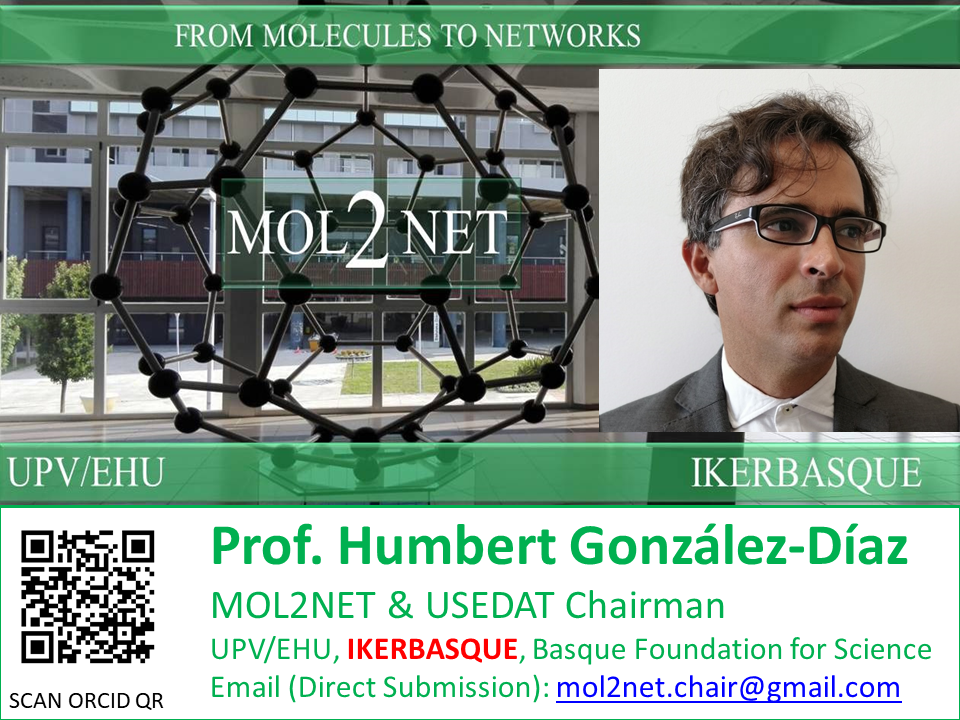 Prof. Humbert González-Díaz, IKERBASQUE Professor, Email: mol2net.chair@gmail.com
Prof. Humbert González-Díaz, IKERBASQUE Professor, Email: mol2net.chair@gmail.com
(1) Dept. of Organic Chemistry II, University of the Basque Country UPV/EHU , 48940, Leioa, Biscay, Spain.
(2) IKERBASQUE, Basque Foundation for Science , 48011, Bilbao, Biscay, Spain.
ORCID: https://orcid.org/0000-0002-9392-2797
Honor Advisory Committee
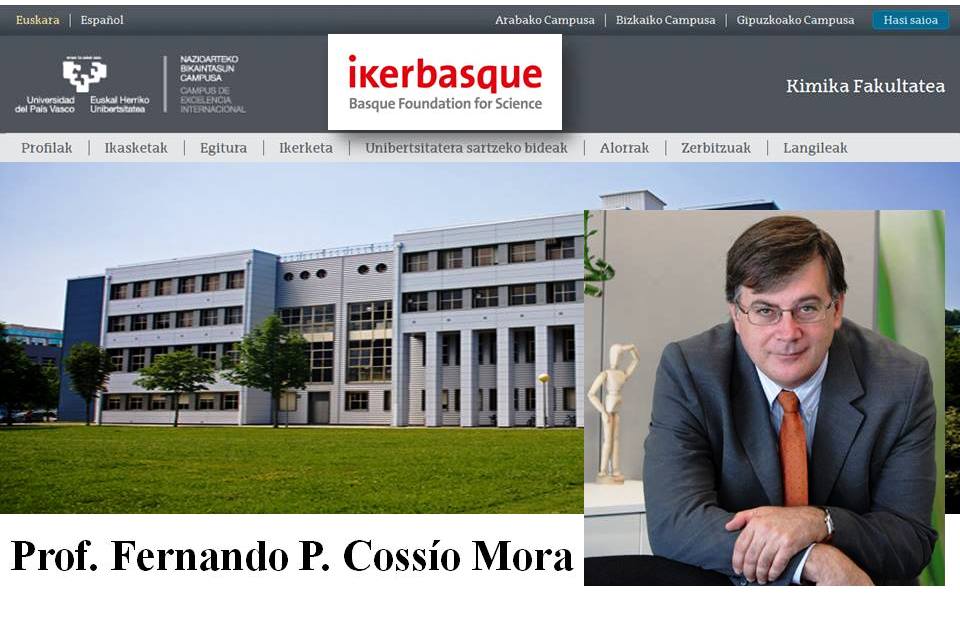 Prof. Fernando P. Cossío, (IKERBASQUE Foundation President), Prof. Dept. of Organic Chemistry I,
Prof. Fernando P. Cossío, (IKERBASQUE Foundation President), Prof. Dept. of Organic Chemistry I,
University of Basque Country (UPV/EHU), Donostia - San Sebastián Campus, Gipuzkoa.
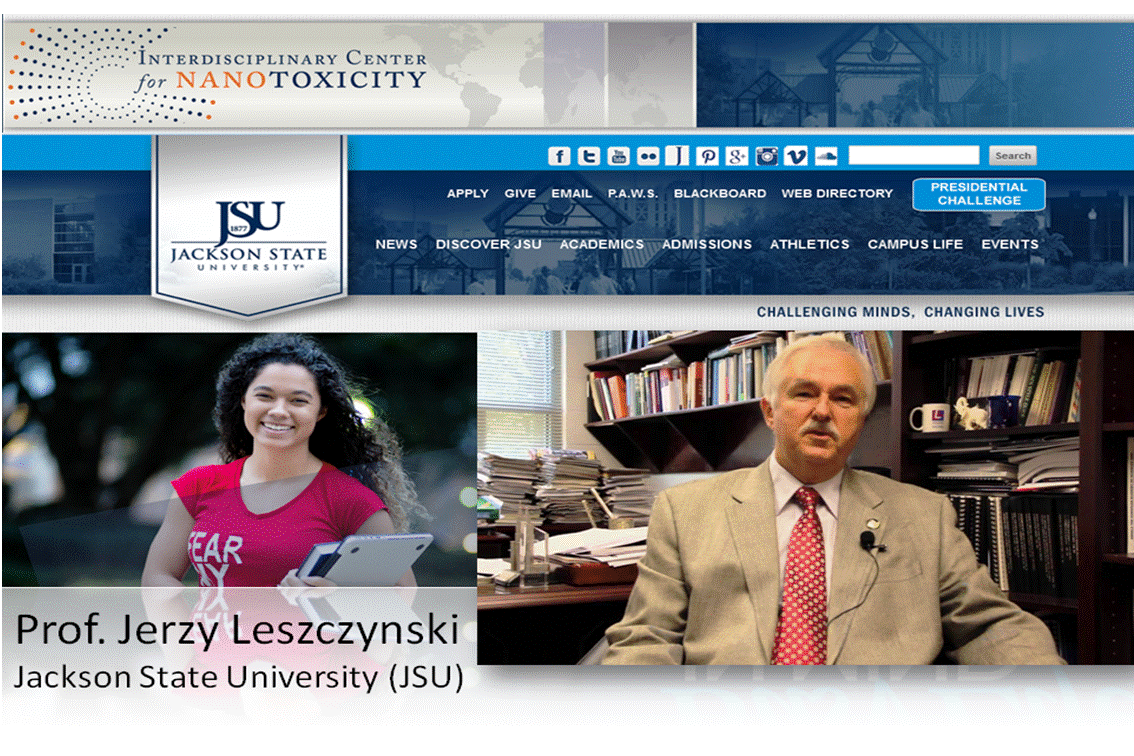
Prof. Jerzy Leszczynski, USA Presidential Distinguished Fellow, Dept. of Chemistry and Biochemistry Interdisciplinary Center for Nanotoxicity (ICN), Jackson State University (JSU), USA.
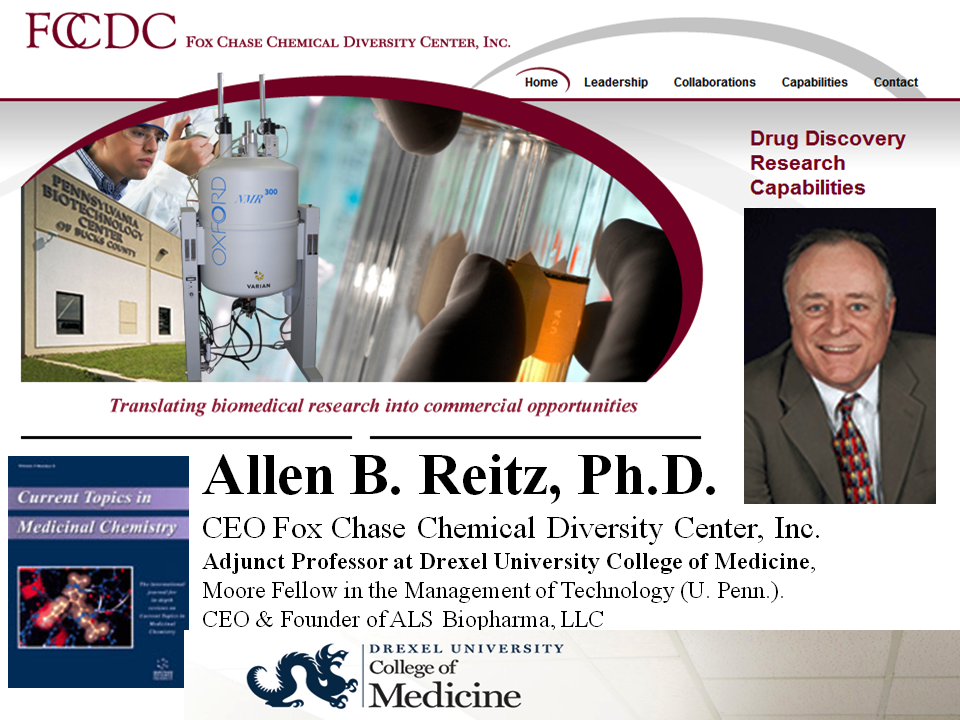
Dr. Allen B. Reitz, Ph.D., CEO Fox Chase Chemical Diversity Center, Inc., Doylestown, PA, USA. Moore Fellow in the Management of Technology, University of Pennsylvania (Penn Engineering), Adjunct Professor at Drexel University College of Medicine, Founder CEO of ALS Biopharma, LLC. Editor-in-Chief of Curr Top Medicinal Chemistry
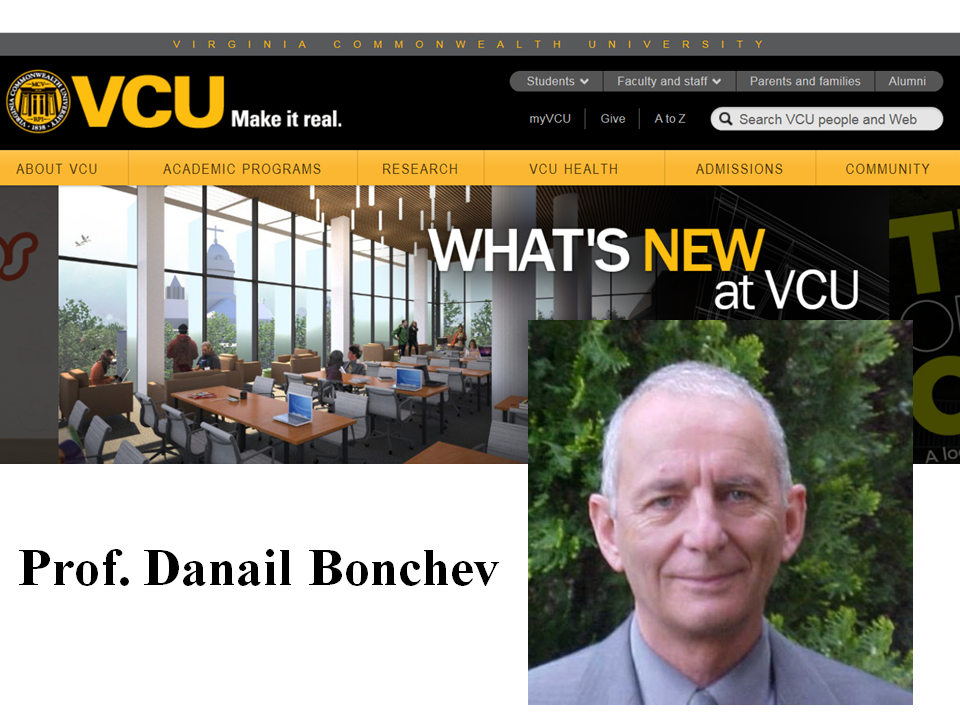 Prof. Danail Bonchev, Director of Research on Bioinformatics, Center for the Study of Biological Complexity. Prof., Dept of Mathematics & Applied Mathematics, Virginia Commonwealth University (VCU), USA.
Prof. Danail Bonchev, Director of Research on Bioinformatics, Center for the Study of Biological Complexity. Prof., Dept of Mathematics & Applied Mathematics, Virginia Commonwealth University (VCU), USA.
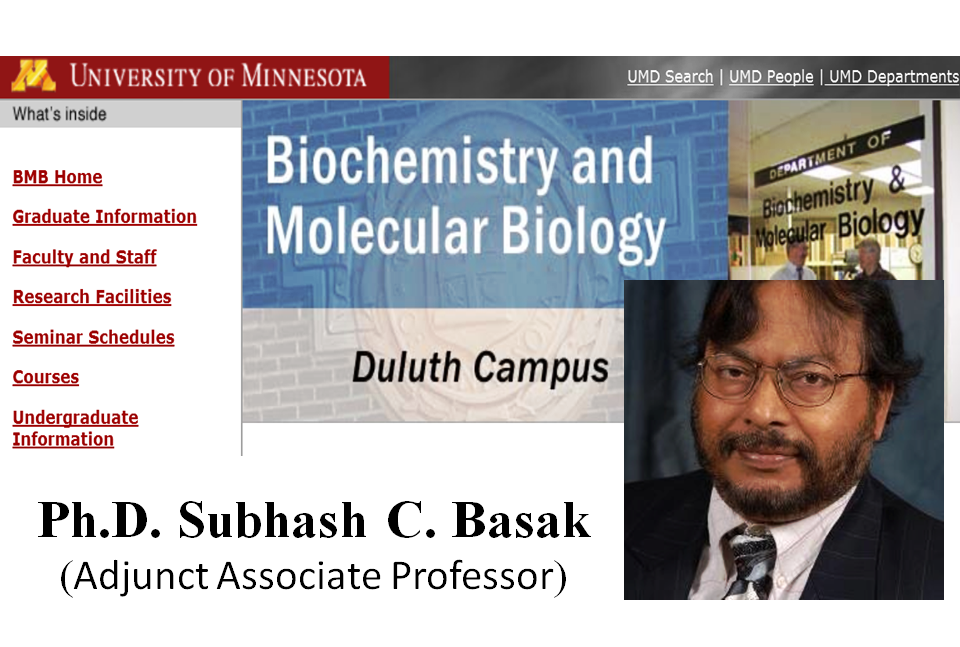
Dr. Subhash C. Basak, (1) Ph.D. Senior Scientist at Natural Resources Research Institute, Center for Water and the Environment (CWE), Duluth, MN, USA. (2) Adjunct Associate Professor, Department of Chemistry, University of Minnesota Twin Cities, MN, USA.
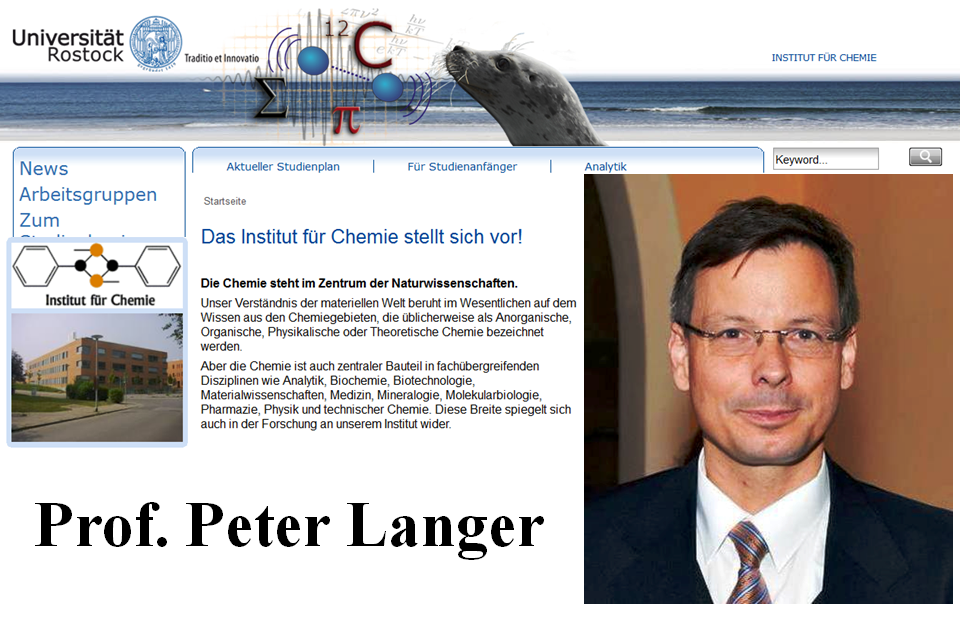
Prof. Dr. Peter Langer, Full Professor (C4) of Organic Chemistry, Vice Director Institute of Chemistry, University of Rostock, Head of the Department of Organic Chemistry. Universität Rostock Institut für Chemie Abteilung für Organische Chemie Albert-Einstein-Straße 3a 18059 Rostock.
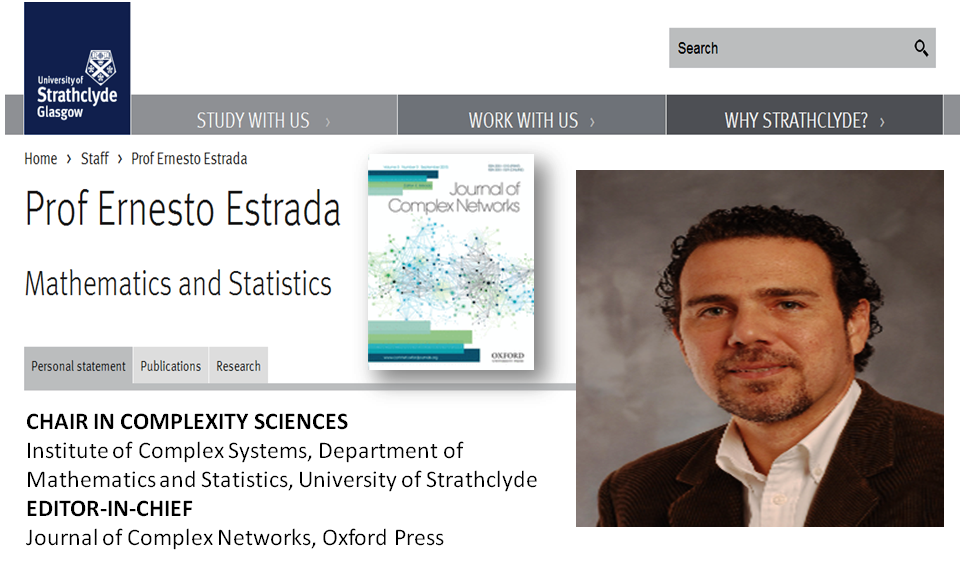
Prof. Ernesto Estrada Roger, Department of Mathematics and Statistics, Chair in Complexity Sciences, Institute of Complexity Systems, University of Strathclyde Glasgow, G1 1XQ, UK. Editor-in-Chief of Journal of Complex Networks, Oxford Academic Press.
 Prof. María Isabel Loza, Vice-Director CiMUS, Department of Pharmacology, University of Santiago de Compostela USC, Spain.
Prof. María Isabel Loza, Vice-Director CiMUS, Department of Pharmacology, University of Santiago de Compostela USC, Spain.
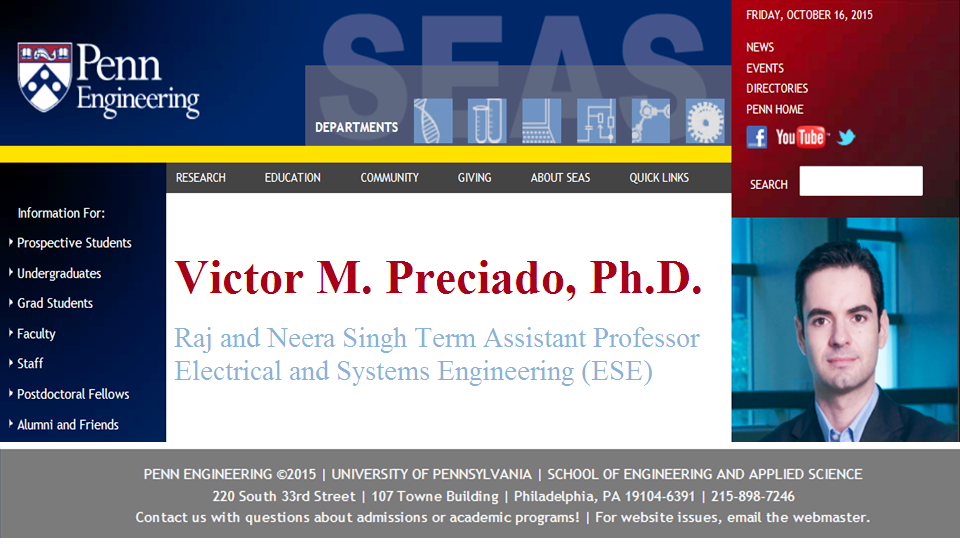 Prof. Victor M. Preciado, Raj and Neera Singh Term Assistant Professor Electrical and Systems Engineering (ESE),
Prof. Victor M. Preciado, Raj and Neera Singh Term Assistant Professor Electrical and Systems Engineering (ESE),
Penn Engineering, University of Pennsilvania, USA.
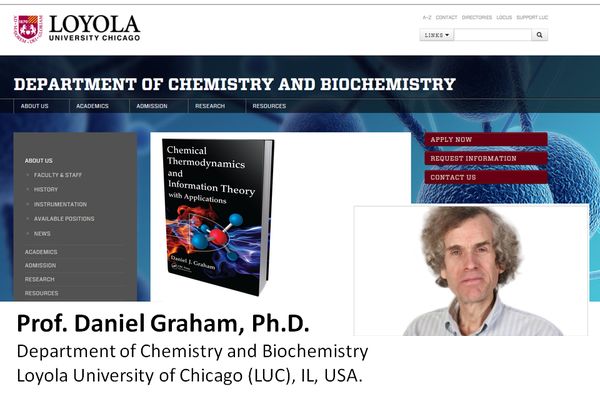 Prof. Daniel Graham, Professor of Chemistry, Loyola University of Chicago (LUC), USA.
Prof. Daniel Graham, Professor of Chemistry, Loyola University of Chicago (LUC), USA.
Prof. Jesús Jimenez Barbero , Ikerbasque Professor, Scientific Director of Center for Cooperative Research in Biosciences (CICBiogune), Biscay. President of Royal Society of Chemistry of Spain.
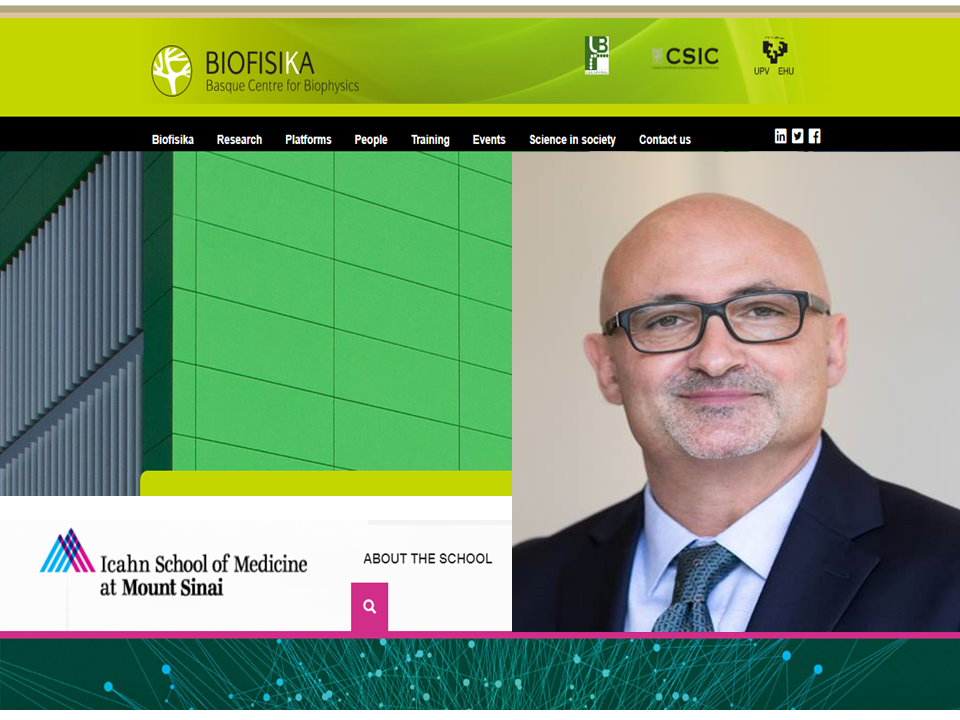
Prof. Iban Ubarretxena, PhD, [IKERBASQUE Profile] [ISMMS Profile] Scientific Director of BIOFISIKA, Basque Center for Biophysics CSIC-UPVEHU, Biscay Biophysics Foundation (BBF), Research Prof. IKERBASQUE, Basque Foundation for Science, Bilbao, Basque Country, Spain. Assoc. Prof. of Pharmacological Sciences, Icahn School of Medicine at Mount Sinai (ISMMS), NY, USA.
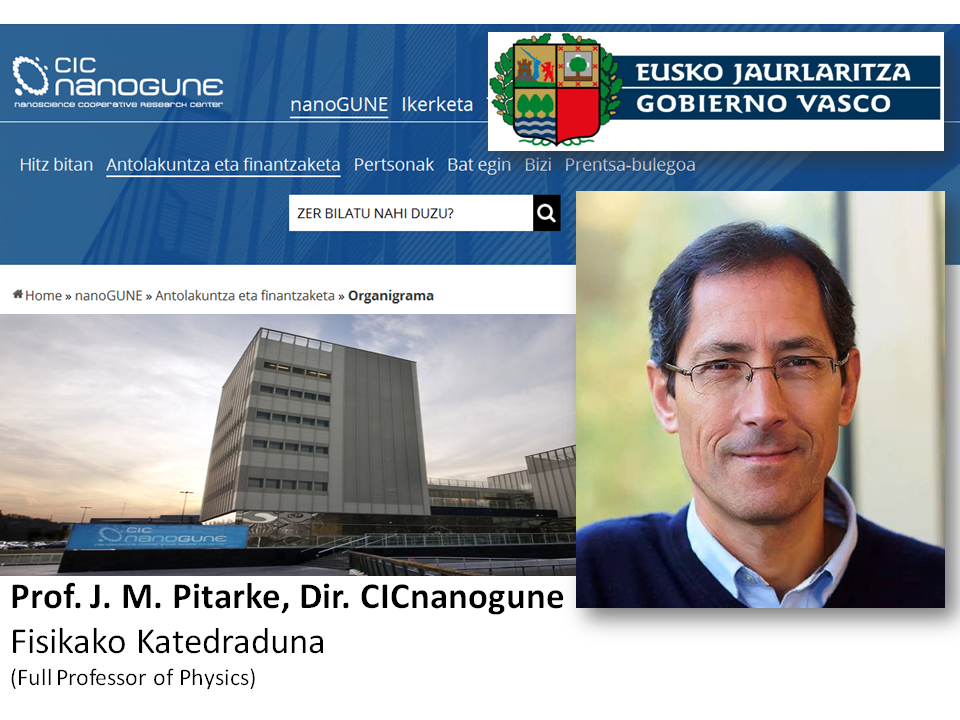
Prof. José María Pitarke , Prof. of Condesed Matter Physics, UPV/EHU, Director of Nanomaterials Cooperative Research Center (CICNanoGune), Tolosa Hiribidea, 76, E-20018, Donostia – San Sebastian, Gipuzkoa.
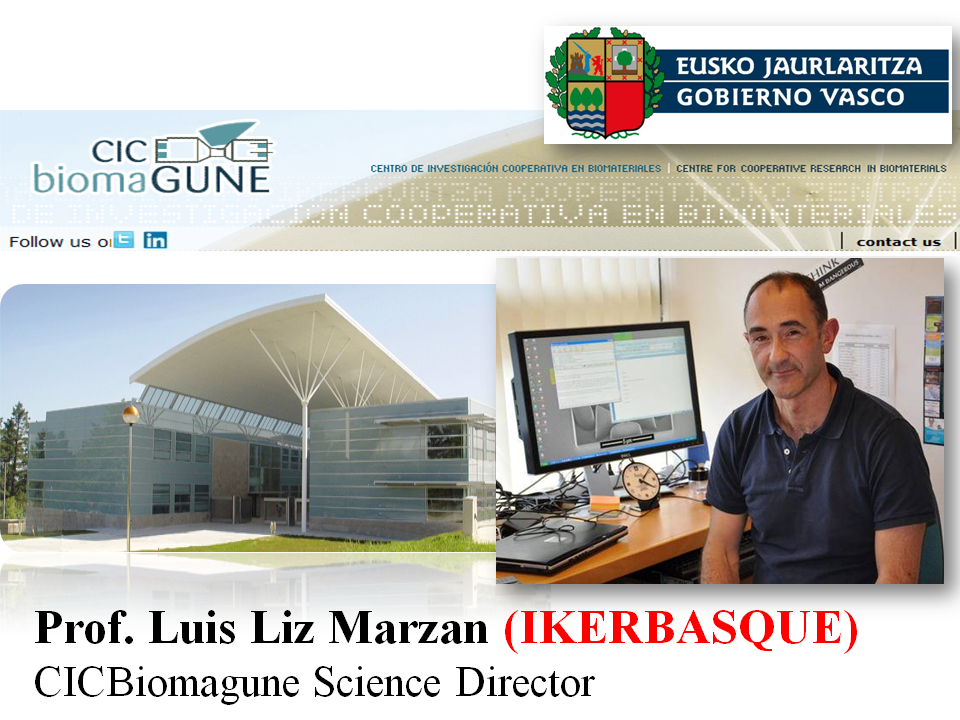
Prof. Luis M Liz-Marzán , Ikerbasque Professor, Scientific Director of Center for Cooperative Research in Biomaterials (CICbiomaGUNE), Gipuzkoa
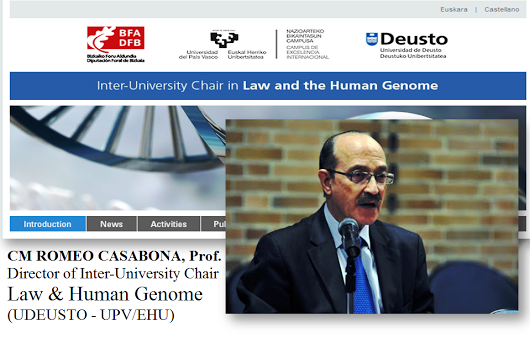
Prof. C.M. Romeo Casabona, Full Professor of Law, Director of Law & Human Genome, Chair, University of the Basque Country (UPV/EHU), Biscay..
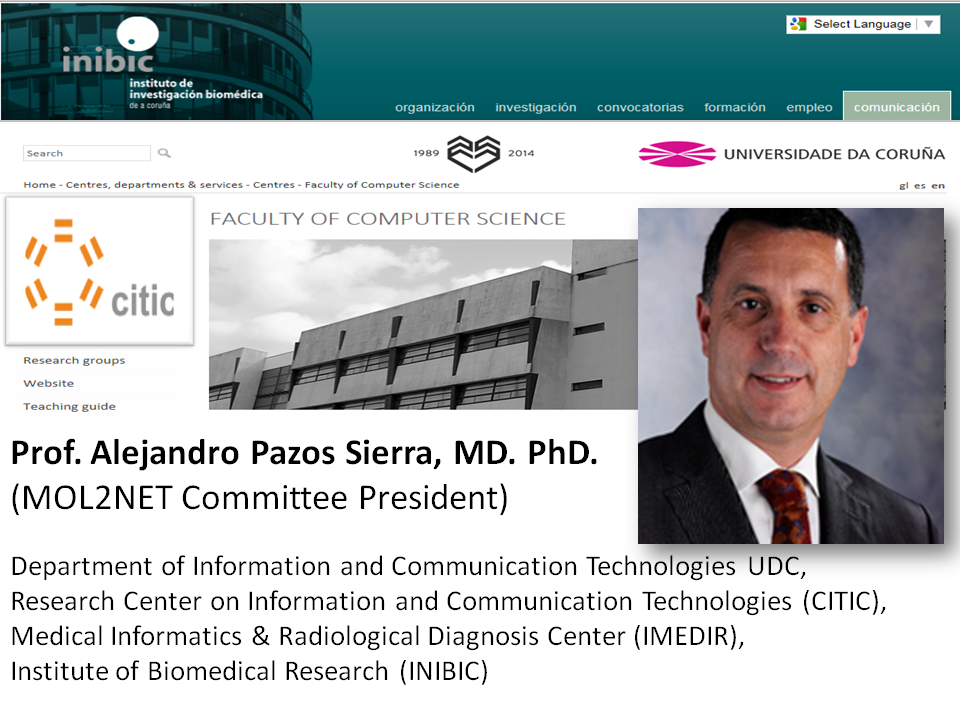
Prof. Alejandro Pazos, Ph.D., M.D., Chair and Director of Department of Computer Sciences, University of Coruña (UDC), Coruña, Spain.
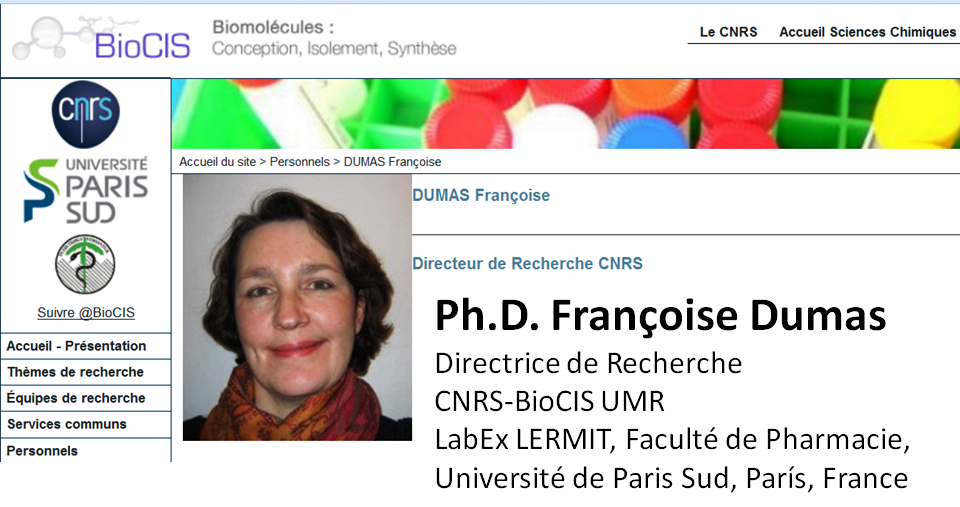
Prof. Françoise Dumas, Prof. Université Paris-Sud, Paris, France CNRS, Directrice de recherche.
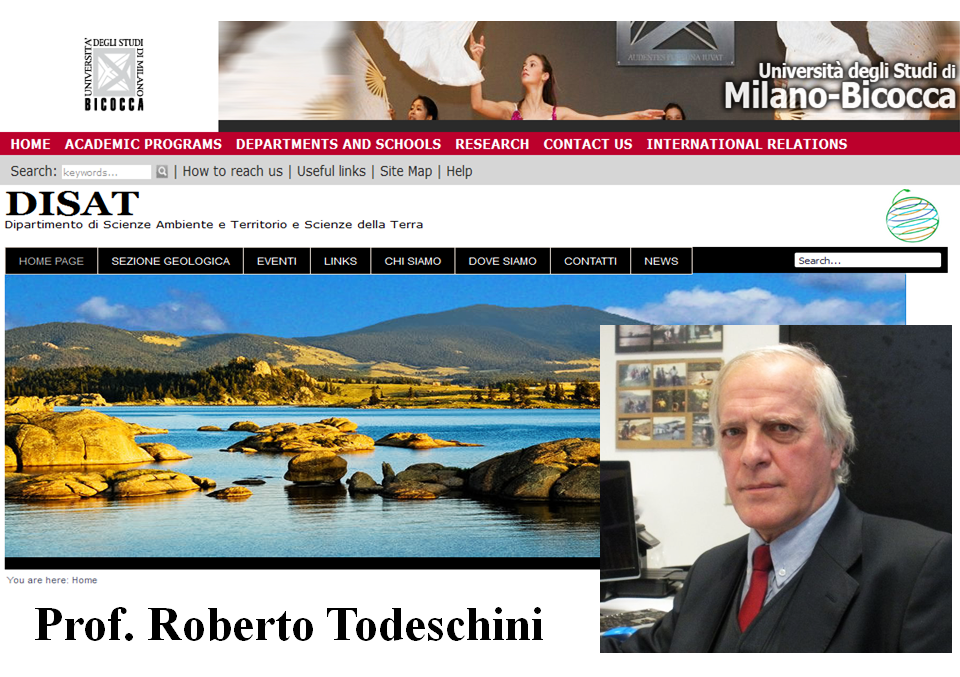
Prof. Roberto Todeschini, Professor of Chemometrics, Department of Environmental Sciences, University of Milano-Bicocca, Milano, Italy.
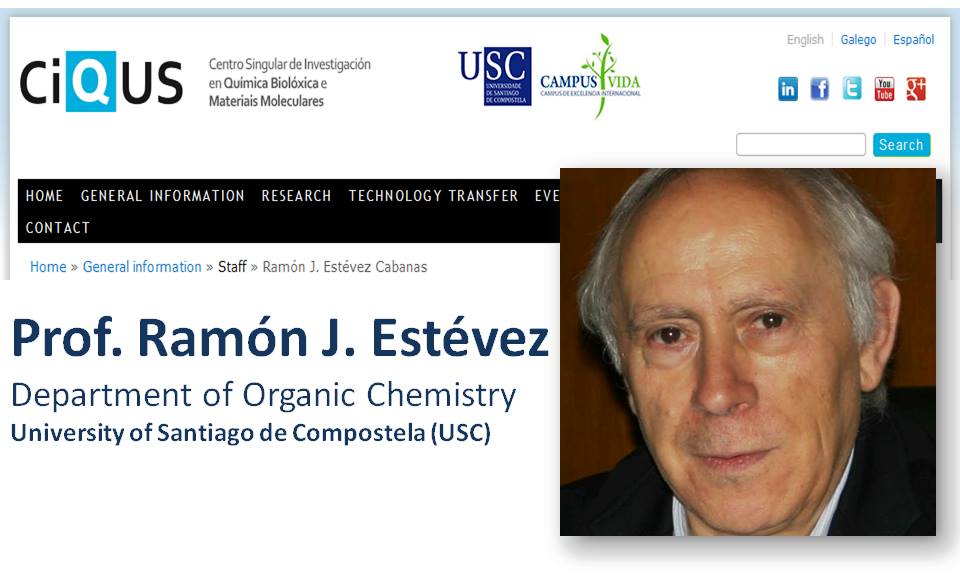
Prof. Ramón J. Estévez Cabanas, CIQUS and Dept. of Organic Chemistry, USC, Spain.

Prof. Miguel A. Gutierrez Ortiz, Dept. of Chemical Engineering, University of Basque Country (UPV/EHU), Campus Bizkaia, Leioa, Spain.
MOL2NET-UPVEHU HQ Institution Committee
*Note: This committee is for MOL2NET Conference Series, to see the committees of each specific workshops associated to the conference visit the page of this workshop.
Prof. Fernando Plazaola Muguruza, Dean Faculty of Science and Technology, University of The Basque Country (UPV/EHU), Leioa, Biscay, Spain.
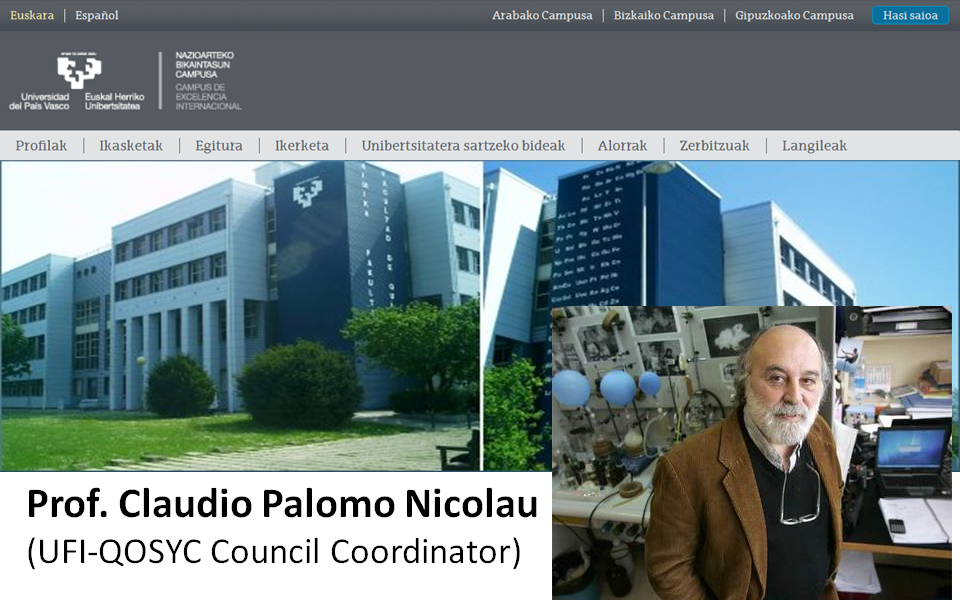
Prof. Claudio Palomo Nicolau, Director Department of Organic Chemistry I, University of Basque Country (UPV/EHU), Donostia - San Sebastián Campus, Gipuzkoa, Spain. (UFI-QOSYC Council Coordinator)
Prof. Maria Isabel Moreno Benítez, Director Dept. of Organic Chemistry II, University of Basque Country (UPV/EHU), Leioa, Sarriena w/n, Bizkaia.
Headquarters Committee Chairpersons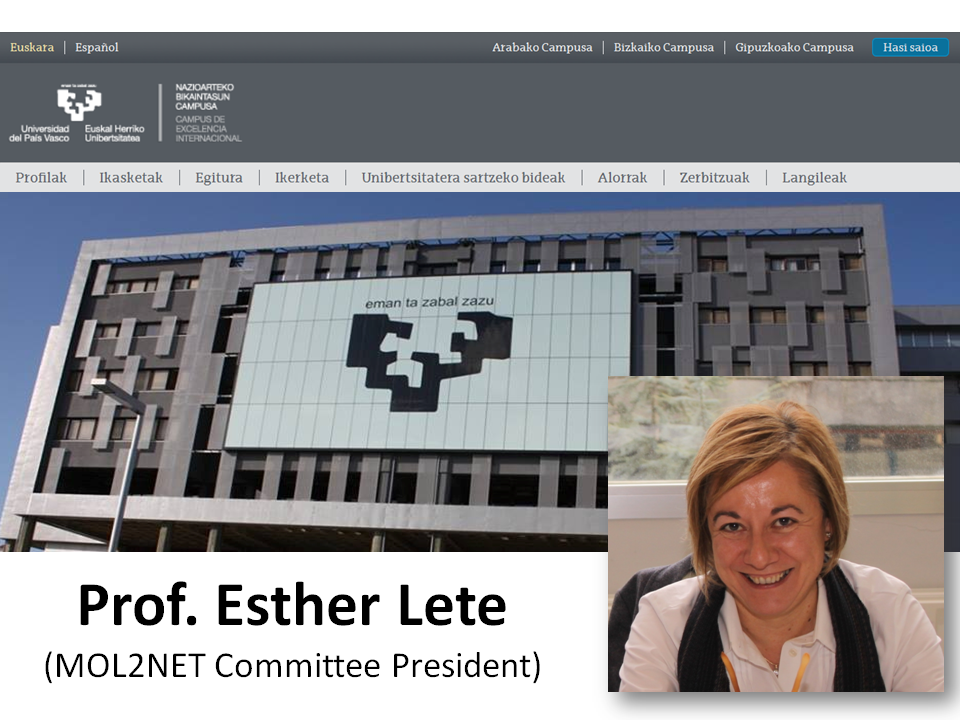
Prof. Esther Lete, Prof. Dept. of Organic Chemistry II, University of Basque Country (UPV/EHU), Leioa, Sarriena w/n, Bizkaia. (Coordinator Ph.D. Synth. & Ind. Chemistry)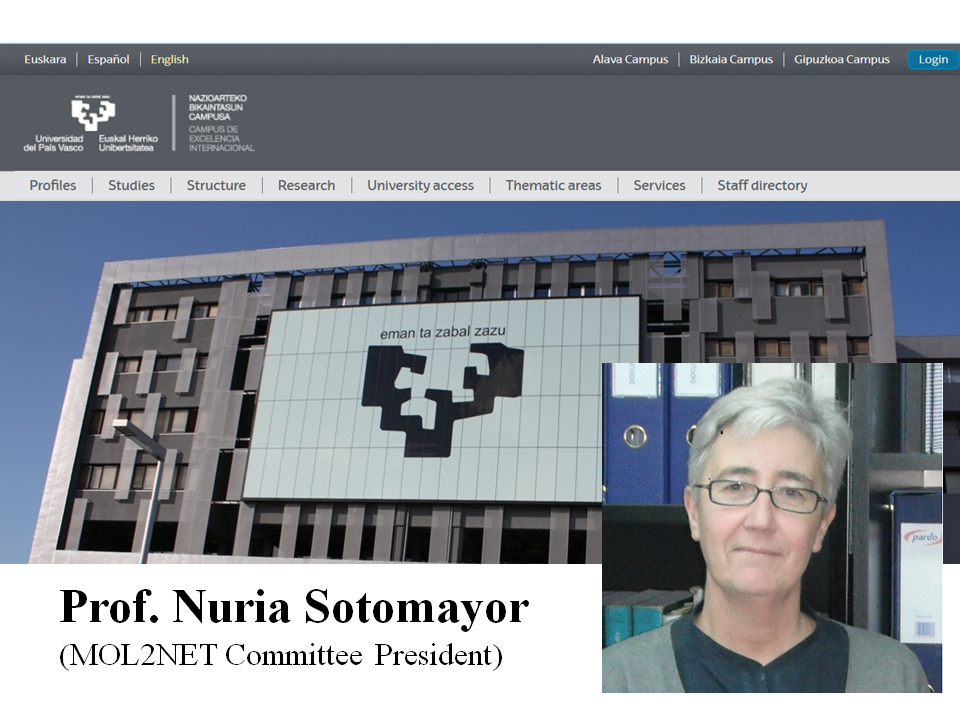
Prof. Nuria Sotomayor, Department of Organic Chemistry II, University of Basque Country (UPV/EHU), Leioa, Sarriena w/n, Bizkaia, Spain. (Coordinator M.Sc. Synth. & Ind. Chemistry)
MOL2NET-IKERBASQUE Advisory Committee

CALL FOR COLLABORATION: In this committee we list all the names of professors/researchers related to IKERBASQUE, Basque Foundation for Science; which are supporting MOL2NET conference. We welcome all members of Ikerbasque community to participate. As the conference is multidisciplinary we are open to experts in all topics. Please, do not hesitate to contact the chairperson to propose a collaboration by yourself or suggest some colleague. Members of the committee may have an active role collaborating in managing activities or a low-profile role. Some of the modalities of collaboration are as conference co-chairs, members of committees, workshop chairpersons, guest editors of JCR journals issues, social networks management, etc. Low-profile roles include being members of committee, recommending the conference to other colleagues, or making suggestions of topics, workshops, etc.

Prof. F.P. Cossío, Scientific Director, IKERBASQUE, Basque Foundation for Science, Dept. of Organic Chemistry I, UPV/EHU Campus Gipuzkoa.
Prof. J.Jimenez-Barbero, Ikerbasque Professor, Scientific Director of Center for Cooperative Research in Biosciences (CICBiogune), Biscay, Dept. of Organic Chemistry II, UPV/EHU, Leioa, Campus Biscay.

Prof. L.M. Liz-Marzán, Ikerbasque Professor, Scientific Director Center for Cooperative Research in Biomaterials CICbiomaGUNE, Gipuzkoa

Prof. E. Solano, Ikerbasque Prof., Ikerbasque Website, Dept. of Physical Chemistry, Univ. of the Basque Country UPV/EHU, 48080 Bilbao, Spain
Prof. S. Knafo, IKERBASQUE Professor, Molecular Cognition Laboratory, Biophysics Institute (CSIC, UPV/EHU), Scientific and Technological Park of Biscay, UPV/EHU, Campus Biscay. Ben Gurion University, Israel.

Prof. Marcos J. Araúzo-Bravo, Ikerbasque Professor, Bioengineering, BioDonostia Health Research Institute, Donostia, Spain.

Prof. M. Piris, IKERBASQUE Professor, DIPC Donostia International Physics Center, UPV/EHU, Campus Donostia - San Sebastian
Prof. Geza Toth, Ikerbasque Professor, Department of Physics, UPV/EHU, Campus Biscay
MOL2NET Chairperson: Prof. Humbert González-Díaz, IKERBASQUE Professor, Email: mol2net.chair@gmail.com, (1) Department of Organic Chemistry II, University of the Basque Country UPV/EHU , 48940, Leioa, Biscay, Spain. (2) IKERBASQUE, Basque Foundation for Science , 48011, Bilbao, Biscay, Spain. ORCID: https://orcid.org/0000-0002-9392-2797
MOL2NET Sci. Committee
MOL2NET Scientific Committee (Abroad)
*Note: This committee is for MOL2NET Conference Series, to see the committees of each specific workshops associated to the conference visit the page of this workshop.
Presidents of the Abroad Scientific Committee
President of Scientific Committee (Mathematics, Physics, Environmental, Atmospheric, and Complexity Sciences)

Prof. David Quesada (Email: dquesada@mdc.edu), Full Professor, Chair of Department of Mathematics, Miami Dade College (MDC), Miami, FL, USA. Chairman STU-MDC Summer Research Institute, (SRI09 Workshop Chairman, Miami, USA) (SRI08 Workshop Chairman, Miami, USA)
President of Scientific Committee (Polymers & Materials Sciences)
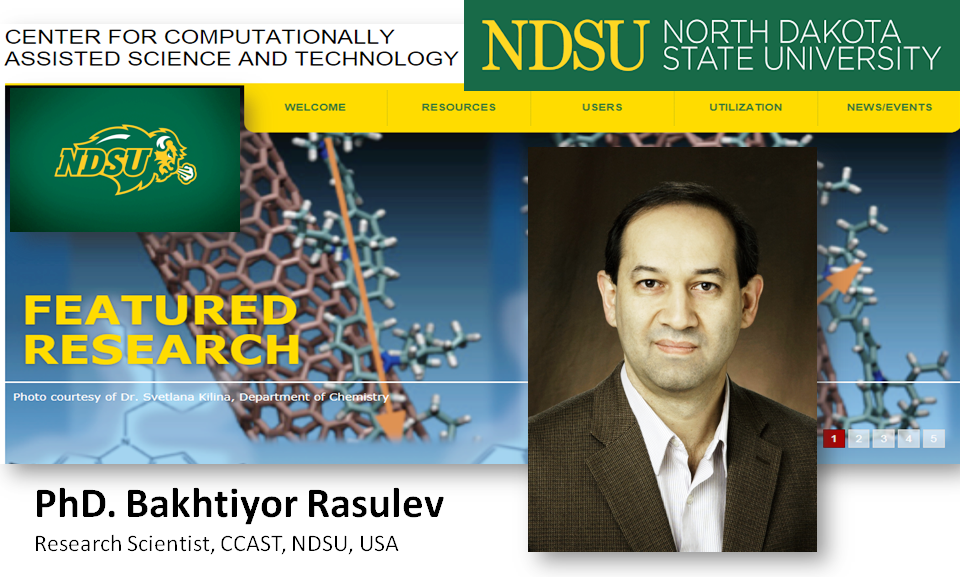
Prof. Bakhtiyor Rasulev, Department of Coatings and Polymeric Material, North Dakota State University (NDSU), Fargo, USA.
President of Scientific Committee (Computational Chemistry and Nanosciences)
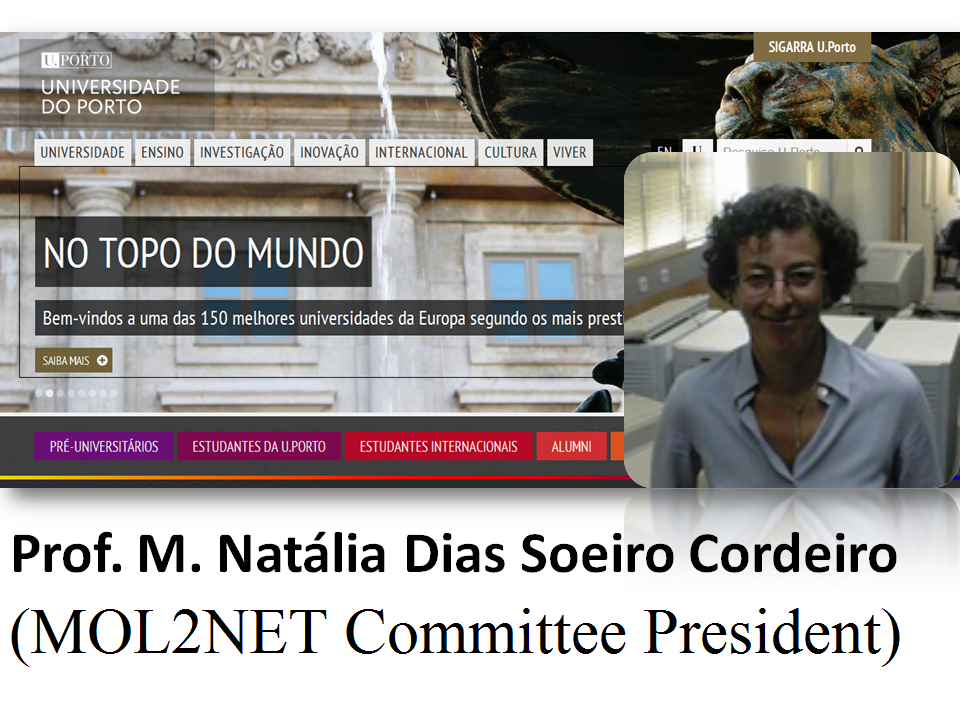
Prof. Natalia D.S. Cordeiro, Department of Chemistry and Biochemistry, Faculty of Sciences, University of Porto, Porto, Portugal.
President of Scientific Committee (Experimental Chemistry)
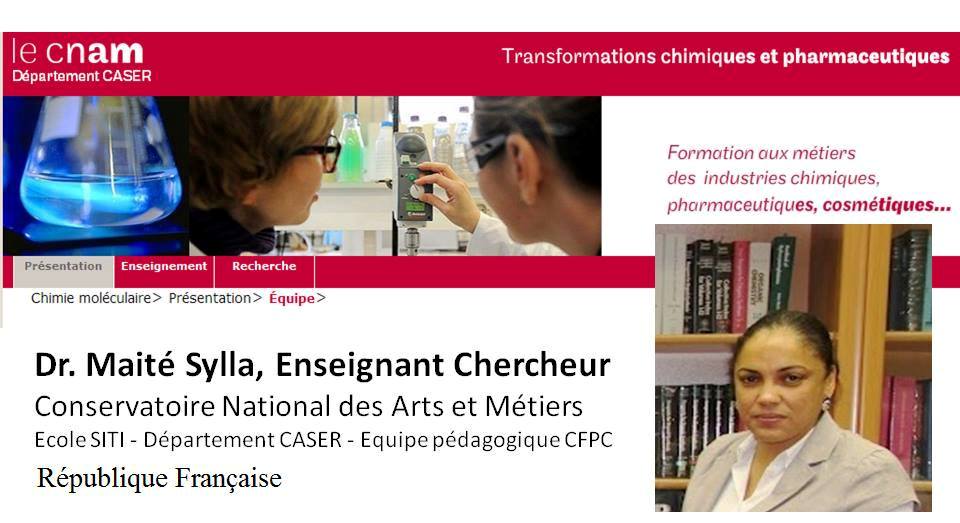
Abroad Scientific Committee (North America)
Prof. James Robert Green, Assoc. Prof., Dept. of Systems and Computer Engineering, Carleton University, Ottawa, Canada.
Prof. Maykel Cruz-Monteagudo, Consultant, Univ. of Miami, Prof. West Coast University, Miami Campus, FL, USA.
Dr. Natalia Sizochenko, ICN, Dept. of Chemistry and Biochemistry, Jackson State University, Jackson, MS, USA.
Dr. Vanessa Aguiar-Pulido, Research Associate, Weill Cornell Medical College, New York City, NY, USA.
Dr. Robersy Sánchez, Eberly College of Science, Huck Institutes of the Life Sciences, The Pennsylvania State University, USA.
Dr. Shameer Khader, Program Director, Dept. of Medical Informatics and Research Informatics, Northwell Health, NY, USA.
Members of Scientific Committee (Europe)
Prof. Emilio Martinez-Nunez, Dept. of Physical Chemistry, University of Santiago de Compostela (USC), Spain,
Email: emilio.nunez@usc.es
Prof. Fernanda Borges, Department of Chemistry and Biochemistry, University of Porto, Portugal.
Email: fborges@fc.up.pt
Dr. Hector M. Díaz-Albiter, Wellcome Trust Centre for Molecular Parasitology, University of Glasgow , United Kingdom.
Prof. Vanessa Robles, MODCELL Group, Department of Molecular Biology, Universidad de León, 24071 León, Spain.
Email: robles.vanesa@gmail.com,
Prof. Igor Iosifovich Baskin, M.V. Lomonosov Moscow State University, Moscow, Russia.
Dr. Alessandro Guiliani, Istituto Superiore di Sanità (ISS), Italy.
Porf. Luisa Di Paola, Department of Engineering, Università Campus Bio-Medico, Rome, Italy.
Dr. Agnieszka Gajewicz, Assist. Prof., Faculty of Chemistry, University of Gdansk, Gdansk, Poland.
Dr. Irina Moreira, FCT Investigator, University of Coimbra, and Marie Curie Fellow at Utrecht University, Netherlands.
Dr. Riccardo Concu, FCT Post-doctoral Researcher, University of Porto, Porto, Portugal.
Dr. Marta G. Lete, CIC bioGUNE: Center for Cooperative Research in Biosciences, Great Bilbao, Biscay, Basque Country, Spain, Email: martagutierrezlete@gmail.com
Members of Scientific Committee (Other Regions)
Prof. Kunal Roy, Department of Pharmaceutical Technology, Jadavpur University, Kolkata, India.
Prof. Eduardo Sobarzo-Sanchez. Instituto de Investigación e Innovación en Salud, Universidad Central de Chile, Chile.
Prof. Carolina Horta Andrade, Universidade Federal de Goias, Setor Leste Universitario, Goiania, Brazil.
Prof. Yovani Marrero-Ponce, University San Francisco de Quito, Quito, Ecuador. Email:
Prof. Marcus T Scotti, Universidade Federal da Paraíba, Campus IV, Paraíba, Brazil. Email: mtscotti@gmail.com
Prof. Juan A. Castillo-Garit, University of Medical Sciences of Villa Clara (UCMVC), Santa Clara, Cuba, Email: jacgarit@yahoo.es
MOL2NET Scientific Committee (Local)
*Note: This committee is for MOL2NET Conference Series, to see the committees of each specific workshops associated to the conference visit the page of this workshop.
Chairperson Scientific Committee (Chemical Sciences) 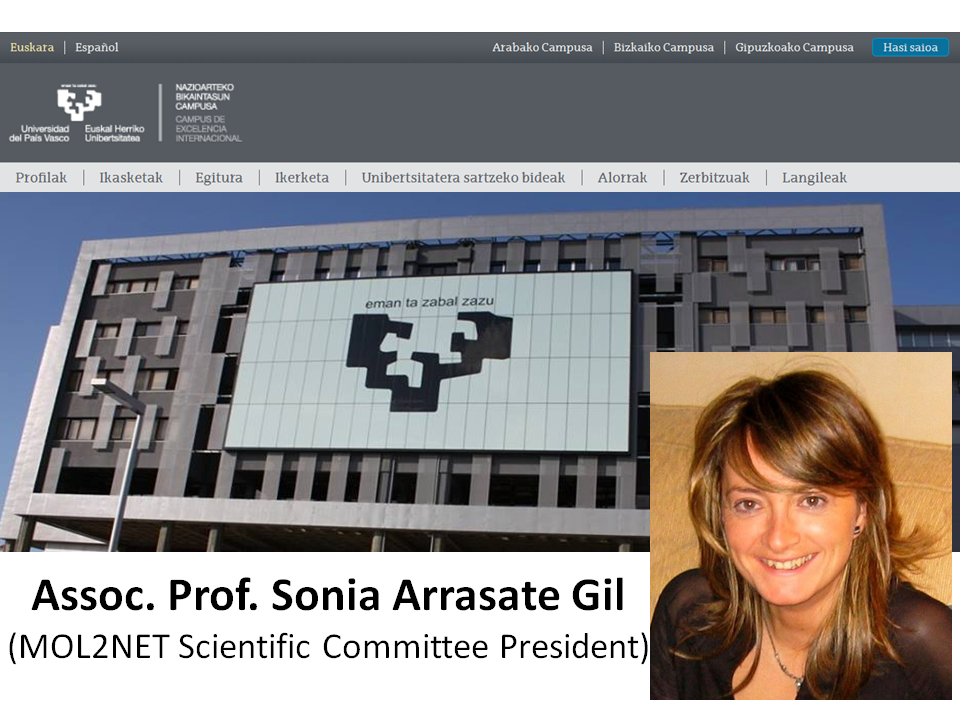
Prof. Sonia Arrasate, Department of Organic Chemistry II, University of Basque Country (UPV/EHU), Leioa, Sarriena w/n, Bizkaia.
Email: sonia.arrasate@ehu.eus
Chairperson Scientific Committee (Physical Sciences)
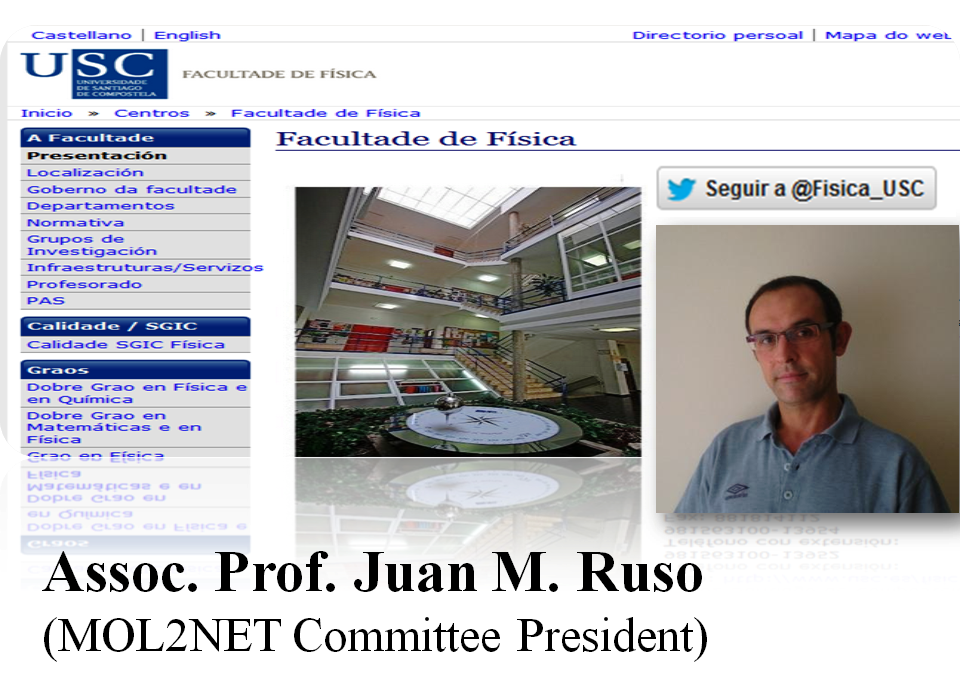
Prof. Juan M. Ruso, Department of Applied Physics, Faculty of Physics, University of Santiago de Compostela (USC), Spain.
Email: juanm.ruso@usc.es
Chairperson Scientific Committee (Neurosciences)
Prof. Shira Knafo, IKERBASQUE Professor, Molecular Cognition Laboratory, (1) Biophysics Institute (CSIC, UPV/EHU), Scientific and Technological Park of Biscay. University of The Basque Country UPV/EHU, Biscay, Spain. Ikerbasque, Basque Foundation for Science. (2) Ben-Gurion University of the Negev Faculty of Health Sciences: Beer Sheva, Southern, Israel.
Chairperson Scientific Committee (ICT & Legal Informatics)

Dr. Aliuska Duardo Sanchez (Ph.D. Legal Informatics), Chair in Law & The Human Genome Research Group, Faculty of Law, University of The Basque Country UPV/EHU, Leioa (Bilbao), Biscay, PANELFIT H2020, Project Manager & EDC Board Coordinator, Europe Commission. Email: aliuska.duardo@ehu.es
Scientific Committee Members
Deusto Tech Research Center, University of Deusto
Prof. Enrique Onieva, Lect. & Researcher, Big Data, Data Mining and Intell. Transp. Systems
BioDonostia Health Research Institute
Prof. Marcos J. Araúzo-Bravo, Ikerbasque Professor, Bioengineering
CIC bioGUNE, Center for Cooperative Research in Biosciences
Prof. Nicola Abrescia, Ikerbasque Professor, Structural Virology Laboratory
University of Santiago de Compostela (USC)
Prof. Julio Seijas , Dept. of Organic Chemistry, Faculty of Sciences, Campus Lugo, USC, Spain.
Prof. Eugenio Uriarte Villares, Dept. of Organic Chemistry, USC, Spain.
Prof. Florencio Martínez Ubeira, Dept. of Microbiology and Parasitology, USC, Spain.
Prof. María Isabel Loza, Department of Pharmacology, USC, Spain.
Prof. Ramón J. Estévez Cabanas, Dept. of Organic Chemistry, USC, Spain.
Prof. Emilio Martinez-Nunez, Dept. of Physical Chemistry, USC, Spain.
University of Vigo (UVIGO)
Prof. Yagamare Fall, Dept. of Organic Chemistry, University of Vigo (UVIGO), Vigo, Spain.
Scientific Committee Members (UPV/EHU)
Prof. Claudio Palomo Nicolau, Director Department of Organic Chemistry I, UPV/EHU, Campus Gipuzkoa
Prof. Francisco Palacios Gambra, Department of Organic Chemistry I, UPV/EHU, Campus Vitoria
Prof. Jose Luis Vicario, Department of Organic Chemistry II, UPV/EHU, Campus Biscay
Prof. Javier Meana, Department of Pharmacology, Faculty of Medicine, UPV/EHU, Campus Biscay
Prof. Néstor Etxebarria Loizate, Dept. Analytical Chemistry, UPV/EHU, Campus Biscay
Prof. Luis Lezama, Department of Inorganic Chemistry, UPV/EHU, Campus Biscay
Prof. Gotzon Madariaga, Department of Physics of Condensed Matter, UPV/EHU, Campus Biscay
Prof. Rosa M. Alonso, Department of Analytical Chemistry, UPV/EHU, Campus Biscay
Prof. Mª Isabel Moreno, Dir. Dept. of Organic Chemistry II, UPV/EHU, Campus Biscay
Prof. Imanol Tellitu Cortazar, Sec. Dept. of Organic Chemistry II, UPV/EHU, Campus Biscay
Prof. Jose Luis Vilas, Dir. Dept. of Physical Chemistry, UPV/EHU, Campus Biscay
Prof. Maria Luisa Carrillo Fernández, Dept. of Organic Chemistry II, UPV/EHU, Campus Biscay
Prof. Efraim Reyes Martín, Dept. of Organic Chemistry II, UPV/EHU, Campus Biscay
Prof. Uxue Uria Pujana, Dept. of Organic Chemistry II, UPV/EHU, Campus Biscay
Prof. Raúl SanMartín Faces, Dept. of Organic Chemistry II, UPV/EHU, Campus Biscay
Prof. Mª Teresa Herrero Corral, Dept. of Organic Chemistry II, UPV/EHU, Campus Biscay
Prof. Eneritz Anakabe Iturriaga, Department of Organic Chemistry II, UPV/EHU, Campus Biscay
Prof. Carmen Iriondo Gabilondo, Dept. of Organic Chemistry II, UPV/EHU, Campus Biscay
Prof. Mario Piris, Ikerbasque Prof., Donostia International Physics Center (DIPC), UPV/EHU, Campus Gipuzkoa
Prof. Inmaculada Arostegui, Dept. of Applied Mathmatics and Statistics, UPV/EHU, Campus Biscay
Prof. Aresatz Usobiaga, Department of Analytical Chemistry, UPV/EHU, Campus Biscay
Prof. Maite Insausti, Department of Inorganic Chemistry, UPV/EHU, Campus Biscay
Prof. Izaskun Gil de Muro, Dept. of Inorganic Chemistry, UPV/EHU, Campus Biscay
Ph.D. Jose Manuel Laza Terroba, Dept. of Physical Chemistry, UPV/EHU, Campus Biscay
Prof. Ailette Prieto Sobrino, Dept. of Analytical Chemistry, UPV/EHU, Campus Biscay
Prof. Jose Luis Ayastuy Arizti, Dept. of Chemical Engineering, UPV/EHU, Campus Biscay
Prof. Irantzu Barrio, Ph.D. Department of Applied Mathematics and Statistics, UPV/EHU, Campus Biscay
PhD. Marta G. Lete, Dept. of Biochemistry and Molecular Biology, UPV/EHU, Campus Biscay
Thank you for your support!!!
MOL2NET Chairman
Prof. González-Díaz H., IKERBASQUE Professor, Email: gonzalezdiazh@yahoo.es
(1) Department of Organic Chemistry II, University of the Basque Country UPV/EHU , 48940, Leioa, Biscay, Spain.
(2) IKERBASQUE, Basque Foundation for Science , 48011, Bilbao, Biscay, Spain.![]() ORCID: https://orcid.org/0000-0002-9392-2797
ORCID: https://orcid.org/0000-0002-9392-2797
USEDAT People Photo Gallery


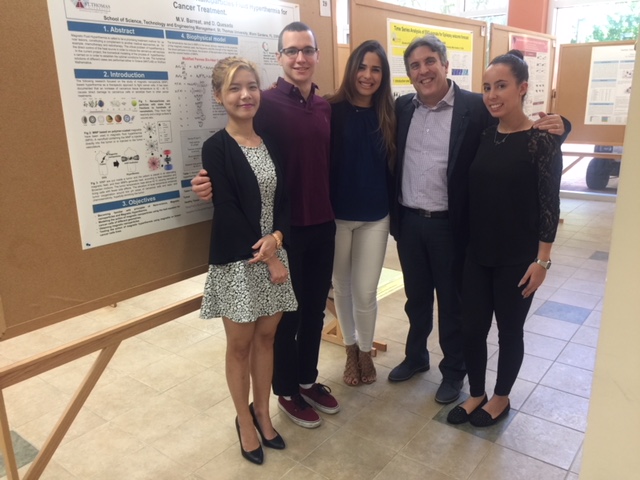
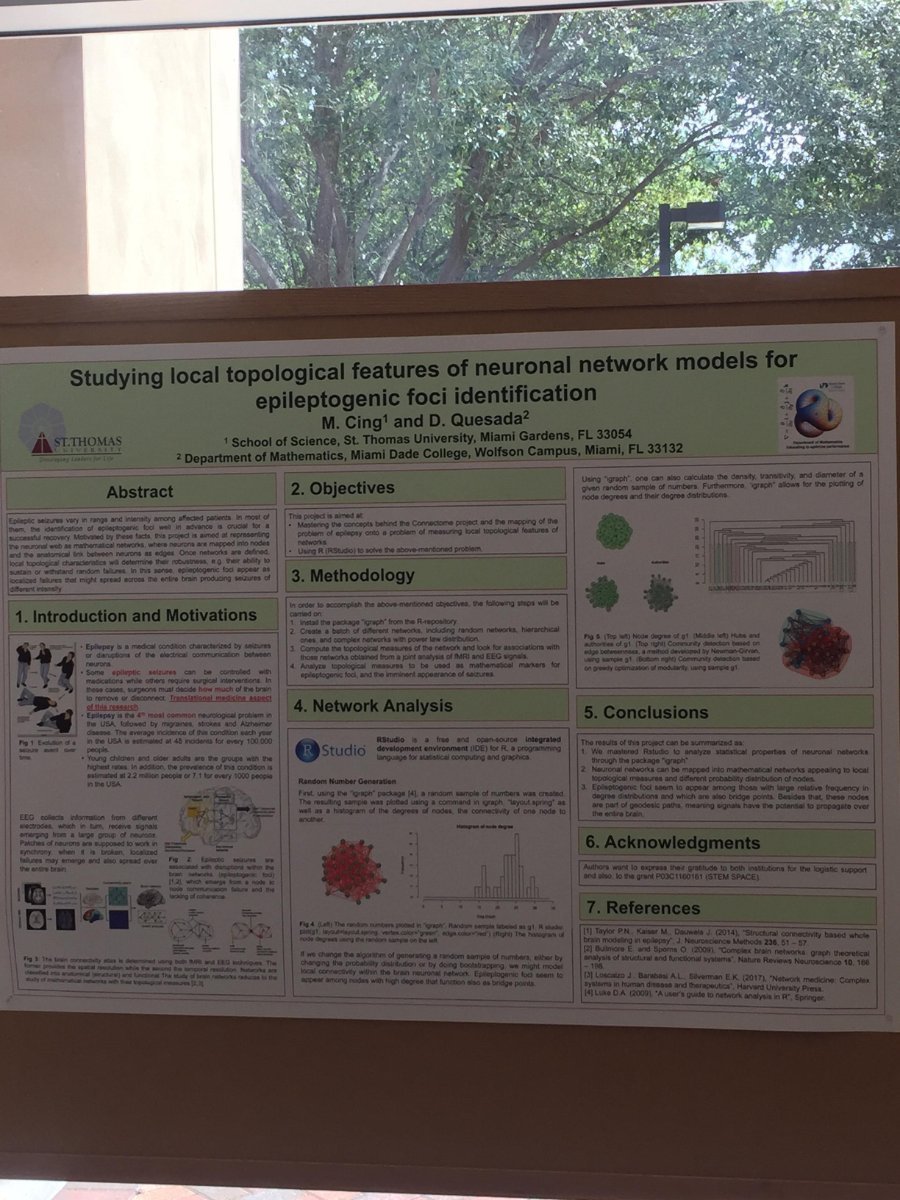 |
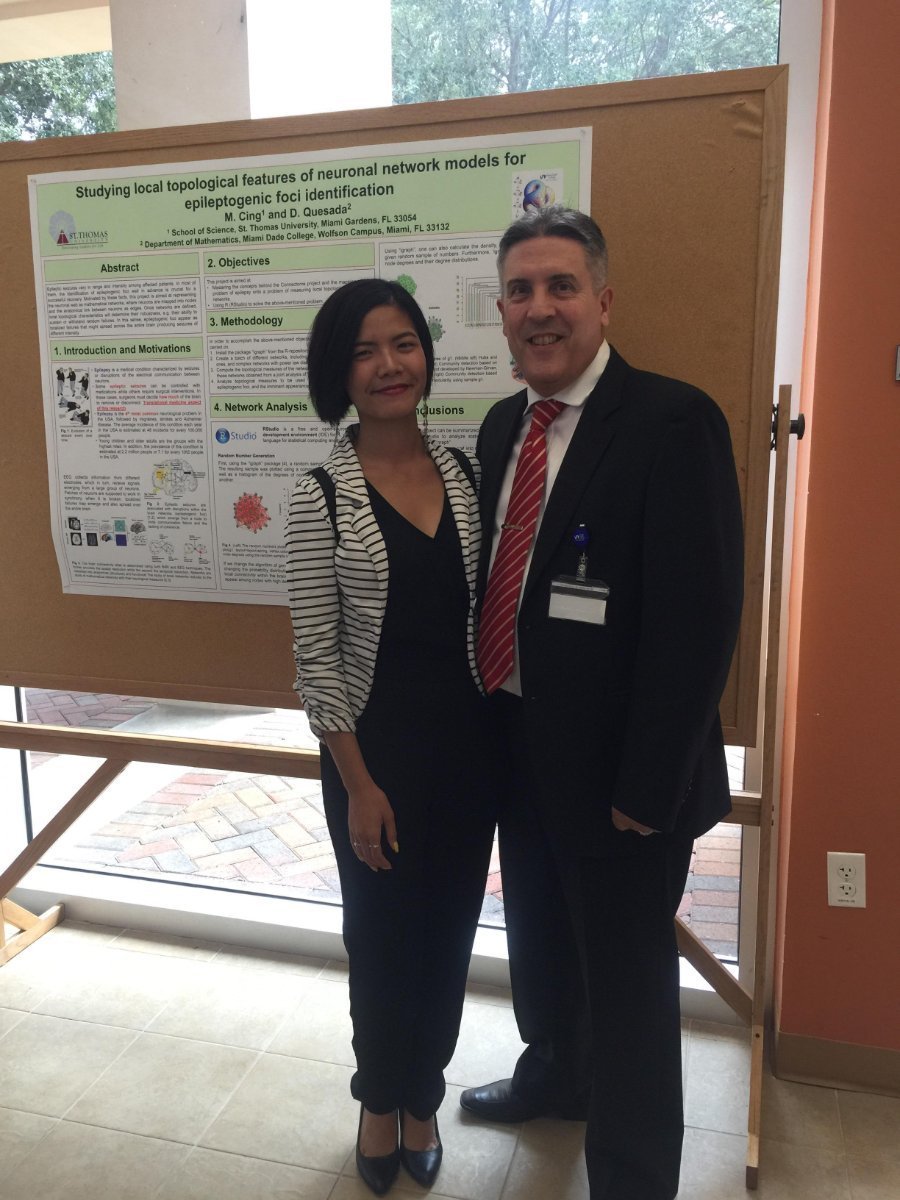 |
 USEDAT UDC RNASA-IMEDIR School: Prof. Alejandro Pazos, Director Dept. of Computation and Prof. Cristian Munteanu, Dept. of Comput., FIC, UDC and RNASA-IMEDIR Staff Professors and Researchers with USEDAT Students MSc Alejandro Cabrera and MSc Andres López-Cortez (UDC PhD Students and Profs. UDLA Quito, Ecuador) and USEDAT Students from DELFIN Summer Internship Program (Jesús Hernández, Luis Trejo y María Martínez), sistemas computacionales (Francisco Medrano y Edgar Pozas), química (Carlos Cruz y Fernando Valdés), electromecánica (Elizabeth Hernández), biomédica (Karina Solórzano) y farmacéutica (Guillermina Martínez), Funded by CONCAYT Mexico, 2019. Ref: El Correo Gallego Press Note [Newsid1191477].
USEDAT UDC RNASA-IMEDIR School: Prof. Alejandro Pazos, Director Dept. of Computation and Prof. Cristian Munteanu, Dept. of Comput., FIC, UDC and RNASA-IMEDIR Staff Professors and Researchers with USEDAT Students MSc Alejandro Cabrera and MSc Andres López-Cortez (UDC PhD Students and Profs. UDLA Quito, Ecuador) and USEDAT Students from DELFIN Summer Internship Program (Jesús Hernández, Luis Trejo y María Martínez), sistemas computacionales (Francisco Medrano y Edgar Pozas), química (Carlos Cruz y Fernando Valdés), electromecánica (Elizabeth Hernández), biomédica (Karina Solórzano) y farmacéutica (Guillermina Martínez), Funded by CONCAYT Mexico, 2019. Ref: El Correo Gallego Press Note [Newsid1191477].

USEDAT GTPB - The Gulbenkian Training Programme in Bioinformatics: Prof. Pedro L. Fernandes, with students of Bioinformatics Training, Instituto Gulbenkian de Ciencia (IGC), Lisbon.
USEDAT GTPB - The Gulbenkian Training Programme in Bioinformatics (@mygtpb): Train-the-Trainer event, attached to the BPBR16 course. First day, how learning works, training techniques. Prof. Pedro L. Fernandes, with Ragnhild Reehorst Lereim, Vincenza Colonna, Domenica D'Elia, Allegra Via, Kim Gurwitz, David Philip Judge, Inês Fragata, Herminia Gnu, Marta Pingarilho, Jure Dimec and KeLin at Instituto Gulbenkian de Ciência, Lisbon, Portugal. USEDAT UPV/EHU School: Prof. Sonia Arrasate and Prof. Humbert Gonzalez-Diaz (IKERBASQUE Professor) UPV/EHU Dept. Org. Chem II, with with USEDAT Students from DELFIN Summer Internship Program, Funded by CONCAYT Mexico, 2019.
USEDAT UPV/EHU School: Prof. Sonia Arrasate and Prof. Humbert Gonzalez-Diaz (IKERBASQUE Professor) UPV/EHU Dept. Org. Chem II, with with USEDAT Students from DELFIN Summer Internship Program, Funded by CONCAYT Mexico, 2019.
 SDDN2018 USEDAT UPV/EHU School visit: Prof. Mabel Losa, University of Santiago de Compostela (USC), Prof. Esther Lete, Prof. Nuria Sotomayor, Prof. Sonia Arrasate, UPV/EHU Dept. Org. Chem II, with USEDAT Students Dr. Javier Llorente (UPV/EHU), MSc Viviana Quevedo (PhD Student University of Coruña and Prof. Universidad Estatal Amazónica), MSc. Deyani Nocedo Mena(PhD Student UANL, Funded by Conacyt, Mexico), MSc. Ricardo Santana (PhD Student Universidad de Deusto funded by Colciencias, Colombia) , MSc Harbil Bediaga (UPV/EHU) at Plenary Talk of Prof. Humbert Gonzalez-Diaz (IKERBASQUE Professor, MOL2NET Chairperson) at SDDN2018 X meeting of the Spanish Drug Discovery Network, Bizkaia Aretoa in Bilbao on November 22nd and 23rd, 2018, kindly invited by Prof. Jesús Jiménez-Barbero (CIC Biogune Director), SDDN Chairperson, MOL2NET Honor Committee.
SDDN2018 USEDAT UPV/EHU School visit: Prof. Mabel Losa, University of Santiago de Compostela (USC), Prof. Esther Lete, Prof. Nuria Sotomayor, Prof. Sonia Arrasate, UPV/EHU Dept. Org. Chem II, with USEDAT Students Dr. Javier Llorente (UPV/EHU), MSc Viviana Quevedo (PhD Student University of Coruña and Prof. Universidad Estatal Amazónica), MSc. Deyani Nocedo Mena(PhD Student UANL, Funded by Conacyt, Mexico), MSc. Ricardo Santana (PhD Student Universidad de Deusto funded by Colciencias, Colombia) , MSc Harbil Bediaga (UPV/EHU) at Plenary Talk of Prof. Humbert Gonzalez-Diaz (IKERBASQUE Professor, MOL2NET Chairperson) at SDDN2018 X meeting of the Spanish Drug Discovery Network, Bizkaia Aretoa in Bilbao on November 22nd and 23rd, 2018, kindly invited by Prof. Jesús Jiménez-Barbero (CIC Biogune Director), SDDN Chairperson, MOL2NET Honor Committee.
 USEDAT UPV/EHU School: Prof. Humbert Gonzalez-Diaz (IKERBASQUE Professor, MOL2NET Chairperson) and Prof. Sonia Arrasate, UPV/EHU Dept. Org. Chem II, with USEDAT Students MSc Viviana Quevedo (PhD Student University of Coruña and MD Student Raquel Alfaro, CONACYT Delfin Program Student.
USEDAT UPV/EHU School: Prof. Humbert Gonzalez-Diaz (IKERBASQUE Professor, MOL2NET Chairperson) and Prof. Sonia Arrasate, UPV/EHU Dept. Org. Chem II, with USEDAT Students MSc Viviana Quevedo (PhD Student University of Coruña and MD Student Raquel Alfaro, CONACYT Delfin Program Student.(1) Dept. of Organic Chemistry II, University of the Basque Country UPV/EHU , 48940, Leioa, Biscay, Spain.
(2) IKERBASQUE, Basque Foundation for Science , 48011, Bilbao, Biscay, Spain.
Conference Chairs
Dept. of Organic and Inorganic Chemistry, University of The Basque Country UPV/EHU, Leioa, 48940, Greater Bilbao, Basque Country, Spain. Website
Dept. of Organic and Inorganic Chemistry, University of The Basque Country UPV/EHU, Leioa, 48940, Greater Bilbao, Basque Country, Spain.
mol2net.chair@gmail.com
List of accepted submissions (137)
| Id | Title | Authors | Poster PDF | ||||||||||||||||||||||||||||||||||||||
|---|---|---|---|---|---|---|---|---|---|---|---|---|---|---|---|---|---|---|---|---|---|---|---|---|---|---|---|---|---|---|---|---|---|---|---|---|---|---|---|---|---|
| sciforum-025711 | Molecular docking of fructose-derived nucleoside analogs against reverse transcriptase of HIV-1 |
,
Marcus Scotti ,
Luciana Scotti
|
N/A |
Show Abstract |
|||||||||||||||||||||||||||||||||||||
|
AIDS is a chronic infection that compromises the immune system of the individual infected with HIV, leaving him vulnerable to secondary infections. According to the Ministry of Health in 2017 there were 200,000 cases in Brazil, considered a worldwide pandemic with a record 36.7 million cases to date. HIV is a retrovirus, that is, it has RNA as a genetic material, and needs the action of reverse transcription (TR) to multiply. A nucleoside is formed by the N-glycosidic bond between a carbohydrate and a nitrogenous base (purine or pyrimidine) which in the biological medium is phosphorylated and inserted into the genetic material at the time of HIV viral multiplication. The bioactives analogous to the natural nucleosides upon being inserted by the TR into the DNA strand of an infected cell are not encoded and the retroviral multiplication process is immediately terminated by non-recognition of that analog. The major difficulty today is the action of these nucleoside analogs on other non-selective biological targets, such as the protease enzyme, and integrates, conferring toxicity to uninfected cells. This work consists of a computational analysis through Molecular Docking to predict the potential inhibitory activity of reverse transcriptase from a series of 24 nucleoside analogues derived from fructopyranose compared to the bioactive molecules already inserted in the anti-HIV treatment. For this study 36 molecules were designed in ChemDraw Ultra 12.0 to obtain its 2D structural formula. Then the molecule was optimized (RMS 0.1 kcal / Å.mol in maximum 660 cycles) by the Molecular Mechanics (MM +) and Semi-empirical (AM1) methods with the help of HyperChemTM (Release 8.0.6 for Windows) software for of the 3D structure. Finally, the enzyme reverse transcriptase in PBD (PDB ID 1REV) was selected and in Molegro Virtual Docking 6.0 anchorage was performed. Analyzing the results, it is possible to conclude that some molecules presented energies favorable to the formation of the ligand-enzyme complexes, as well as the presence of interactions with amino acid residues common to known inhibitors. Thus, this study contributes to obtaining new anti-HIV biomolecules through monosaccharides easily found in nature. |
|||||||||||||||||||||||||||||||||||||||||
| sciforum-025768 | A Machine Learning approach for the identification of CRISPR/Cas9 nuclease off-target for the treatment of Hemophilia | , | N/A |
Show Abstract |
|||||||||||||||||||||||||||||||||||||
|
Hemophilia can be defined as a genetic disorder in which the body loses its capability to clot blood, and hence can’t stop blood flow. It is an X- linked recessive disease, hence mostly seen in males, with its severity significantly reduced in females. In India, hemophilia has an occurrence of 1 per 10,000 births, which generally progresses to a chronic disability or premature death in subjects left untreated or provided with suboptimal treatment, a case prevalent in India [1]. The two major types of this condition are hemophilia A or factor VIII deficiency and hemophilia B or factor IX deficiency. In addition, hemophilia C is a rare category in which inhibitory antibodies develop which show high affinity to procoagulants, thus neutralizing the effect of a coagulation factor. Inhibitors are much less common in patients with hemophilia B than in those with hemophilia A. The F8 gene present on the X chromosome is responsible for guiding the production of coagulation factor VIII, essential for forming blood clots. In hemophilia A, mutation results from two gross (140 kbp or 600 kbp) chromosomal inversions that involve introns 1 and 22, respectively. Similarly, the F9 gene present on the X chromosome mutates through several different mechanisms to give rise to hemophilia B condition. The conditions associated with hemophilia Leyden, ribosome readthrough of nonsense mutation and apparently ‘silent’ changes that do not alter amino acids are the major mutations studied. It has been observed that reconstitution with 1–2% of the clotting factor helps uplift the quality of life, while 5–20% reconstitution is required to ameliorate the genetic disorder. Gene-specific genome editing is preferred over random integration of expression cassettes as this helps avoid genotoxicity and achieve the required physiological levels of expression. Advances in genome engineering based on CRISPR- associated RNA- guided endonuclease Cas9 are empowering the guidance of the said endonuclease to target locations by a short RNA search string [2]. It requires a programmable sequence-specific RNA to direct it and introduce cleavage and double-stranded breaks at the target site. In case of hemophilia A, induced pluripotent stem cells (iPSCs) can be derived from patients with inversion genotypes with an aim to revert these chromosomal conditions to the corrected state with the assistance of CRISPR- Cas9 nucleases [3]. The endothelial cells from the corrected iPSCs can be checked for expression of F8 gene and the production of factor VIII. Likewise, in case of hemophilia B, delivery of naked Cas9-sgRNA plasmid and donor DNA, aiming to recover the mutation has shown a detectable gene correction (>1%) in F9 alleles of hepatocytes [4]. To construct the related plasmids, an AAVS1-Cas9-sgRNA plasmid is designed to cut the AAVSI locus in human. Subsequently, two donor plasmids are designed to insert GFP and F9 cDNA into the designated AAVS1 locus. Whole genome sequencing (WGS) is used in combination with this editing method to identify off-target mutations, to ensure that editing takes place at the desired site. The technique offers several benefits over the popularly used Adeno- associated viral (AAV) vectors such as precision, decreased insertional oncogenesis and control through an endogenous promoter [5]. The CRISPR/Cas9- mediated genome editing with an AAV8 vector has been put to use to provide an adjustable path to induce double-strand breaks at the target genes in hepatocytes [6]. The foremost need for CRISPR-Cas9 is the identification of targets that have undergone a mutation, which has led to the development of the said condition. Although a few targets are known, none of the target mutation has been capable to render a 5-20 percent of reconstitution that is required for the elimination of the disorder. Hence, there is a need to find novel targets for the CRISPR-Cas9 system, which in turn requires the assistance of computational tools. The aim of this study is to identify positive CRISPR-Cas9 targets which would help in better and more accurate treatment of the disorder with computational biology facilitating the research. The study provide targets which possess minimum off-target mutations, providing maximum reconstitution for hemophilia. References [1] Kar, A., Phadnis, S., Dharmarajan, S., & Nakade, J. (2014). Epidemiology & social costs of haemophilia in India. The Indian journal of medical research, 140(1), 19. [2] Hsu, P. D., Lander, E. S., & Zhang, F. (2014). Development and applications of CRISPR-Cas9 for genome engineering. Cell, 157(6), 1262-1278. [3] Park, C. Y., Kim, D. H., Son, J. S., Sung, J. J., Lee, J., Bae, S., ... & Kim, J. S. (2015). Functional correction of large factor VIII gene chromosomal inversions in hemophilia A patient-derived iPSCs using CRISPR-Cas9. Cell stem cell, 17(2), 213-220. [4] Huai, C., Jia, C., Sun, R., Xu, P., Min, T., Wang, Q., ... & Lu, D. (2017). CRISPR/Cas9-mediated somatic and germline gene correction to restore hemostasis in hemophilia B mice. Human genetics, 136(7), 875-883. [5] Doshi, B. S., & Arruda, V. R. (2018). Gene therapy for hemophilia: what does the future hold?.Therapeutic advances in hematology, 9(9), 273-293. [6] Ohmori, T., Nagao, Y., Mizukami, H., Sakata, A., Muramatsu, S. I., Ozawa, K., ... & Sakata, Y. (2017). CRISPR/Cas9-mediated genome editing via postnatal administration of AAV vector cures haemophilia B mice. Scientific reports, 7(1), 4159. |
|||||||||||||||||||||||||||||||||||||||||
| sciforum-025827 | Machine learning models to predict the precise progression of Tay-Sachs and Related Disease | , | N/A |
Show Abstract |
|||||||||||||||||||||||||||||||||||||
|
Background Tay Sachs is a very rare neurodegenerative disorder and the second most common lipid storage disorder. The testimony of TSD in infants is marked by the gradual loss in vision, hearing impairment, increased muscle stiffness and cherry red retinal spot. These symptoms progress to paralysis, dementia, seizures, neuro-regression leading to the demise of the patient by the age of 3 to 4 years of age. The neurological and visceral accumulation of glycosphingolipids accounts for the major morbidity and mortality of the patients [1]. Tay Sachs disorder (TSD) is characterised by the accumulation of the ganglioside in the brain nerve cells. The abnormal accumulation of the shpingolipids (GalNAc-&1,4-(NeuNAc-&2,3) -Gal+1,4-Glc_13-1,1{2-N-acyl) sphingosine and GalNAc-/3-1,4-Gal_P1,4- GlcQ- 1,1(2-N-acyl)sphingosine) in nerve tissue leads to progressive dysfunction of the central nervous system [2]. When the enzyme 3-N-acetyl hexosaminidase (hexosaminidase A (HEXA)) is responsible for the breakdown of the fats- are defective, the glycosphingolipids increase excessively.[3] The HEXA gene, responsible for coding of the hexosaminidase A, is located on Chromosome 15. Currently, there are no promising cure for TSD as the treatment targets the symptoms of the disease [4]. The advanced techniques have introduced CRISPR/cas9 as the suggestive treatment plan. NGS (next generation sequencing) is one such diagnostic tool- providing rapid and accurate genomic information of the patient. The speculation of CRISPR/Cas9 requires critical understanding of the key genes involved, in order to design the treatment plan. The CRISPR (clustered regularly interspaced repeats) technology allows scientists to make the precise change in the genetic code. Cas9 endonucleases is the associated protein which is guided through specifically designed guide-RNA to the target DNA. CRISPR/Cas9 selectively target genes containing mutations that lead to non-functional products and correct the disease-causing mutations, in vitro and in vivo [5]. Currently the platforms used for gene editing for TSD patients include zinc finger nucleases (ZFNs), transcription activator-like effector nucleases (TALENs), and endonucleases. But these alternative platforms fail to provide ease and diversity in the areas where the CRISPR/cas9 excels. Owing to its ability to manipulate the target genes, however, the efficacy of the single guided RNA can be challenged, resulting in the unintended cleaving of the non-target sites. Thus, with the framework of the machine learning, using the algorithm of CRISTA the propensity of the cleaving the target site can be determined easily. The advanced techniques of machine learning along with NGS, provide varied scope of precise qualitative and quantitative study of the disorder. The suggested research work holds promising and revolutionary grounds in designing the treatment plan for the patient. The precise treatment can be planned on the basis of early diagnosis of the disease. The development of machine learning techniques in this field can assure a definite neurotherapeutics as the models can predict the precise progression of disease. The proposed work not only provides the research in the area of Tay Sachs, but also pose to cure neurodegenerative disorders such as Alzheimer’s, dementia, Huntington’s, etc which still remain mystery to the scientists.
References:
|
|||||||||||||||||||||||||||||||||||||||||
| sciforum-026151 | Seismic risk zonation using the geospatial tool: A case study over East and South district of Sikkim | , , , |

|
Show Abstract |
|||||||||||||||||||||||||||||||||||||
|
Seismic risk assessment in the high mountains of Himalaya is necessary to |
|||||||||||||||||||||||||||||||||||||||||
| sciforum-026541 | Resveratrol as a possible multitarget drug for Alzheimer's Disease | N/A |
Show Abstract |
||||||||||||||||||||||||||||||||||||||
|
Alzheimer's Disease is considered a multifactorial and really complex disorder. Pathological mechanisms in this illness are not completely identified and actual drugs have poor effects on disease's progression. Consequently, multi-target therapeutic turns attractive in the way to find new drug options. As a result of their antioxidant and anti-inflammatory benefits add to their regulation effects in signal transduction, apoptosis pathways, and cellular differentiation, polyphenols have an enormous value as chemoprotectors in SNC diseases. Resveratrol has multiple anti-AD effects including anti-inflammatory and anti-oxidant actions in neurodegeneration disorders, reduction of Aβ production and deposition, reduction of hyper phosphorylation of tau protein, regulation of mi RNA a gene translation, modulation of estrogen-dependent receptors, regulation of cell autophagy and neurotransmissor toxicity. Despite the pharmacokinetic challenges, resveratrol is a potential drug for a multi-target therapy model. |
|||||||||||||||||||||||||||||||||||||||||
List of Authors (352)
01. USEDAT-05: USA-Europe Data Analysis Training Bilbao, Spain-Cambridge, UK-Miami, USA, 2019
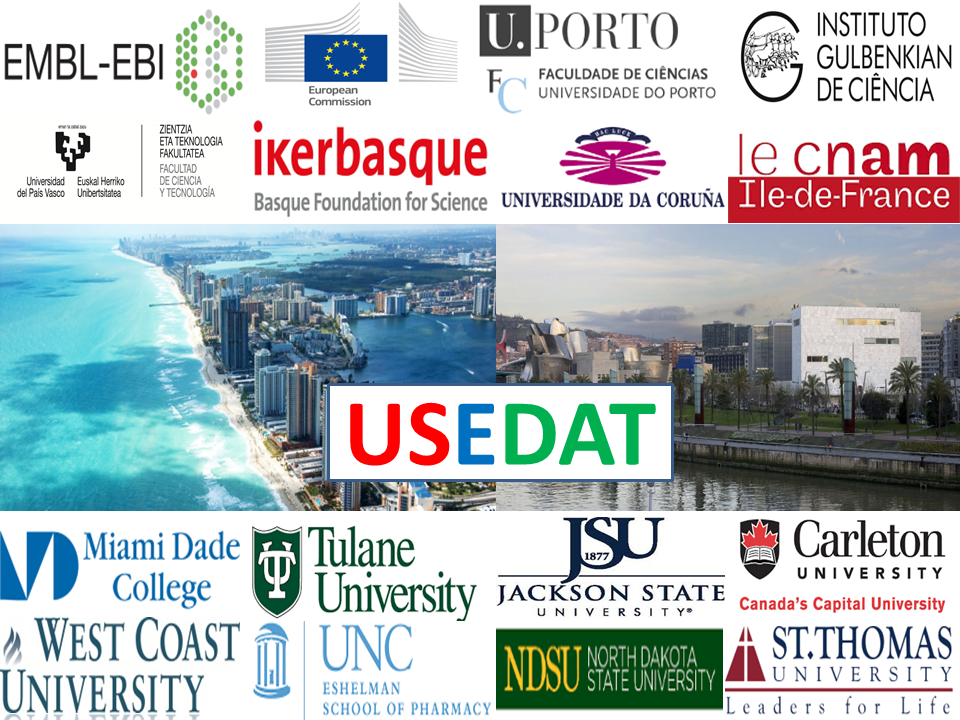
Experimental Data Recording, Computational Data Analysis, Hands-on Training Courses
PhD, MSc, Degree Thesis Tutorship; MSCA Secondments; Summer Internships
USA & Europe Schools, Conferences, Workshops, Enrollment Free of Charge
USEDAT Training & Workshop
The school is directed to researchers and students worldwide. The initiative joins various sister summer schools, workshops, boot camps, hands-on training courses, and/or capstone courses of universities in United States and Europe. This includes courses and research workshops offered/chaired by professors of Miami Dade College (MDC), University of North Carolina at Chapel Hill (UNC), North Dakota State University (NDSU), Jackson State University (JSU), Tulane University New Orleans, Saint Thomas University (STU), and West Coast University (WCU) Miami, in United States and courses/workshops organized by professors / researchers of University of Coruña (UDC) Spain, EMBL-EBI European Bioinformatics Institute, Cambridge, United Kingdom, CNAM, Conservatoire National des Arts et Métiers, Paris, France, University of the Basque Country (UPV/EHU) and Ikerbasque, Basque Foundation for Science, Basque Country, Spain, and other European centers. Please see, download, and share our [USEDAT Flyer] and/or read our editorial paper [USEDAT Editorial.pdf].
Reference: USEDAT: USA-Europe Data Analysis Training Worldwide Program, 2019 ed. Jerzy Leszczynski, David Quesada, Eugene Muratov, Matthew M. Montemore, James Robert Green, Suhbash C. Basak, Bakhtiyor Rasulev, Cristian R Munteanu, Alejandro Pazos, Yasset Perez-Riverol, Gloria Castellano, Maité Sylla, Daniel J.V.A. Do Santos, Natália D. S. Cordeiro, Bairong Shen, Pedro L. Fernandes, Esther Lete, Nuria Sotomayor, Sonia Arrasate, Aliuska Duardo, Humbert Gonzalez-Diaz. MOL2NET-05, International Conference on Multidisciplinary Sciences, ISSN: 2624-5078, MDPI SciForum, Basel, Switzerland, 2019, (1), 1-5, doi: 10.3390/mol2net-05-06254.
The professors and students interested on USEDAT are welcome to submit their research works to be published in USEDAT School Workshop and/or in any other of the MOL2NET workshops associated to the school. For in-site participation contact the coordinators of the different courses or the general coordinator. For participation in the workshops, click submit to send the title and abstract of your communication. After that, wait to receive after approval email. Next, write your communication using the following [USEDAT Template.doc] file to write your communications, after that save a .pdf file and upload. Almost all schools have workshops published by the MOL2NET Conference series (see details at follows). The professors, researchers, and students interested on this workshop are also welcome to participate in the international network of courses offered by USEDAT program. The students of the program can visit one or more of the universities to receive personalized training. It may include introduction to experimental techniques (NMR, EEG, MS, HPLC, 2DGE, etc.) for data acquisition. However, the main focus is on computational algorithms (ML, AI, ANN, SVM, LDA, Deep Learning, SQL, Python, etc.) for data analysis in Chemistry (All), Biotechnology Biotechnology, Nanotechnology, Biomedical Engineering, etc. See all benefits for students and professors bellow.
USEDAT Training Enrollment
Enrollment is free of cost (no fees) for USEDAT hands-on training courses, this include training of Summer school students, training/tutoring of PhD, MSc, and Degree students, training of visiting professors, post-doctoral researchers, sabbatical professors, etc. However, USEDAT students/professors obtain financial support to cover indirect costs (traveling, insurance, living, and other indirect costs) from institutions like MSCA Europe Commission, EMBL-EBI United Kingdom, FCT Portugal, NSF China, COLCIENCIAS Colombia, SENESCYT Ecuador, CONACYT, DELFIN Program México, and PANELFIT H2020 Europe Commision Projects, etc.
USEDAT Training vs. Regular University Courses
USEDAT hands-on training courses, per se, are free of cost. USEDAT training courses are equivalent to summer schools, boot camps, and other forms of complementary teaching. The USEDAT school courses involve hands-on personalized training, seminars, participation in workshops, visit to different centers, PhD, MSc students dissertation tutoring, etc. However, USEDAT training courses must not to be confused with regular teaching courses of university. USEDAT training courses serve as an introduction or introductory gate to some regular PhD, MSc, Capstone courses, of universities of Europe and USA. We help you to contact professors of these programs associated with us.
USEDAT Sponsors
Institutions or projects that have sponsored at least one of our profs, students, or workshops: IKERBASQUE, Basque Foundation for Science (https://www.ikerbasque.net/), MDPI Switzerland, NASA STEM-SPACE Grant P03C1160161, MSCA Europe Commission, FCT Portugal, NSF China, COLCIENCIAS Colombia, SENESCYT Ecuador, CONACYT, DELFIN Program México, and PANELFIT H2020 Europe Commision Project: https://www.researchgate.net/project/PANELFIT-H2020-EU-ProjectLecturers and Collaborating Professors
People listed as collaborators and/or collaborating professors of the USEDAT school project are those who have: [i] acted as lecturer or coordinator of one of the courses; [ii] Acted as chairperson of one of the workshops, [iii] offered institutional and/or hosting support, [iv] acted as tutor and/or have sent at least one student to participate in courses of other centers.
USEDAT Co-Host Chairmen

Prof. Dr. David Quesada, Director of Dept. of Mathematics, SRI Series Founder Chairman
Miami Dade Colege (MDC), Miami, FL, USA.
Email: dquesada@mdc.edu

 Prof. Humbert González-Díaz, IKERBASQUE Professor, Email:mol2net.chair@gmail.com, MOL2NET & USEDAT Founder Chairman
Prof. Humbert González-Díaz, IKERBASQUE Professor, Email:mol2net.chair@gmail.com, MOL2NET & USEDAT Founder Chairman(1) Dept. of Organic Chemistry II, University of the Basque Country UPV/EHU , 48940, Leioa, Biscay, Spain.
(2) IKERBASQUE, Basque Foundation for Science , 48011, Bilbao, Biscay, Spain.
ORCID:https://orcid.org/0000-0002-9392-2797
USEDAT Scientific Committee
USEDAT Professors/Collaborators [North America]:
Prof. Jerzy Leszczynski i,ii,iii,iv, Dir. Interdisc. Cent. for Nanotoxicity (ICN), Jackson State University (JSU), USA.
Prof. Eugene Muratov i,ii, Molec. Model. Lab, Eshelman School of Pharm., Univ. of North Carolina (UNC), Chapell Hill, USA.
Assist. Prof. Matthew M. Montemore i,iii,iv, Chemical and Biomolecular Engineering, Tulane University, New Orleans, USA.
Prof. James Robert Green i,ii,iii,iv, Dept. of Systems and Comput. Eng., Carleton University, Canada.
Dr. Suhbash C. Basak, Natural Resources Research Institute, Univ. of Minnesota, Duluth, MN, USA.
Prof. Maykel Cruz-Monteagudo i,ii,iii,iv, West Coast University (WCU), Miami, USA.
Prof. Bakhtiyor Rasulev i,ii,iii,iv, North Dakota Sate University (NDSU), USA.
Dr. Shameer Khader ii, Dept. Medical Informatics, Northwell Health, NY, USA.
USEDAT Professors/Collaborators [Europe]:
Prof. Humbert Gonzalez-Diaz (USEDAT Coord.)i,ii,iii,iv , Prof. Sonia Arrasate i,ii,iii,iv, Prof. Esther Lete (PhD Coord.)i,ii,iii,
Prof. Nuria Sotomayor (MSc Coord.)i,ii,iii, Prof. Fernando Plazaola (Dean)iii, Prof. Ma. Isabel Moreno (Dir. Dept.)ii,iii,
Dr. Aliuska Duardo (Fac. Law)i,ii,iii,iv, Univ. of The Basque Country (UPV/EHU), Leioa, Basque Country, Spain.
Prof. Cristian R Munteanu i,ii,iii,iv, Prof. Alejandro Pazos i,ii,iii,iv, Dept. Computation, University of Coruña (UDC), Coruña, Spain.
Dr. Yasset Perez-Riverol i,ii, European Bioinformatics Institute (EMBL-EBI), Cambridge, United Kingdom.
Assoc. Prof. Maité Sylla ii , Assoc. Prof. Najla Fourati ii , Assoc. Prof. Chouki Zerrouki ii , CNAM, París, France.
Dr. Irina Moreira i,ii,iii,iv, Center for Neuroscience and Cell Biology (CNC), Universidade de Coimbra, Coimbra, Portugal;
Prof. Gloria Castellano i,ii,iv , (Dept. Dir.) Dept. Exp. Sci. and Mathematics, Catholic Univ. of Valencia (UCV), Spain.
Prof. Francisco Torrens i,ii,iv , Institute of Molecular Science (ICMol), University of Valencia (UV), Valencia, Spain.
Prof. Natália D. S. Cordeiro i,ii,iii,iv, REQUIMTE Theor. Chem. Net., University of Porto (UPORTO), Portugal.
Prof. Pedro L. Fernandes i,ii,iii,iv, Bioinformatics Training Coordinator, Instituto Gulbenkian de Ciencia (IGC), Portugal.
Dr. Daniel J.V.A. Do Santos iv , Faculty of Pharmacy, University of Lisbon (ULISBOA), Portugal.
Prof. Dr. C. Julius Caesar Vargas Burgos, (Univ. Rector)ii,iii,iv, Prof. Amaury Pérez Martínezii,iii, Amazon State Univ. (UEA), Ecuador.
Prof. Eduardo Tejera i,ii,iii,iv, Prof. Yunierkis Perez Castillo i,ii,iii,iv (Bio-Cheminformatics Group), Prof. Vinicio Armijos iii,iv,
MSc. Emilia Vasquez i,ii,iii,iv (Biotechnology), Universidad de Las Americas (UDLA), Quito, Ecuador.
Prof. Marcus T Scotti i,ii,iii, Dir. Cheminformatics Lab., Universidade Federal da Paraíba (UFPB), Brazil.
Dr. Shaoxun Tang iii,iv, Centre of Reg. Agro-Ecology, National Academy of Sciences, Beijing, China.
Prof. Esvieta Tenorio-Borroto i,ii,iii,iv , Universidad Autónoma del Estado de México (UAEM), Mexico.
Prof. Boris Mederos iii,iv, Dept. Phys. and Mathematics, Univ. Autónoma de Ciudad Juárez (UACJ), México.
Prof. Piedad Gañan iii,iv, Dr. Robin Zuluaga iii,iv, Universidad Pontificia Bolivariana, Bogotá, Colombia.
Prof. Ma. Del Rayo Camacho Corona iii,iv, Autonomous University of Nuevo León (UNL), México.
Prof. Ashok. K. Dubey ii, Drug Discov. Lab., Netaji Subhas University of Technology, New Delhi, India.
Prof. Kunal Roy ii, Dept. of Pharmaceutical Technology, Jadavpur University, Kolkata, India.
Assist. Prof. Rajeev K Singla ii, K.R. Mangalam University, Gurgaon, Haryana, India.
Interdisciplinary Center for Nanotoxicity (ICN), Dept. of Chemistry and Biochemistry,
Jackson State University (JSU), USA. Topics: Nanotoxicity, Cheminformatics, Data Analysis
Coordinator: Prof. Jerzy Leszczynski (Director)
Students Contact with Researchers from NASA, University of Miami, Florida International University (FIU).
Coordinator: Prof. David Quesada, Chair of Dept. of Mathematics, MDC, Wolfson Campus,
Last Workshop: https://mol2net-04.sciforum.net/sri-10
Current Workshop: https://mol2net-05.sciforum.net/sri-11
Contact Email: dquesada@mdc.edu
Laboratory for Molecular Modeling, UNC Eshelman School of Pharmacy,
University of North Carolina , Chapel Hill , North Carolina 27599 , United States.
Coordinator: Assoc. Prof. Eugene Muratov, Ph.D., Email: murik@email.unc.edu
USEDAT TULANE Hands-on Training, New Orleans, USA.
Topics: Machine Learning, Computational Chemistry, Cheminformatics
Coordinator: Assist. Prof. Matthew M. Montemore, Chemical and
Biomolecular Engineering, Tulane University, New Orleans, USA.
WCUCW: West Coast University Capstone Workshop, Campus Miami,
Coordinators: Prof. Terace Fletcher and Prof. Maykel Cruz-Monteagudo.
Topics: Machine Learning, Data Analysis, Complex Networks, Systems Biology
Computational Nanosciences, Workshop: https://mol2net-05.sciforum.net/usedat-07
Contact Email: usedat.chair@gmail.com
Coord: Dr. Yasset Pérez-Riverol, EMBL-EBI, Cambridge, United Kingdom.
Coord.: Prof. Pedro L. Fernandez, Inst. Gulbenkian de Ciencia (IGC),
Homepage: http://gtpb.igc.gulbenkian.pt/bicourses/index.html
USEDAT RNASA-IMEDIR UDC Summer School, Coruña, Spain.
IWMEDIC, Rnsa-Imedir, University of Coruña (UDC), Spain.
Coordinators: Prof. Alejandro Pazos, Director Dept. of Computation,
Prof. Cristian Munteanu, Dept. of Comput., FIC, UDC
Last Workshop: https://mol2net-04.sciforum.net/iwmedic-06
Current Workshop: https://mol2net-05.sciforum.net/iwmedic-07
USEDAT IWIMSM-03: Iberoamerican Workshop, Valencia, Spain.
Iberoamericana Interdisc. Métodos, Model. y Simul. Workshop
Coordinators: Prof. Gloria Castellano, Email: gloria.castellano@ucv.es
Dir. Dept. Exp. Sciences and Mathematics, Catholic University of Valencia (UCV), Valencia, Spain.
Prof. Francisco Torrens, Email: Francisco.Torrens@uv.es
Institute of Molecular Science (ICMol), University of Valencia (UV), Valencia, Spain.
Last Workshop: https://mol2net-04.sciforum.net/iwimsm-02
Current Workshop: https://mol2net-05.sciforum.net/iwimsm-03
USEDAT EJIBCE: Structural Computational Biology Training, Portugal, 2019.
Coodinator: Dr. Irina Moreira, E-mail: irina.moreira@cnc.uc.pt
Center for Neuroscience and Cell Biology (CNC), Universidade de Coimbra, Portugal.
Last Workshop: https://mol2net-04.sciforum.net/ejibce-02
Current Workshop: https://mol2net-05.sciforum.net/ejibce-03
USEDAT LAWSCI PANELFIT Summer School, Bilbao, Basque Country, Spain.
LAWSCI PANELFIT H2020 Project Summer School of
Chair of Law and Human Genome, UPV/EHU, Leioa, Bilbao, Spain.
Coordinator: PhD. Aliuska Duardo. H2020 PANELFIT European Project Manager
Last Workshop: https://mol2net-04.sciforum.net/lawsci-02
Current Workshop: https://mol2net-05.sciforum.net/lawsci-03
The topics of the courses vary with the school but overall they are related to three main areas and their overlapping fields involving the technical, legal, and ethic aspects of experimental measurement, collection, storing, retrieval, analysis, and in general use of data:
(0) Experimental methods (NMR, IR, HPLC, MS, EEG, 2DGE, etc.) used in Chemistry, Physics, Nanotechnology, Medicine, etc. to record data susceptible of posterior processing with data analysis techniques
(1) Computational Sciences, ICTs, Machine Learning, Artificial Intelligence, Big Data, Mathematics, Physics tools for Data Analysis and Modelling in science.
(2) Applications of the previous methods to Cheminformatics, Chemistry (All Areas), Nanotechnology, Materials Sciences, Biophysics, Bioinformatics, OMICs, Biotechnology, Biomedical Engineering, Systems Biology, Complex Networks, and Social Networks.
(3) Legal, Regulatory, and Bioethics issues in Machine Learning Applications and/or Bio-molecular sciences, General Data Protection Regulation (GDPR) in research, Patenting of Drugs, Genome, Materials, and Copyright protection of Scientific software.
Benefits for Students
(0) Receiving training in Data Analysis, Machine Learning, Artificial Intelligence, Cheminformatics, Complex Networks, etc.
(1) Development of a Personalized Research Project to study Experimental Results of Student Thesis and/or Public Data sets.
(2) Publication of papers in a JCR-Indexed Journals, projects results are submitted to publication at the end of the course.
(3) Publication of communications in MOL2NET Workshops in Miami Dade College, Univ. of Minnesota, NCU Chapell-Hill, USA; CNAM, Paris, France; UDC Coruña, Spain, etc.
(4) Exploration of possible MSc/PhD topics for MSc/Degree Students.
USEDAT Students Academic Profile
Profs., Researchers, Graduated, and undergraduate students from Physics (Applied), Chemistry (All areas), Biology, Medicine, Biotechnology, Bioinformatics, Nanosciences, Polymer and Material Sciences, Biomedical Engineering, Computational Sciences, etc.
USEDAT School Courses Duration
Duration varies in different universities. Typical duration is: Sabbatical Profs., Post-Doc, and PhD Students (1 moth and upto 1 year), MSc Students (upto 2 months), Degree of Students (upto 4 months), Undergraduated and Capstone Course Students (variable), Delfin Program Students (1-2 months).
USEDAT Attendance Certificates
- USEDAT UNC, MDC, WCU, UFPB, UDC, etc. Attendance Certificate, signed by school coordinators
- MOL2NET Conference Workshops Attendance Cert, signed by chairperson.
- UPV/EHU ZTF-FCT Faculty Research Stay Attendance Cert. signed by dean.
- UPV/EHU Dept. Research Stay Attendance Letter, signed by dept. directors.
- CONACYT Internship Certificate (Delfin program students), signed by coord.
USEDAT Professors Benefits
(0) Teach/Sent out their students to be trained in Data Analysis, Machine Learning, Artificial Intelligence, Cheminformatics, Complex Networks, and Statistics, in aborad universities in USA and/or Europe.
(1) Development of a Personalized Research Project to study Experimental Results of experimental projects in multiple areas.
(2) Publication of papers in a JCR-Indexed Journals, projects results are submitted to publication at the end of the course.
(3) Publication of communications in MOL2NET Workshops in Miami Dade College, Univ. of Minnesota, NCU Chapell-Hill, USA; CNAM, Paris, France; UDC Coruña, Spain, etc.
(4) Exploration of possible co-direction (co-supervising) of MSc/PhD Thesis in UPV/EHU or UDC universities for professors from abroad who sent students to the school . Including thesis dissertation only in UDC/UPV/EHU or co-tutelle thesis with double dissertation and title.
USEDAT Assoc. Conf. and Workshops
All students are invited to publish (open access and free of cost) their own short review papers and research communications with the results of their personal summer school training projects in different workshops in USA, Spain, Portugal, France, Brazil, etc. of the conference: MOL2NET, International Conference Series, MDPI SciForum, ISSN: 2624-5078, Basel, Switzerland, 2019.
Director CREST Interdisciplinary Center for Nanotoxicity (ICN),
Jackson State University (JSU), Jackson, USA.
Laboratory for Molecular Modeling, UNC Eshelman School of Pharmacy,
University of North Carolina , Chapel Hill , North Carolina 27599 , United States.
Email: murik@email.unc.edu
Prof. David Quesada
Director of Dept. of Mathematics,
Miami Dade Colege (MDC), Miami, FL, USA.
Email: dquesada@mdc.edu
Prof. Cristian Robert Munteanu
Ph.D., Assoc. Prof. of Dept of Computation
Faculty of Computer Sciences,
University of Coruña (UDC), Coruña, Spain.
Prof. Alejandro Pazos,
Ph.D., M.D., Chair Prof. of Dept of Computation
Faculty of Computer Sciences,
University of Coruña (UDC), Coruña, Spain.
Prof. Maykel Cruz-Monteagudo,
Education Specialist, West Coast University, Miami Campus, FL, USA.
Email: mCruz@westcoastuniversity.edu
Prof. Terace Fletcher
Academic Dean and Professor, West Coast University, Miami Campus, FL, USA.
Email: teFletcher@westcoastuniversity.edu
Prof. Sonia Arrasate
Department of Organic Chemistry II,
University of Basque Country (UPV/EHU), Leioa, Sarriena w/n, Bizkaia.
Dr. Aliuska Duardo-Sanchez
Ph.D. Legal Informatics, Chair in Law & The Human Genome Research Group,
Faculty of Law, University of The Basque Country UPV/EHU, Leioa (Bilbao),
Biscay, PANELFIT H2020, Project Manager & EDC Board Coordinator, Europe Commission.
USEDAT Chairperson
Prof. Humbert González-Díaz, IKERBASQUE Professor,  https://orcid.org/0000-0002-9392-2797, Email: usedat.chair@gmail.com
https://orcid.org/0000-0002-9392-2797, Email: usedat.chair@gmail.com
(1) Department of Organic Chemistry II, University of the Basque Country UPV/EHU , 48940, Leioa, Biscay, Spain.
(2) IKERBASQUE, Basque Foundation for Science , 48011, Bilbao, Biscay, Spain.
Congress Chair
Prof. Dr. Humbert González-Díaz, UPV/EHU, Dept. of Org. Chem. II, Bilbao, Spain.
02. USINEWS-03: US-IN-EU Worldwide Science Workshop Series, UMN, Duluth, USA, 2019

[MOL2NET 2015] [MOL2NET 2016] [MOL2NET 2017] [FACEBOOK (>10K followers)]
[Welcome Videos] [官话] [हिन्दी] [Euskera] [Castellano] [Português] [Français]

(5) Follow the link in the email or login to upload paper (doc and pdf format) until 2018-Dec-20
(6) Login to post comments, questions, or answers in a section or in one of the MOL2NET workshops (2018-Dec-20 to Dec-25)
Dr. Suhbash C. Basak, Natural Resources Research Institute, Duluth, MN, USA.
Prof. Ashok. K. Dubey, Drug Discovery Laboratory,
Division of Biological Sciences and Engineering,
Netaji Subhas University of Technology, New Delhi, India..
Prof. Kunal Roy, Dept. of Pharmaceutical Technology,
Jadavpur University, Kolkata, India.
Prof. Natalia D.S. Cordeiro, Dept. of Chem. & Biochem.,
University of Porto, Porto, Portugal.
Dr. Shameer Khader, Department of Medical Informatics and
Research Informatics, Northwell Health, NY, USA.
Prof. Rajeev K Singla (M.Pharm), Assist. Prof., School of Medical and Allied Sciences
SMAS, K.R. Mangalam University, Gurgaon, Haryana, India.
K.R. Mangalam University, Gurugram, India.
Prof. Saahil Arora, School of Medical and Allied Sciences,
K.R. Mangalam University, Gurugram, India.
Manipal Academy of Higher Education (MAHE), Karnataka, India.
Università degli Studi di Messina, Italy; AOAC ERPs; SpringerBrief Series Editor.
Anurag Group of Institutions, Venkatapur, Ghatkesar, India.
Prof. Kirtan Dave, Center for Interdisciplinary Studies in Science and Technology, Sardar Patel University, India.
Prof. Nitin Sapre, Shri Govindram Seksaria Institute of Technology and Science, Indore, India.
Dr. Girinath G. Pillai, Zastra Innovations, Bengaluru, Karnataka, India.
Prof. González-Díaz H., IKERBASQUE Professor, Email: mol2net.chair@gmail.com
(1) Department of Organic Chemistry II, University of the Basque Country UPV/EHU , 48940, Leioa, Biscay, Spain.
(2) IKERBASQUE, Basque Foundation for Science , 48011, Bilbao, Biscay, Spain.
Publication Advisory Chairman Assistant
Dr. Aliuska Duardo-Sanchez (Law.Lic., Ph.D. TICs & Legal Sciences)
PANELFIT European Commission Project Manager
Research Group: Chair in Law and The Human Genome,
Dept .of Public Law, University of Basque Country (UPV/EHU),
Campus Biscay, Leioa 48940, Spain.
Congress Chair
Prof. Dr. Rajeev K Singla, Assist. Prof., SMAS, K.R. Mangalam University, Gurgaon, Haryana, India.
03. NICEXSM-05: North-Ibero-American Congress on Exp. and Simul. Methods, Valencia, Bilbao, Spain-Miami, USA, 2019

Welcome Message
We are glad to invite all colleagues worldwide to participate on a new edition of the workshop NICEXSM-05: North-Ibero-American Congress on EXperimental and Simulation Methods, Valencia, Bilbao, Spain - Miami, USA, 2019. The workshop publish totally free of charge communications in multidisciplinary sciences involving experimental and/or computational methods. The field of application include, but are not limited to, Biomolecular, Biomedical, Materials, Environmental, Trade, Learning, Education, and Social sciences in general (see scope section). This is an inter-university transatlantic joint workshop co-chaired by USA and Europe institutions. In first instance, the founder chairs are professors of the Institute of Molecular Science (ICMol), University of Valencia (UV), and the Catholic University of Valencia (UCV), Valencia, Spain. From the America's side the workshop is co-hosted by professors of Department of Mathematics Miami Dade College (MDC) and Department of Chemistry and Biomolecular Engineering, Tulane University (TULANE), New Orleans, USA.
More recently, the workshop is being co-hosted by researchers of the Basque Center for Biophysics (BIOFISKA), Basque Country, Spain. In this sense, from this year the workshop is also publishing the covers and links to talks presented on the JournalCLubBiofisika. This is an experts panel celebrated in the previous center and running both in-person and on-line. This journal club is focused on the exposition by a panelist and posterior brain-storming discussion of previous papers published by different authors worldwide.
All in all, the workshop is associated to the MOL2NET International Conference Series on Multidisciplinary Sciences. MOL2NET (From Molecules to Networks) series is running this year MOL2NET-2020, International Conference on Multidisciplinary Sciences, ISSN: 2624-5078, MDPI SciForum, Basel, Switzerland, 2020. Consequently, it is co-chaired and promoted as well by researchers of the University of The Basque Country (UPV/EHU) and IKERBASQUE, Basque Foundation for Science, Bilbao, Basque Country.
Working Languages
English is the main working language of the workshop. However, as a North-Ibero-American inclusive conference the workshop aims to accept papers to be published in multiple languages spoken on the countries, states, and communities of the entire North-Ibero-American area of influence. It involve, but is not limited to: México, Brazil, Spain, Portugal, USA, Canada, Chile, Ecuador, Basque Country, Catalunya, Valencia, Galicia, etc. Consequently, we accept papers on the following languages: English, Spanish, Portuguese, French, Basque (Euskera), Catalá / Valenciano, and Galego. We also accept bi-lingual posters in two-column format, e.g, English-Basque, English-Spanish, English-Portuguese, Spanish-Galego, etc.
Scope and Target Audience
Last, not the least, the workshop deals with all the Legal, Regulatory, and Bioethics issues emerging from the use of both experimental and modelling and simulation methods in the previous areas. This include, Drug, Gene, Protein, Vaccine, Biomarkers, and Biomaterials patentability, Personalized Medicine and Personal Data Protection, Cybersecurity, Cryptocurrency Mining, Data Protection in Personal Image Processing, Software and Models Copyrights, etc.
Abstract preparation and submission
We strongly recommend you to read carefully the notes to participants at the following page [Instructions to authors] about publication model, copyright, authors responsibilities, etc. Submit your communications in two steps, first submit your title, authors, and abstract. Next, upload your communication after abstract approval.
Steps for Participation
(0) Register, Sign in/Login, to Sciforum platform [Sciforum login] (All the year)
(1) Submit the title and abstract, select a section or workshop (do not upload paper here) [Submit New Abstract] (until Dec-15)
(2) Wait for Sciforum abstract acceptance email, follow the link, and/or login to upload paper, doc and pdf format (until Dec-15)
(3) Download template doc and prepare your communication [IWIMSM Template File.doc] (until Dec-15)
(4) Wait for paper acceptance and publication emails (follow link to proofread your paper) (Asap after upload)
(5) Communicate with chairpersons if corrections are necessary, including past editions (All the year)
(6) Log in to post comments, questions, or answers in a section or one of the workshops (Dec-15 to Dec-20)
(7) Contact chairpersons if you need author (publication) or attendance (posting) certificate for conference and/or workshops (All the year)
Honor Scientific Committee (Chairpersons)
Prof. Gloria Castellano, Email: gloria.castellano@ucv.es
Director of Department of Experimental Sciences and Mathematics,
Catholic University of Valencia (UCV), Valencia, Spain.
Editor of NEREIS, ISSN: 1888-8550, Revista Iberoamericana
Interdisciplinar de Métodos, Modelización y Simulación
Prof. Francisco Torrens, Email: Francisco.Torrens@uv.es
Institute of Molecular Science (ICMol),
University of Valencia (UV), Valencia, Spain.
Prof. David Quesada, Email: dquesada@mdc.edu
Director of Dept. of Mathematics,
Miami Dade Colege (MDC), Miami, FL, USA.
Prof. Matthew M. Montemore,
Department of Chemistry & Biomolecular Engineering,
Tulane University, New Orleans, Louisiana, USA.
Prof. Jose L Medina-Franco,
National Autonomous University of Mexico (UNAM), México.
Fellow of The Royal Society of Chemistry, United Kingdom.
Prof. Alvaro Villaroel, (Biofisika Journal Club coordinator)
Researcher Spanish National Research Council (CSIC), Basque Center for Biophysics,
University of The Basque Country, Leioa, Basque Country, Spain.
Scientific Committee
Prof. Gloria Castellano, Dir. Dept. of Exp. Sci. and Math., Catholic University of Valencia (UCV), Valencia, Spain.
Prof. Francisco Torrens, Inst. of Molecular Science (ICMol), Univ. of Valencia (UV), Valencia, Spain.
Prof. James Robert Green, Dept. of Systems and Comput. Eng., Carleton University, Canada.
Prof. Jorge Gálvez, Dept. of Physical Chemistry, Faculty of Pharmacy, University of Valencia, Spain.
Prof. Ramon García-Domenech, Dept. of Physical Chemistry, Faculty of Pharmacy, University of Valencia, Spain.
Prof. Oscar M. Rivera Borroto, Mathematics, Houston Community College, Houston, TX, USA.
Prof. Natalia D.S. Cordeiro, Department of Chemistry and Biochemistry, University of Porto, Porto, Portugal.
Prof. Enrique Onieva, DEUSTOTECH Institute, University of Deusto, Bilbao, Spain.
Prof. Carlos Velazquez Martinez, Faculty of Pharmacy & Pharmaceutical Sciences, University of Alberta, Canada.
Prof. Facundo Pérez Giménez, Department of Physical Chemistry, Faculty of Pharmacy, University of Valencia, Spain.
Dr. Carlos Polanco González, Dept. of Mathematics, Universidad Nacional Autonoma de México (UNAM), México.
Prof. Jesus V. De Julián Ortiz, Department of Physical Chemistry, University of Valencia, Spain.
Dr. Guillermin Agüero, CIIMAR/CIMAR, University of Porto, Portugal.
Dr. Maria Galvez-Llompart, Department of Physical Chemistry, Faculty of Pharmacy, University of Valencia, Spain.
Dr. Riccardo Zanni, Department of Physical Chemistry, Faculty of Pharmacy, University of Valencia, Spain.
Prof. Alejandro Pazos, Ph.D., M.D., Director of Department of Computation, University of Coruña (UDC), Coruña, Spain.
Prof. Cristian R. Munteanu, Department of Computation, University of Coruña (UDC), A Coruña, Spain.
Prof. Juan M. Ruso, Dept. of Applied Physics, University of Santiago de Compostela (USC), Spain.
Dr. Jose Correa Basurto, Escuela Superior de Medicina, IPN, México.
Prof. Aleksey E. Kuznetsov, Universidad Técnica Federico Santa María, Santiago, Chile.
PhD. Gisselle Pérez-Machado, EPIDISEASE S.L. CIBERER, Valencia, Spain.
Prof. Carolina Horta Andrade, Universidade Federal de Goias, Setor Leste Universitario, Goiania, Brazil.
Prof. Yovani Marrero-Ponce, University San Francisco de Quito, Cumbayá, Quito, Ecuador.
Dr. Guillermin Agüero, CIIMAR, Interdisc. Centre of Marine and Environ. Research, Univ. of Porto, Portugal.
Prof. Eduardo Tejera, Bio-Cheminformatics, Universidad de Las Americas (UDLA), Quito, Ecuador.
Dr. Fabien Plisson. CINVESTAV- UGA-LAENGEBIO Mexico.
Honor Advisory Chairman
Prof. Humberto González-Díaz H., IKERBASQUE Professor, Email: mol2net.chair@gmail.com
(1) Department of Organic and Inorganic Chemistry and Basque Centre for Biophysics,
University of the Basque Country UPV/EHU , 48940, Leioa, Biscay, Spain.
(2) IKERBASQUE, Basque Foundation for Science , 48011, Bilbao, Biscay, Spain.
ICTs & Regulatory Affairs Chairperson
Dr. Aliuska Duardo-Sanchez (Law.Lic., Ph.D. TICs & Legal Sciences),
Chair in Law & The Human Genome Research Group, Faculty of Law,
University of The Basque Country UPV/EHU, Leioa (Bilbao), Biscay,
PANELFIT H2020, Project Manager & EDC Board Coordinator, Europe Commission.
Congress Chairs
Prof. Dr. Gloria Castellano, Director of Department of Experimental Sciences and Mathematics, Catholic University of Valencia (UCV), Valencia, Spain. Editor of NEREIS, ISSN: 1888-8550, Revista Iberoamericana Interdisciplinar de Métodos, Modelización y Simulación
Prof. Dr. Francisco Torrens, Institute of Molecular Science (ICMol), University of Valencia (UV), Valencia, Spain.
04. ICWM-01: I International Conference and Workshop: Microbiota, UDC, Coruña, Spain, 2019
I International Conference and Workshop Microbiota: What´s cooking?
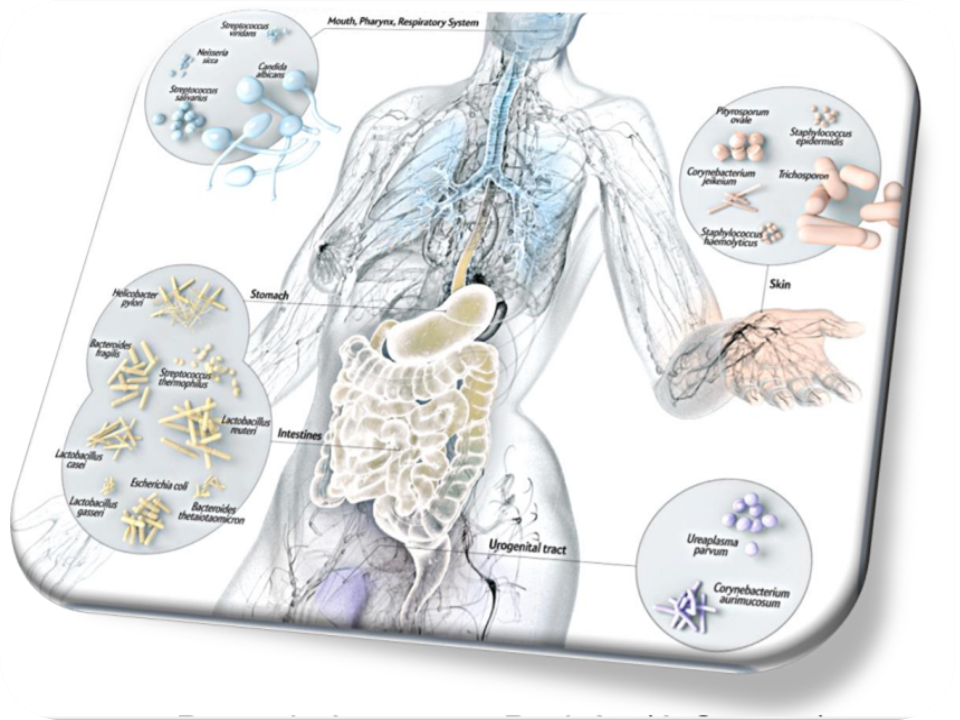
Pazo de Lestrove, Padrón (A Coruña), October 10, 2019

In our organism, we are living with an estimated population of approximately 100 trillion microorganisms, known as microbiota. It is distributed in the most diverse locations of our economy: digestive tract, respiratory system, urinary system, skin, buccalpharyngeal cavity, etc. Its composition is supposed to be specific and individualized for each individual, conforming amiscellaneous population constituted by diverse and multiple different families of viruses, bacteria, fungi, arches and even protozoa and other animal and vegetable families. Scientific and clinical research, in recent years, has turned his attention on the crucial importance that this biological diversity could have in basic processes for our health. The microbiota seems to have evolved with our species for millions of years, collaborating in shaping us to reach what we are now and will accompany us in the future in the future of our existence. In addition to the important beneficial role that the microbiota plays in the functioning of our organism in a state of health, it has recently been discovered that some of its components may be involved in a wide range of systemic pathologies.
This meeting aims to raise awareness of the importance of further research on this crucial subject and to present a state of the question of existing knowledge about the microbiota, and the microbiome, understood as the set of genes that make up the microbiota in the most varied clinical areas in which clinical evidence has recently been found of its influence on the etiopathology of the same.
In the development of the conference will participate recognized specialists grouped in 3 perspectives: scientific, clinical and technological. We intend that the conference constitutes a pioneering multidisciplinary meeting point that serves as a focus of inspiration for research actions that generate new protocols of care action, including the creation of patents on diagnostic devices, prognosis, therapy, control and care monitoring. The ultimate objective would be to do our bit to improve the quality of care and increase the sustainability of the Public Health System. The broadly multidisciplinary component, together with the support of the Galician Universities and the industry that may be related and interested in the subject, we hope that they will be sufficiently attractive for clinicians, researchers, those responsible for health administration and companies.
Workshop Schedule
9:00 – 9:15h Reception of attendees
09:15- 9:30 Welcome words: Presidente de la Xunta/ Conselleiro
9:30 – 10:00h Inaugural speech: Microbiota: What’s cooking
Dr. Benito Regueiro, USC Medical Microbiology Professor. Head of microbiome unit Álvaro Cunqueiro Hospital
10.00 : 11.30h Scientific bases
10:00 - 10:15h Microbiota in infectious diseases
Dr. Enrique Miguez, Head of the infectious diseases section, University Hospital Complex of A Coruña
10:15 – 10:30h Microbioma and implications in human health
Dra. Ángel Carracedo, Professor of Legal Medicine USC. Director of the FPGMX
10:30 - 10:45h Developing drugs to improve Microbiota
Dra. Mabel Loza , Professor of Pharmacology USC. Scientific Director Kaertor Foundation
10:45 – 11:00h Oral hygiene might prevent cancer
Dr. Óscar Cordero Assoc. Professor of Biochemistry and Molecular Biology, USC
11:00 – 11:15h The Human Microbiome: Which is normal and pathological?
Dr. German Bou, Head of Microbiology Service, University Hospital Complex of A Coruña
11:15 – 11:30h Food and microbiota. Do we know anything?
Dr. Alberto Cépeda, Professor Nutrition and Bromatology, USC
11:30 - 12:00h Networking
12:00 – 14:00h Oncological and Digestive Inflammatory Disease Area
12.00 : 12.15h Inflammatory bowel disease in relationship with gut microbiota
Dr. Javier Castro Alvariño, Head of Digestive Service Hospital Complex of Ferrol
12:15 -12:30h Colorectal cancer
Dr. Jose Luis Ulla-Rocha, Digestive area specialist, University Hospital Complex of Pontevedra
12:30 - 13:00h Lung cancer
Dr. Luís Antón Aparicio, Head of Oncology Service, University Hospital Complex of A Coruña
13:00 – 13:30 h Genito-urinary cancer
Dr. Sergio Vázquez, Head of Oncology Service, Lucus Augusti University Hospital, Lugo
13:30 – 13:45h Microbiome promotes pancreatic cancer?
Dr. Luis Leon / Paula Peleteiro, Specialist in the Oncology area, University Hospital Complex of Santiago
13:45 -14:00h Prostate and bladder cancer, microbiota implications
Dr. Juan Dacal, Specialist in the area of Urology, University Hospital Complex of Pontevedra
14:00 - 15:30h Networking
15.30 : 18.15h Other related pathologies
15:30 – 15:45h Obesity and diabetes
Dr. Roberto Peinó, Head of the endocrine unit, University Hospital Complex of Santiago de Compostela
15:45 -16:00 h Neurology, Aging and longevity
Dra. Mar Castellanos, Head of neurology service, University Hospital Complex of A Coruña
16:00 – 16:15h Multiple sclerosis and microbiota
Dr. Jose Mª Prieto, Head of the Neurology Service of the University Hospital Complex of Santiago de Compostela.
16:15 – 16:30h Psychiatry
Dr. Antonio Marques, Mental Health Specialist, University of Porto
16:30 - 16:45h Making guts heart. Haciendo de tripas corazón.
Dr. Guillermo Aldama, Specialist in cardiology area, University Hospital Complex of A Coruña
16:45 – 17:00h Dermatology
Dr. Hugo Vázquez, Head of Dermatology Service, University Hospital Complex of Santiago de Compostela
17:00 - 17:15h Reumathology
Dr. Francisco Blanco, Rheumatology Specialist, CHUAC; UDC; INIBIC Scientific Director; SR Foundation Scientific Advisory
17:15 – 17:30h Role of Microbiota in Clinical manifestation and treatment of Rheumatic Diseases
Dr. Javier de Toro, Head of Rheumatology Service, University Hospital Complex of A Coruña
17:30 - 17:45h Pediatrics
Dr. Alfonso Solar, Head of Pediatric Gastroenterology Unit, University Hospital Complex of A Coruña
17:45 – 18:00h Intestinal Microbiota and Chronic Kidney Disease
Dr. Rafael Alonso Valente, Head of Domiciliary Dialysis Unit of the University Hospital Complex of Santiago de Compostela
18:00 – 18:15 h Traumatology: Bone strength and the microbiome
Dr. Jose R Caeiro Rey, Head of department for orthopedic surgery and traumatology, University Hospital Complex of Santiago de Compostela
18:15 – 18:30h Networking
18:30 – 19:45h Technological solutions
18.30 : 18.45h Data driven in microbiota analysis
Dr. Victor Maojo, Professor of the CC area. Computation and Artificial Intelligence, Polytechnic University of Madrid
18.45 : 19.00 h Towards programmable antibiotics and in silico microbiota
Dr. Alfonso Rodríguez Patón, Professor of the CC area. Computation and Artificial Intelligence, UPM
19.00 : 19.15h Artificial Intelligence to microbiota interpretation
Dr. Alejandro Pazos, Professor of the CC area. Computation and Artificial Intelligence, University of A Coruña
19.15 : 19.30h IT Platforms for microbiota analysis
Dr. Guillermo Vázquez, Deputy Director of EOXI information systems
19.30 : 19.45h Sintetic biology to microbiota analysis
Dr. César de la Fuente, Presidential Assistant professor Pennsylvania University, USA.
19:45 – 20:00h Relator and Ethical and legal aspects
Prof. Dr. Carlos María Romeo Casabona, Full Professor University, Director of Research Group: Chair in Law and The Human Genome, Department of Public Law, University of Basque Country (UPV/EHU), Faculty of Law, Campus Biscay, Leioa 48940, Spain. Member of The European Group on Ethics in Science and New Technologies (EGE), Brussels, Belgium. Member of The Council of Europe Steering Committee on Bioethics (CDBI), Strasbourg, France. PANELFIT H2020, Project Coordinator.
20:00 – 22:00 Parallel Workshops
WS1: Artificial Intelligence Workshops oriented to Microbiota data
Dr. Adrián Carballal, Dr. Francisco Cedrón Santaeufemia, Dr.Carlos Fernández, Dr.Marcos Gestal Pose
Dr. Cristian Munteanu , Dr. Daniel Rivero Cebrián, Dr. Enrique Fernández Blanco (RNASA-IMEDIR Group, UDC)
WS2: Nutritional Health Diet in Microbiota repair
Dr. Ana B Porto Pazos, Dr. Alejandra Cardelle, Dr. Cristina Fente, D. Jose Liñares Blanco
Scientific Committee
Dr. Benito Regueiro
Dr. Jose Luis Ulla Rocha
Dr. Alejandro Pazos Sierra
Dr. Jose Manuel Vázquez
Dr. Francisco Blanco
Dr. Javier Maestro
Dr. Humbert González-Díaz
Organizing Committee
Dra. Ana Belén Porto Pazos
Dr. Cristian R. Munteanu
Dr. Francisco Cedrón
Dr. Jesús Fraiz Calvo
Dra. Aliuska Duardo
D. José Liñares Blanco
Dña. Candela Rodríguez Suárez
MDPI-GALMICROBIOTA Committee Special Issuees
In parallel, the members of GALMICROBIOTA workshop series committee have been/are organizing special issues for different journals of the editorial MDPI (http://www.mdpi.com/). Some special issues arenow in call for papers, submissions are welcome a posteriori, in parallel, or totally independently from the conference. Manuscripts should be submitted online at MDPI (http://www.mdpi.com/) by registering and logging in to this website. In order to send a proposal of associated workshop and/or special issue contact the chairperson of the MOL2NET conference Prof. Humbert Gonzalez-Diaz. IKERBASQUE Prof., University of the Basque Country (UPV/EHU), Biscay,Basque Country, Spain. Email: mol2net.chair@gmail.com. Please, check the following list of past and present special issues associated to our conference:




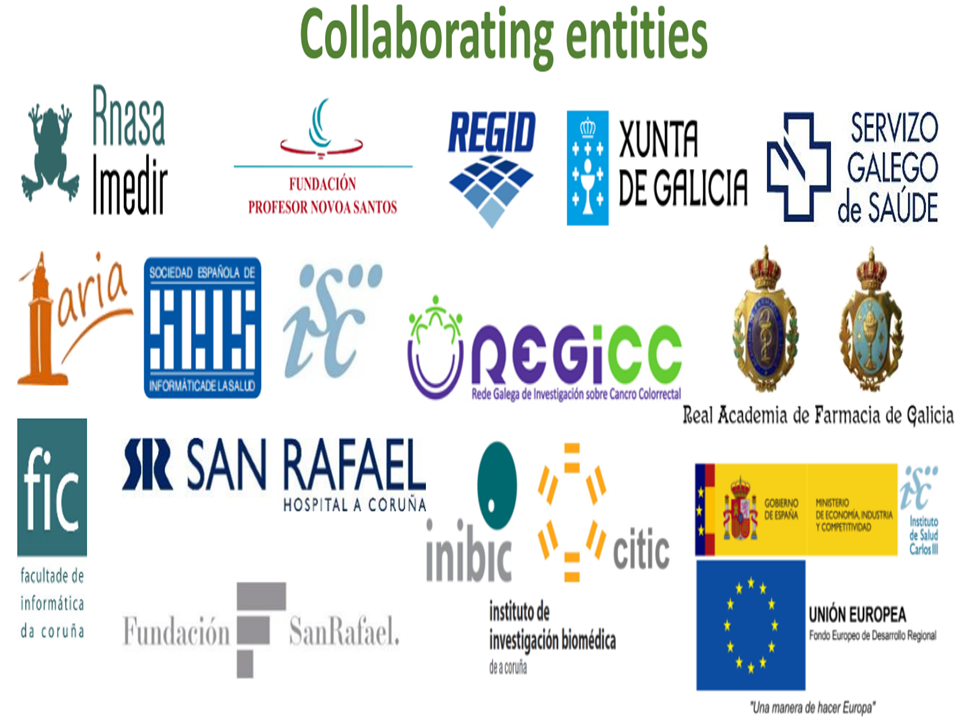
05. CHEMBIOINFO-05: Chem-Bioinformatics Congress München, Germany-Chapell Hill, USA, 2019

This workshop series welcomes specially professors, researchers and students from both universities UFPB, Paraiba, Brazil, and UNC Chape Hill, United States. However, we are open to receive contributions and committee members from all centers world around. The workshop is expected to run both in person and/or online. Participation in all modalities is not mandatory. In person presentations may include workshops, seminars, meetings with face-to-face discussion at both universities. These seminars may be complemented with online teleconferences (Skype, Voip, etc.) of members of the other campus. At the end of the day, all presentations will be published in one online platform. In so doing, this workshop will be hosted online by the MOL2NET conference series. It means, that all communications will be published online at Sciforum platform. All presentations will be published in open access totally free of cost and a DOI number will be assigned. The platform also includes the possibility of online comments from researchers of both universities and colleagues worldwide as well. At the end of the year all contributions will be published in the Proceedings Book of the MOL2NET-05, International Conference on Multidisciplinary Sciences, ISSN: 2624-5078, MDPI SciForum, Basel, Switzerland, 2019.
Steps for Publication
(5) Follow the link in the email or login to upload paper (doc and pdf format)
(6) Login to post comments, questions, or answers in a section or in one of the MOL2NET workshops
The professors, researchers, and students interested on this workshop are also welcome to participate in the international network USEDAT: USA-Europe Data Analysis Training Summer School. USEDAT is a Multi-center Trans-Atlantic initiative offering hands-on training in Data Analysis, Machine Learning, Bioinformatics, Cheminformatics, etc., directed to researchers and students worldwide. The initiative joins various sister summer schools, workshops, boot camps, hands-on training courses, and/or capstone courses involving Miami Dade College (MDC), Saint Thomas University (STU), and West Coast University (WCU) Miami, University of Coruña (UDC), University of the Basque Country (UPV/EHU), Ikerbasque, Basque Foundation for Science, and other centers. Almost all USEDAT schools have one workshop published by the MOL2NET Conference series.
UNC Chapel Hill Chairperson
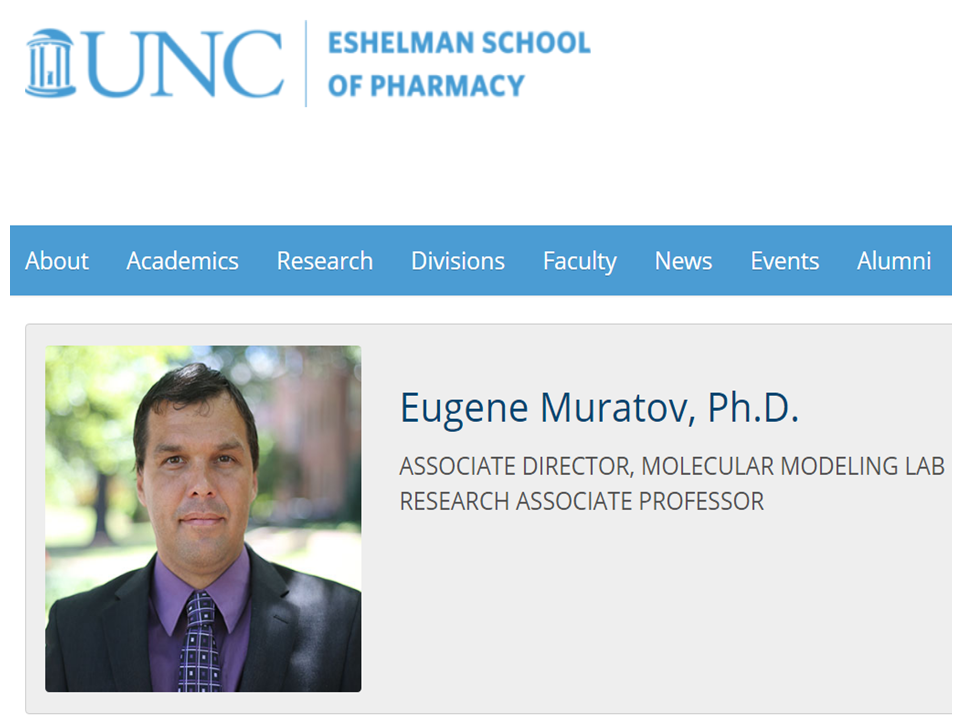
Assoc. Prof. Eugene Muratov, Ph.D., Email: murik@email.unc.edu
Laboratory for Molecular Modeling, UNC Eshelman School of Pharmacy,
University of North Carolina , Chapel Hill , North Carolina 27599 , United States.

Dr. Igor Tetko, Inst. of Struct. Biol., Helmholtz Zentrum München - German Research Center for Environmental Health (GmbH), Neuherberg, Germany. Email: i.tetko@helmholtz-muenchen.de
 Dr. Yasset Perez-Riverol, European Bioinformatics Institute(EMBL-EBI), Cambridge, United Kingdom.
Dr. Yasset Perez-Riverol, European Bioinformatics Institute(EMBL-EBI), Cambridge, United Kingdom.
 Prof. Humbert González-Díaz, IKERBASQUE Professor, Email: mol2net.chair@gmail.com, MOL2NET & USEDAT Founder Chairman
Prof. Humbert González-Díaz, IKERBASQUE Professor, Email: mol2net.chair@gmail.com, MOL2NET & USEDAT Founder Chairman
(1) Dept. of Organic Chemistry II, University of the Basque Country UPV/EHU , 48940, Leioa, Biscay, Spain.
(2) IKERBASQUE, Basque Foundation for Science , 48011, Bilbao, Biscay, Spain.
ORCID: https://orcid.org/0000-0002-9392-2797
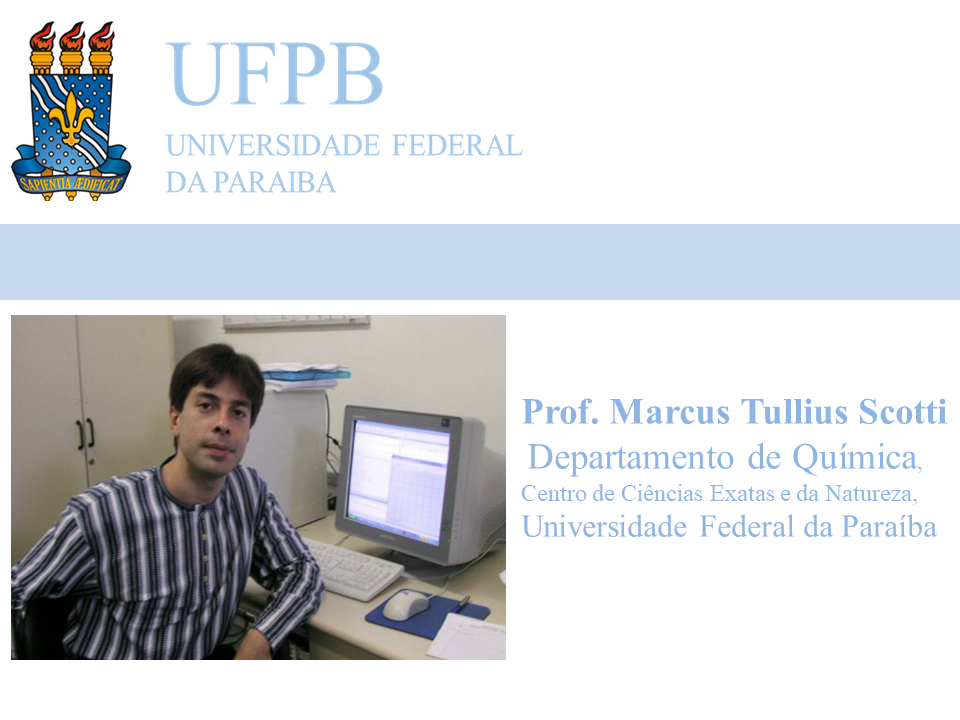
(Coordenador Docente), Dept. de Química, Centro de Ciências Exatas e da Natureza,
Universidade Federal da Paraíba - Campus I, Cidade Universitária,
CEP: 58.051-900 João Pessoa - Paraíba - Brasil
Scientific Committee
Prof. Luciana Scotti, Hospital Universitário, Universidade Federal da Paraíba
Campus I, Cidade Universitária, CEP: 58.051-900, João Pessoa - Paraíba - Brasil.
Publication Advisory Chairman
Prof. González-Díaz H., IKERBASQUE Professor, Email: mol2net.chair@gmail.com
(1) Department of Organic Chemistry II, University of the Basque Country UPV/EHU , 48940, Leioa, Biscay, Spain.
(2) IKERBASQUE, Basque Foundation for Science , 48011, Bilbao, Biscay, Spain.
Congress Chairs
Prof. Dr. Marcus Tullius Scotti, Dept. de Química, Centro de Ciências Exatas e da Natureza, Universidade Federal da Paraíba - Campus I, Cidade Universitária, CEP: 58.051-900 João Pessoa - Paraíba - Brasil
Prof. Dr. Eugene N. Muratov, Laboratory for Molecular Modeling, UNC Eshelman School of Pharmacy, University of North Carolina , Chapel Hill , North Carolina 27599 , United States
06. NANOMATJND-05: JSU-NDSU Nanotech. & Materials Science Workshop, Jackson & Fargo, USA, 2019

Nanomaterials (Published):Special issue entitled: Experimental Nanosciences, Computational Chemistry, and Data Analysis. Journal Nanomaterials (ISSN 2079-4991), JCR IF = 3.55. Editors: Prof. González-Díaz H, UPV/EHU, Spain, Prof. B. Rasulev , NDSU, USA,Dr. Shameer Khader, Philips, Cambridge, MA, USA, Prof. H. Kušić, UZ, Croatia.

Prof. Bakhtiyor Rasulev, Department of Coatings and Polymeric Material, North Dakota State University (NDSU), Fargo, USA.
President of MOL2NET Scientific Committee for Polymers & Materials Sciences.
Honor Chairperson
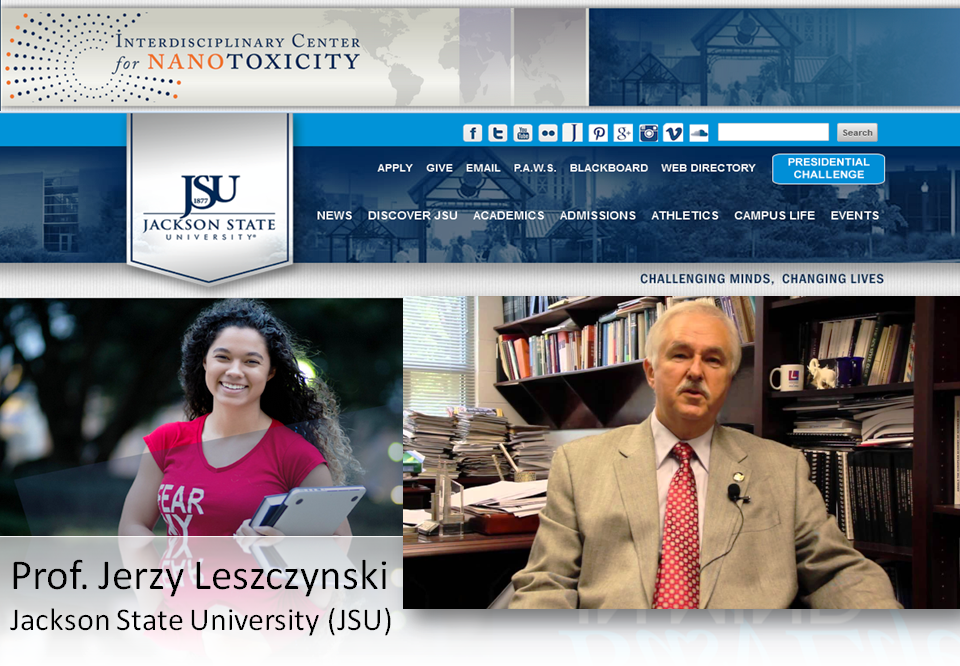
Prof. Jerzy Leszczynski, (USA Presidential Distinguished Fellow)
Director CREST NSF Interdisciplinary Center for Nanotoxicity (ICN),
Dept. of Chem. and Biochem., Jackson State University (JSU), USA.
Honor Scientific Committee
Prof. Juan M. Ruso, Department of Applied Physics,
Faculty of Physics, University of Santiago de Compostela (USC), Spain.
Prof. Natalia D.S. Cordeiro, Department of Chemistry and Biochemistry,
Faculty of Sciences, University of Porto, Porto, Portugal.
Prof. Juan M. Gutierrez-Zorrilla, Dir. Dept. of Inorganic Chemistry,
Faculty of Science and Technology, UPV/EHU, Campus Biscay, Basque Country, Spain.
Prof. Jose Luis Vilas, Dir. Dept. of Physical Chemistry,
Faculty of Science and Technology, UPV/EHU, Campus Biscay, Basque Country, Spain.
Prof. Luis Lezama, Department of Inorganic Chemistry,
Faculty of Science and Technology, UPV/EHU, Campus Biscay, Basque Country, Spain.
Scientific Committee
Prof. Alejandro Speck-Planche. Department of Chemistry (Institute of Pharmacy),
I.M. Sechenov First Moscow State Medical University, Moscow, Russian Federation.
Dr. Natalia Sizochenko, Department of Computer Science,
Dartmouth College, Hanover, NH, USA.
Dr. Supratik Kar, Interdisciplinary Center for Nanotoxicity,
Department of Chemistry, Physics and Atmospheric Sciences,
Jackson State University, Jackson, MS 39217, United States.
Dr. Gerardo M. Casañola-Martin, Dept. of Coatings and Polymeric Materials,
North Dakota State University (NDSU), Fargo, USA.
Dr. Michel Gonzalez-Durruthy, Research Assoc., Dept. of Chemistry
UPORTO, FCUP & ULISBOA, FCUL, Porto & Lisbon, Portugal.
Publication Advisory Chairman
Prof. González-Díaz H., IKERBASQUE Professor, Email: mol2net.chair@gmail.com
(1) Department of Organic Chemistry II, University of the Basque Country UPV/EHU , 48940, Leioa, Biscay, Spain.
(2) IKERBASQUE, Basque Foundation for Science , 48011, Bilbao, Biscay, Spain.
Congress Chair
Prof. Dr. Bakhtiyor Rasulev, Department of Coatings and Polymeric Material, North Dakota State University (NDSU), Fargo, USA.
07. CHEMBIOMOL-05: Chem. Biol. & Med. Chem. Workshop, Bilbao-Lisboa, Portugal-Rostock, Germany, Galveston, Texas, USA, 2019
Experimental Sciences Topics: CHEMBIOMOL series focus on experimental research on the frontiers of Biomolecular and Biomedical Sciences including: Organic Chemistry, Organic Synthesis, Medicinal Chemistry, Chemical Biology, Molecular Pharmacology, Toxicology, Biotechnology, Biomedical Engineering, Systems Biology, Self-Oganized Biosystems, etc. This includes spectroscopic structural characterization (NMR, X-Ray, IR, MS, etc.), Organic synthesis, Biological Assays, Proteomics, Protein Structure, Biophysics, Genomics, Toxicity tests, etc.
Computational Sciences Topics: In addition, the workshop also deals with the application of new Information and Communication Technologies (ICTs) in the previous experimental areas. This includes, Chemoinformatics, Bioinformatics, Data Analysis, Statistics, Artificial Intelligence, Deep Learning, Programming, Databases, Complex Network Analysis of Biosystems, Complexity in Biosystems, Multiscale Systems, Chemical Computation, Theoretical Biology, etc.
Bioethics & Regulatory Topics: Last, not the least, the workshop deals with all the Legal, Regulatory, and Bioethics issues emerging from use of new experimental and ICTs in the previous areas such as Drug Patenting, Drug re-purposing patents, Proteome and Genome patentability, Synthetic Biology, Modified Organisms, Biomedical Personal Image Processing, Personal Data Protection, Personalized Medicine, Software and Models Copyrights, etc.

EJIBCE 2019 Mission & Objectives
Given the current economic situation in Europe, and particularly in Portugal, it is increasingly harder to obtain funding and to have an optimistic approach to science and collaborations. Besides, the recent austerity measures put in place by the Portuguese government led many researchers to join groups and institutes abroad, and eventually lose touch with the Portuguese scientific community and developments. After obtaining a doctoral degree or finishing a postdoctoral appointment, many Portuguese scientists abroad look back to their country looking for an opportunity to continue their careers and contribute to the development of Portuguese science. Others wish to remain abroad, but at the same time reach out to the Portuguese community and cultivate stronger ties to its researchers. However, what groups are there on Computational Structural Biology? What do they actually focus on? Are they open to collaborations? This meeting was created in order to answer these and other similar questions. Its main goal is to provide a simple no-frills environment where Portuguese researchers in Computational Structural Biology, active both in Portugal and abroad, can meet and get to know each other’s research and ambitions. Ultimately, we hope that in doing so, we will be able to stimulate new collaborations and broaden the horizons of the Portuguese community of Computational Structural Biologists.
(5) Follow the link in the email or login to upload paper (doc and pdf format).
(6) Login to post comments, questions, or answers in a section or in one of the MOL2NET workshops.
Honor Chairpersons
 Prof. Jia Zhou, Department of Pharmacology and Toxicology, University of Texas Medical Branch, Galveston, TX, USA.
Prof. Jia Zhou, Department of Pharmacology and Toxicology, University of Texas Medical Branch, Galveston, TX, USA.
(EIC Current Topics in Medicinal Chemistry)
Scientific Committee
Co-Host Academic Pursuit Chairpersons

ERASMUS+ UROSTOCK-UPVEHU Organic Chemistry Academic Agreement coordinator.

(Coordinator Ph.D. Synth. & Ind. Chemistry)

Prof. Nuria Sotomayor, Dept. Org. & Inorg. Chem., University of Basque Country (UPV/EHU), Basque Country, Spain.
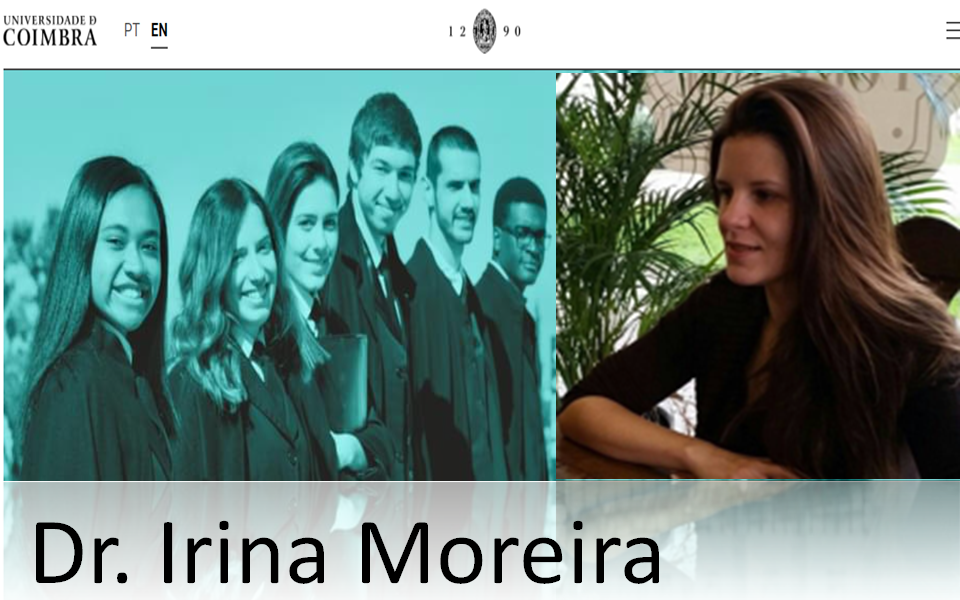
CHEMBIOMOL-EIJBCE Scientific Committee Members
Prof. Matthew M. Montemore, Dept. Chem. & Biomol. Eng., Tulane University, New Orleans, Louisiana, USA.
Dr. Yasset Perez-Riverol, European Bioinformatics Institute (EMBL-EBI), Cambridge, United Kingdom.
Prof. Françoise Dumas, CNRS, Directrice de Recherche, Université Paris-Sud, Paris, France .
Prof. Yagamare Fall, Dept. of Organic Chemistry, University of Vigo (UVIGO), Vigo, Spain.
Prof. Generosa Gómez, Dept. of Organic Chemistry, University of Vigo (UVIGO), Vigo, Spain.
Prof. Javier Meana, Department of Pharmacology, Faculty of Medicine, UPV/EHU, Basque Country, Spain.
Prof. María Isabel Loza, CiMUS and Department of Pharmacology, USC, Santiago de Compostela, Spain.
Prof. Sonia Arrasate, Dept. Org. & Inorg. Chem., University of Basque Country (UPV/EHU), Basque Country, Spain.
Dr. Miguel Machuqueiro, University of Lisboa Campo Grande, Lisboa, Portugal
Dr. Paulo A. Da Costa Lemos, University of Lisboa Campo Grande, Lisboa, Portugal
Dr. Diogo Vila Viçosa, University of Lisboa Campo Grande, Lisboa, Portugal
Dr. Bruno Victor, University of Lisboa Campo Grande, Lisboa, Portugal
Dr. Pedro Magalhães, University of Lisboa Campo Grande, Lisboa, Portugal
ERASMUS+ UROSTOCK-UPVEHU Organic Chemistry Academic Agreement coordinator.
(1) Department of Organic Chemistry II and Basque Center for Biophysics (CSIC-UPV/EHU),
(2) IKERBASQUE, Basque Foundation for Science , 48011, Bilbao, Basque Country, Spain.
ICTs & Regulatory Affairs Chairperson
Dr. Aliuska Duardo-Sanchez (Law.Lic., Ph.D. TICs & Legal Sciences)
PANELFIT European Commission Project Manager. Research Group: Chair in Law and The Human Genome,
Dept. of Public Law, University of Basque Country (UPV/EHU), Campus Biscay, Leioa 48940, , Basque Country, Spain.
Congress Chair
Dr. Irina Moreira, Center for Neuroscience and Cell Biology (CNC), Universidade de Coimbra, Coimbra, Portugal
08. MODEC-04: Nat. Prod. & Agro-Indust. Proc. in Amazon, UEA, Puyo, Ecuador, 2019
MODEC, 4rd Edition
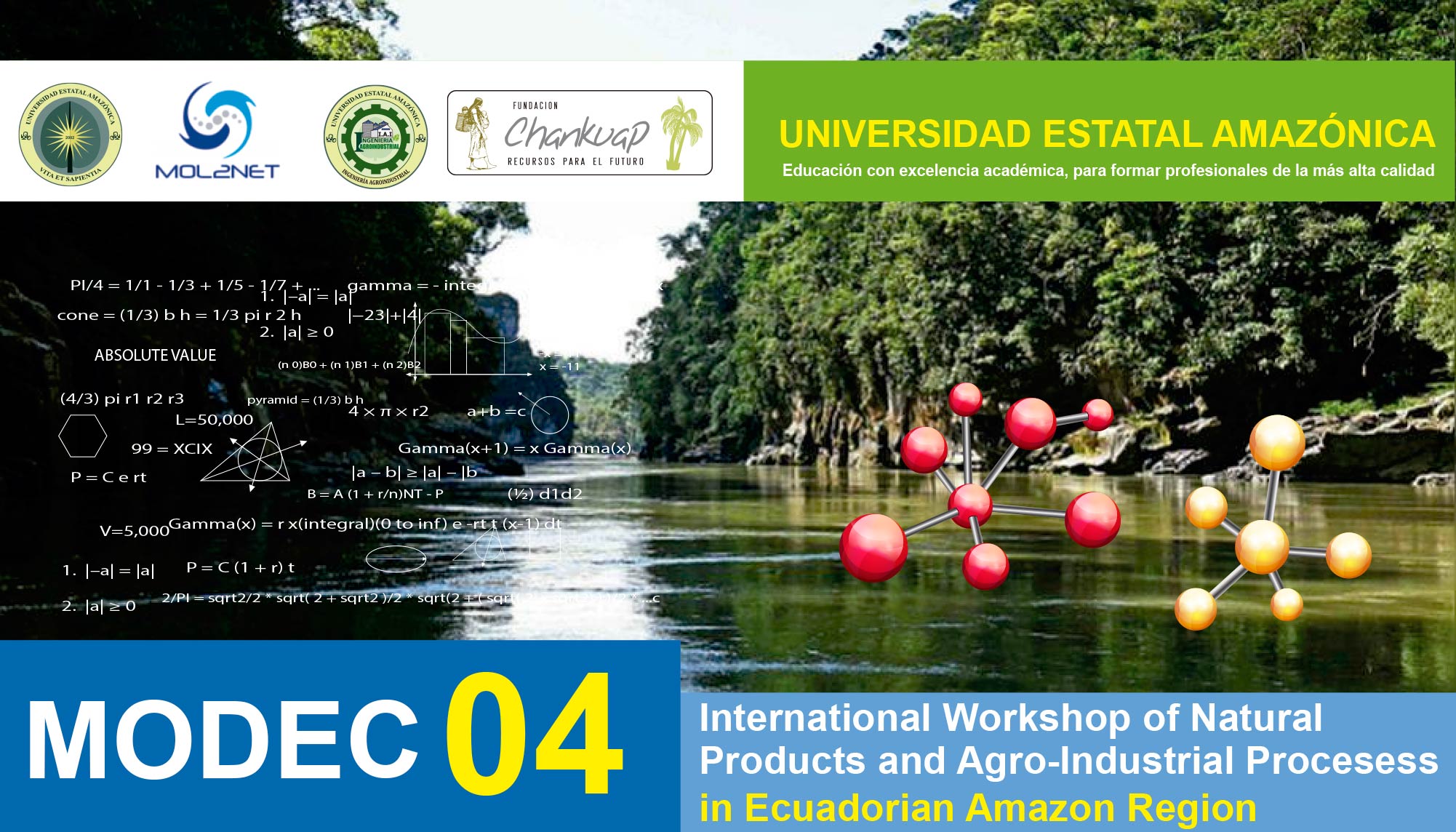

MODEC2018, International Workshop on the Natural Products and Agro-Industrial Processes in Ecuadorian Amazon region
Welcome to the MODEC2019 workshop. This is Amazon State University's (UEA) first workshop, devoted to the promotion and application of the Multidisciplinary Sciences to the development of natural products and agro-industrial processes in Ecuadorian Amazon regions. This workshop runs both online and on location at the university. The online portion of the workshop is powered by the SciForum platform of MDPI, hosted by the MOL2NET International Conference Series on Interdisciplinary Sciences.
Additionally, the physical component of the workshop is also scheduled to run through the Department of Earth Sciences (Facultad de Ciencias de la Tierra) at Universidad Estatal Amazónica (UEA), Puyo, Ecuador. Please, contact the workshop chairmen for further details. Paper submission is already open and the publication of papers for conference purposes in SciForum platform is free of cost.
Publications are expected to be short papers consisting of 1-3 pages. Be aware that the submission is a two step process. First you must register and submit a tentative title, authors list and abstract. Next, you need to submit your full publication upon acceptance of the abstract by the committee. Full publications will be published online, free of charge, with doi number as soon as possible after acceptance. If you are planning to submit a publication, please use the following template, [MODEC 2019 Template.doc]. Click on the following link to register and/or submit your communication Sumit to MODEC here.
All submitted papers should fall under one of the following categories:
- Computational chemistry, Cheminformatics, and Bioinformatics
- Mathematical modeling
- Organic and Functional Foods
- BioTrade: Natural Products of the Amazon
- Production systems with agro-business and forestry purposes or biomass for energy purposes
- Environmental impacts
- Agro-industrial development processes
- Abstracts submission until 2019-Oct-01, Envio de los abstract hasta el 01 de octubre de 2019.
- Abstract acceptance until 2019-Oct-03.
- Communications submission until 2019-Nov-01.
- Communications acceptance until 2019-Nov-15.
- Communications publication until 2019-Nov-30.
NOTE ON PUBLICATION MODEL: Before to submit your work be aware that the editorial publication model of this workshop is similar to a PREPRINTservice. It means that works presented here have to be considered only as preliminary communications and not as final post-print versions of journal papers. In this sense, even when all the works published are revised by at least one member of the committee and/or external reviewer this level of revision checks only apparent scientific soundness and general scientific interest. In a second level, collective post-publication review, the works published may receive comments (published in the form of posts) from all the participants registered in the conference. The authors are prompted to use all these opinions to write the full versions of their works and submit them to publication in a peer-reviewed scientific journals according to SciForum copyright rules. In any case, the authors are the only one responsible of the veracity of the contents, checking similarity to other works, citing properly previous works, etc.
Chairperson
Prof. Amaury Pérez Martínez , Universidad Estatal Amazónica, Ecuador
Email: amperez@uea.edu.ec
Congress Chair
Prof. Dr. Amaury Pérez, Universidad Estatal Amazónica (UEA), Puyo, Ecuador
09. TECHLAWSCI-03: PANELFIT & NKL H2020 Tech. Law. & Sci. Challenges, Bilbao, Spain, Halden, Norway, Baltimore, USA, 2021
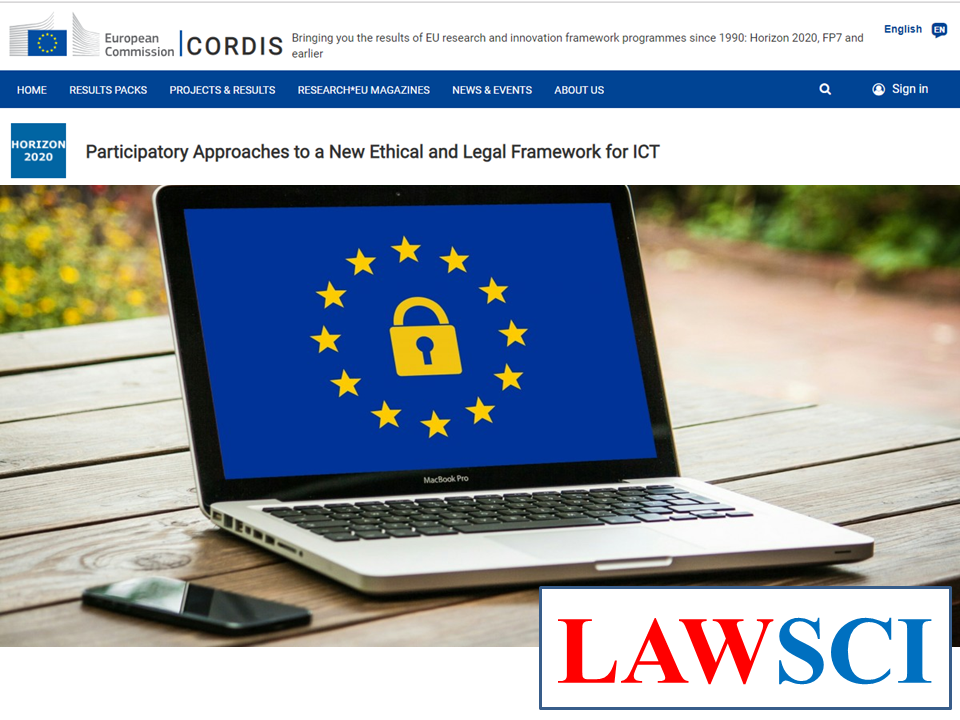
[LAWSCI-01] [LAWSCI-02] [PANELFIT HOMEPAGE] [PANELFIT EU] [PANELFIT RG] [TWITTER]
Dear colleagues worldwide,
Welcome to the workshop TECHLAWSCI-05: PANELFIT & NKL H2020 Tech. Law. & Sci. Challenges, Bilbao, Spain, Halden, Norway, Baltimore, USA, 2021. This workshop is associated to the European Commission Project PANELFIT H2020. In this sense, the workshop series will help to attract the attention of the pubic worldwide over the topics of the project. The project is concerned about changes in the regulation of ICT research and innovation are opening up a new scenario. It is expected that stakeholders, policy makers, and end users adapt to them as soon as possible. This, however, might be hard, especially for SMEs. PANELFIT is firmly committed to facilitating this adaptation process by producing a set of editable, open access Guidelines, validated by two data protection agencies. Once produced, they will serve as operational standards able to reduce the ethical and legal issues posed by ICT technologies while promoting innovation and market growth, enabling high-quality job creation and ensuring an adequate level of privacy and security/cybersecurity.
Furthermore, we will produce a complementary set of six outcomes to 1) suggest possible concrete improvements to the current regulatory and governance framework, both at the EU and the national level, 2) create mutual learning and support tools and to promote networking among stakeholders and policy makers and 3) increase the quantity and quality of the information available to policy makers, professionals, researchers, journalists and the public.
All these outcomes will be produced by a co-creation process involving policy makers, stakeholders, and end-users. They will all participate in the creation of the main outcomes of the project through a range of engagement activities that includes workshops, public consultations, encounters, surveys, etc. This will be combined with a strong communication and dissemination strategy that includes numerous activities, such as webinars, MOOC courses, public debates, a constant use of a web site and social networks and the creation of a Platform for Mutual Learning, which is meant to become the reference forum for the discussion of the issues at stake even after the end of the project. The participation in PANELFIT of the European Data Journalism Network, with an aggregated web audience of almost 70 million monthly visits will help us reach this aim.
In this sense, TECHLAWSci workshop series promotes multidisciplinary collaborations and debate in the frontiers of Law, Technology, Life, and Social Sciences. The interaction between bio-science and ICTs has forged great developments in many fields. However, the appreciation of these discoveries is sadly, all too often, accompanied by a lack of understanding of the legal implications. This conference series aims to provide a reference to the various legal avenues that are available for the protection of scientific advances, but also the legal instruments to protect society from unwanted effects. It constitutes a study of some of the legal implications of bioscience and ICT advances, weighing their impact on society and the law's role in shaping that effect.
The presentations will be focused on legal trends in different fields covering, but not limited to: patentability in plants and human genomics, clinical procedures’ standards, patients’ personal data protection, informed consent, regulatory issues in drug discovery, biomedical research legislation, toxicology, medico-legal problems such as healthcare malpractice, medical insurance or ethics in medical practice, software protection in chemo-informatics, bioinformatics, medical informatics, and social sciences, taxes in the biotechnology industry and causality/liability in environmental pollution, criminology, etc. The conference will run on-line and free, saving traveling and participation costs (subscriptions, open publication, participation in forum, certificates, etc., are free of cost).
Publication Model and Authors Responsibility:
Before to submit your work be aware that the editorial process is the same than for a PREPRINT service. Therefore, all works receive doi number and are indexed in databases (GoogleScholar, Publons, etc.). However, the works published here are preliminary communications and not post-print journal papers. In this sense, committee and/or external reviewers check only scope and apparent scientific soundness. The works may receive also comments from registered participants (public post-publication review). The authors are encouraged to submit their works to a peer-reviewed scientific journals of MDPI or other editorials during or after finalization of the conference, as per SciForum copyright rules.
In any case, it is the responsibility of the authors, to ensure the veracity of the contents, checking similarity to other works, and carry out a proper citation of previous works. The committee is not responsible of this previous aspects in this publishing modality. In this sense, we strongly recommend the authors to use online text-similarity checking services to avoid any form of plagiarism or copyright violation. Some workshops in this conference series use specialized services to checked for possible text similarity. For instance, some users use institutional accounts for URKUND web server. Please, be aware that the authors may be requested to modify (re-write their texts) the communication in the case that high similarity is detected and reported to the committee. In these cases, the manuscript could temporarily withdrawn until the authors re-submit the proper version. The authors are also allowed to submit short reviews, comments, letters, or discussions of papers already published if they guarantee sufficient difference to previous public contents.
TECHLAWSci Steering Committee
|
|
|
Prof. Dr. Iñigo de Miguel Beriain IKERBASQUE Professor, Research Group: Chair in Law and The Human Genome, Department of Public Law, University of Basque Country (UPV/EHU), Faculty of Law, Campus Biscay, Leioa 48940, Spain. Lecturer at The National Distance Education University (UNED), Biscay, Spain. E-mail: inigo.demiguelb@ehu.es
LAWSci-PANELFIT Honor Committee
Prof. Dr. Frank Pasquale. Professor of Law, University of Maryland Francis King Carey School of Law, Baltimore, MD, USA.
Prof. Dr. Antonio López Díaz
Prof. Dra. Mª Pilar Nicolás Jiménez Prof. Dra. Mª Begoña Villaverde Gomez Prof. Dr. Marcos Almeida Prof. Dr. Juan A. Lecaros Prof. Dr. Emilio José Armaza Armaza Prof. Dr. Miren Josune Pérez Estrada |
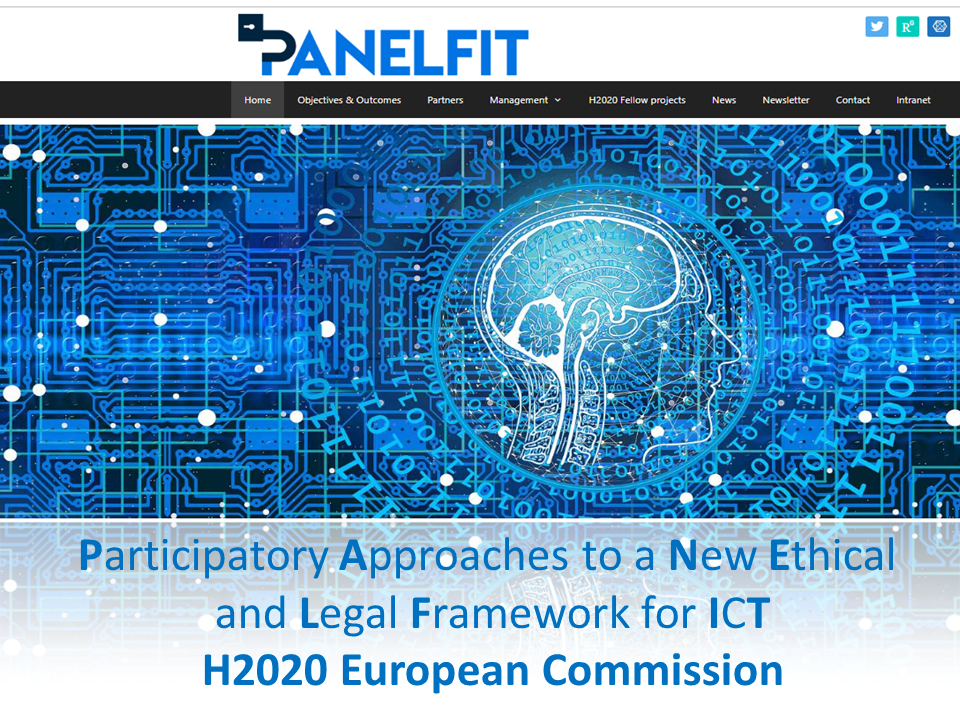
Show all published submissions (8) Hide published submissions (8)
Submissions
List of Papers (8) Toggle list
10. UDLABIOTECH-01: I International Biotechnology Congress, UDLA, Quito, Ecuador, 2019
I INTERNATIONAL BIOTECHNOLOGY CONGRESS,
UDLA, QUITO – ECUADOR
1rst Edition
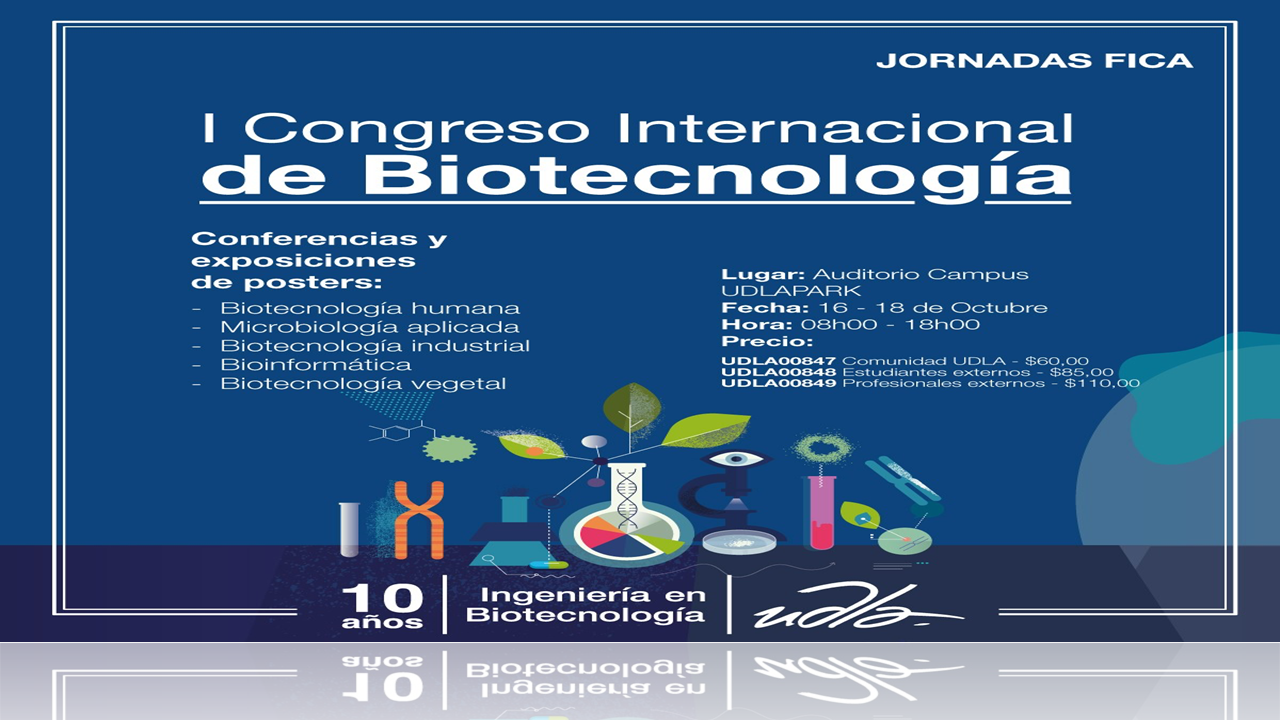
[MOL2NET FACEBOOK (>10K followers)] [Welcome Videos]
[官话] [हिन्दी] [Euskera] [Castellano] [Português] [Français]
Welcome to UDLABIOTECH-01: I International Biotechnology Congress of Universidad de Las Américas (UDLA), Quito, Ecuador. The congress is organized by the UDLA Biotechnology Engineering Program and will be held in the Udla Park campus in Quito (Ecuador) from October 16 to 18, 2019 as part of the annual event “Jornadas de Ingeniería 2019” carried out by the Faculty of Engineering and Applied Sciences (FICA). This congress seeks to offer to our students, professors and the national and international scientific community, a space for updating and strengthening knowledge on different researches and projects linked to the areas of Human Biotechnology, Plant Biotechnology, Industrial Biotechnology, Bioinformatics and Applied Microbiology.
Additionally, this congress belongs to the events organized to commemorate the first 10 years of the Biotechnology Engineering Program of UDLA, and with it, celebrate the achievements of everyone who have been and are part of its growth. For further details about the summary submission, please review the information in the congress [UDLABIOTech homepage] or contact the congress chairperson. Summary submission is already open and will finish in August 25th. Summaries are expected to have 650 words as maximum length and could be written in Spanish or English. Remember that first you have to go to the registration link, next you have to pay the corresponding admission fee and finally you have to submit your document using this template [Mol2Net Template File]. Important dates to consider in the congress schedule are the following. Summary submission until 2019-August-25. Communication acceptance list until 2019-September-15.
Steps for Participation
(0) Register, Sign in/Login, to Sciforum platform [MDPI login]
(1) Submit the title and abstract, select a section or workshop (do not upload paper here) [MDPI login]
(2) Wait for Sciforum abstract acceptance email, follow the link, and/or login to upload paper, doc and pdf format
(3) Download template doc to prepare your communication, for general sessions [MOL2NET Template.doc]
(4) Wait for paper acceptance and publication emails (follow link to proofread your paper) (Asap after upload)
(5) Communicate with chairpersons if corrections are necessary, including past editions (All the year)
(6) Log in to post comments, questions, or answers in your or different workshops (End of year)
(7) Contact chairpersons if you need author (publication) or attendance (posting) certificate for conference and/or workshops (All the year).
Committees
Chairperson
Daniela Santander, daniela.santander.gordon@udla.edu.ec
Biotechnology Engineering, Faculty of Engineering and Applied Sciences (FICA)
Universidad de Las Américas (UDLA), Quito, Ecuador.
Organizing Committee
Academic Director
Emilia Vásquez, emilia.vasquez@udla.edu.ec
Biotechnology Engineering, Faculty of Engineering and Applied Sciences (FICA)
Universidad de Las Américas, Ecuador
Biotechnology Laboratory Assistant
Carlos Moyota, carlos.moyota.tello@udla.edu.ec
Biotechnology Engineering, Faculty of Engineering and Applied Sciences (FICA)
Universidad de Las Américas, Ecuador
Erika Bodniza
Former Biotechnology Laboratory Assistant, Biotechnology Engineering
Faculty of Engineering and Applied Sciences (FICA)
Universidad de Las Américas, Ecuador
Scientific Committee
Lecturer
María Isabel Baroja, maria.baroja@udla.edu.ec
Biotechnology Engineering, Faculty of Engineering and Applied Sciences (FICA)
Universidad de Las Américas, Ecuador
Lecturer
Wilson Tapia, wilson.tapia@udla.edu.ec
Biotechnology Engineering, Faculty of Engineering and Applied Sciences (FICA)
Universidad de Las Américas, Ecuador
Senior Lecturer/Researcher
María Isabel Ballesteros, maria.ballesteros@udla.edu.ec
Biotechnology Engineering, Faculty of Engineering and Applied Sciences (FICA)
Universidad de Las Américas, Ecuador
Senior Lecturer/Researcher
Vinicio Armijos, vinicio.armijos@udla.edu.ec
Biotechnology Engineering, Faculty of Engineering and Applied Sciences (FICA)
Universidad de Las Américas, Ecuador
Lecturer
Carlos Bastidas, carlos.bastidas@udla.edu.ec
Biotechnology Engineering, Faculty of Engineering and Applied Sciences (FICA)
Universidad de Las Américas, Ecuador
Foreign Committee
(Under construction)





